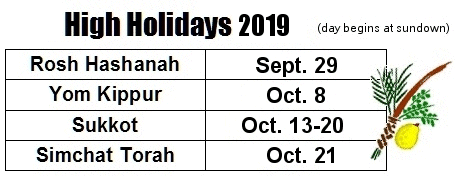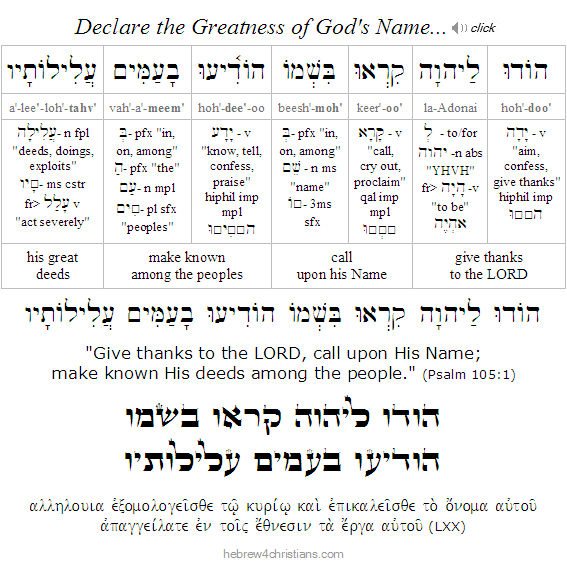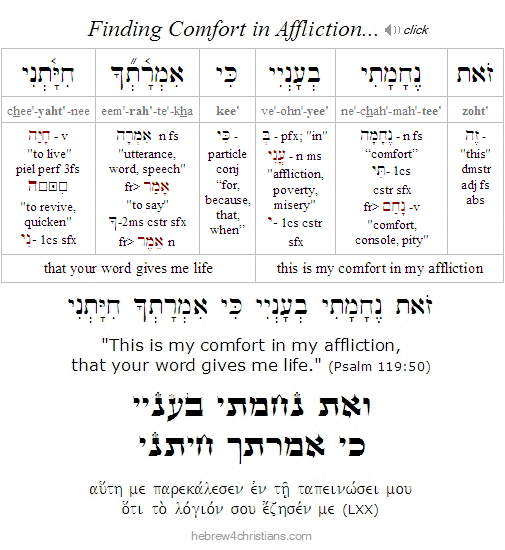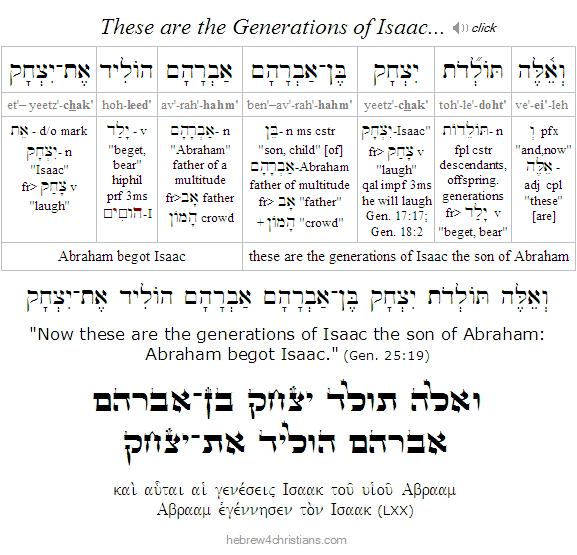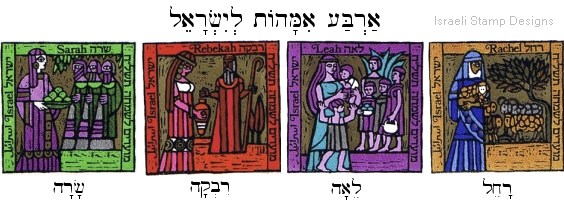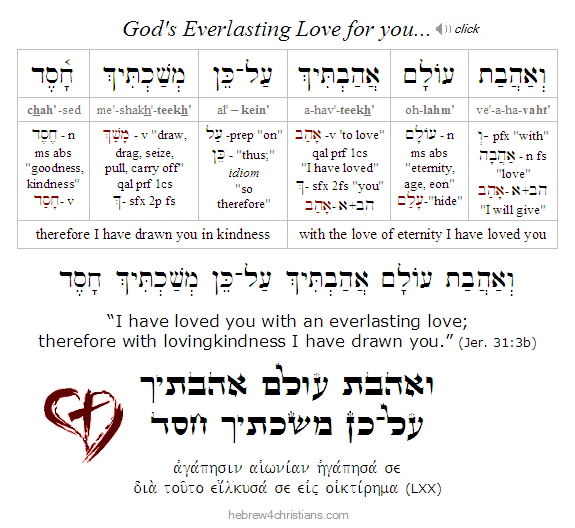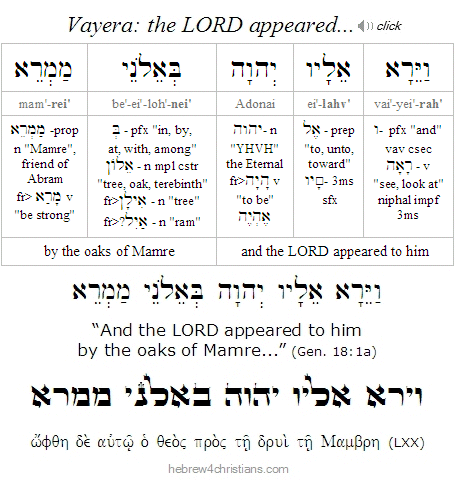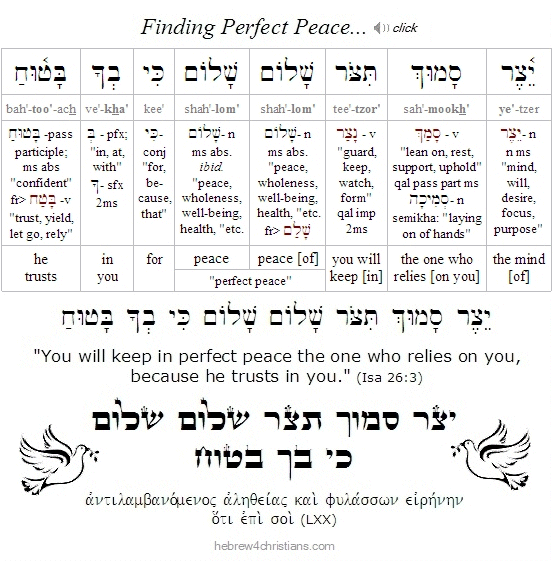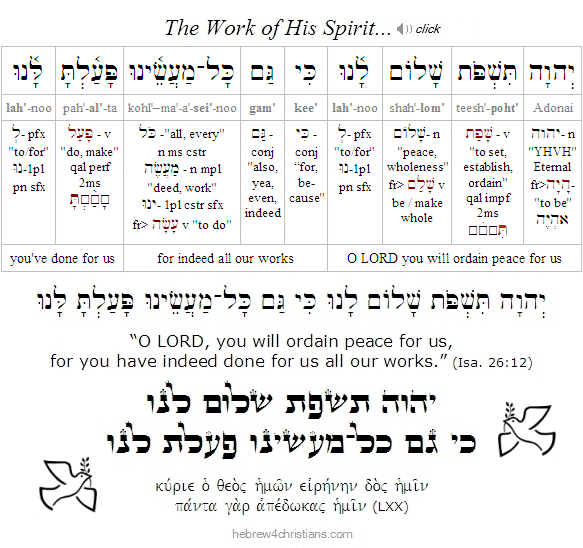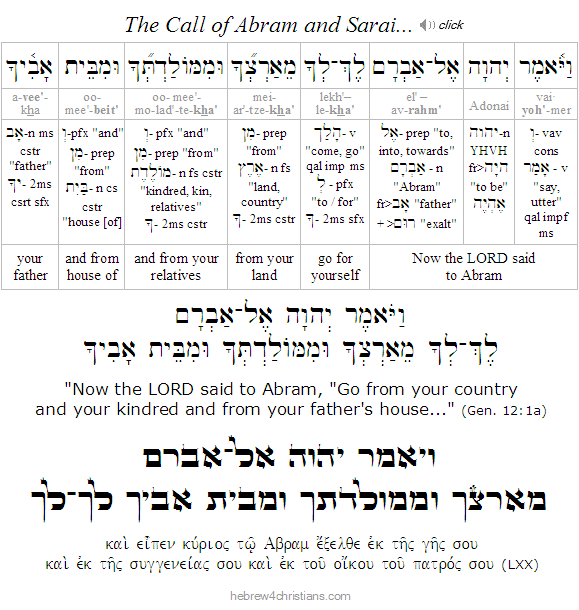|
Jewish Holiday Calendar
For November 2019 site updates, please scroll past this entry....
The Torah divides the calendar into two symmetrical halves: the Spring and the Fall, indicating the two advents of Messiah. The Biblical year officially begins during the month of the Passover from Egypt (called Rosh Chodashim, see Exod. 12:2), and the spring holidays of Passover, Unleavened Bread, and Firstfruits both recall our deliverance from Egypt and also our greater deliverance given by means of the death, burial, and resurrection of the Messiah, the great Passover Lamb of God. Yeshua was crucified on erev Pesach, buried during Unleavened Bread, and was resurrected on Yom Habikkurim (Firstfruits). The holiday of Shavuot (i.e., "Pentecost") both commemorates the revelation of the Torah at Sinai as well as the revelation of the Ruach HaKodesh (Holy Spirit) at Zion, in fulfillment of the promise given by our Lord....
The intermediate months of summer end with the advent of the sixth month of the calendar, called the month of Elul, which recalls the time Moses interceded on behalf of Israel after the sin of the Golden Calf. To commemorate this time of our history, we likewise focus on teshuvah (repentance) in anticipation of Rosh Hashanah and especially in anticipation of Yom Kippur, the great "Day of Atonement." In Jewish tradition the 30 days of Elul are combined with the first ten days of the seventh month (called the "Days of Awe") to set apart "Forty Days of Teshuvah" leading up to the Day of Forgiveness for Israel. Immediately following Yom Kippur, the mood changes as we begin preparing for a joyous week-long celebration called Sukkot (i.e., "Tabernacles") that concludes with the holiday of Simchat Torah.
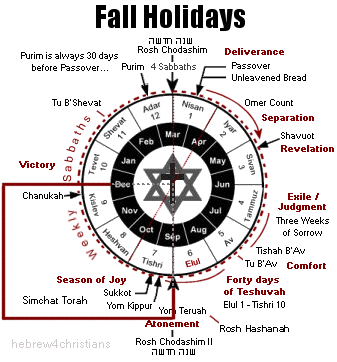 |
The Fall Holidays:

The fall festivals prophetically indicate the Day of the LORD, the second coming of Yeshua, the great national turning of the Jewish people, and the establishment of the reign of the Messiah upon the earth during the Millennial Kingdom in the world to come.
Note that in accordance with tradition, holiday dates begin at sundown. Moreover, some holidays may be postponed one day if they happen to fall on the weekly Sabbath:
1. Month of Tishri (Sun. Sept. 29th [eve] - Mon. Oct. 28th [day]) - Fall holidays begin
2. Month of Cheshvan (Mon. Oct. 29th [eve] - Wed. Nov. 27th [day])
- Four Sabbaths: Noach, Lekh-Lekha, Vayera, Chayei Sarah
- Yom Ha'Aliyah - Honoring Israel's immigrants (Mon. Nov. 5th; Cheshvan 7)
- Sigd - 50th day after Yom Kippur; Ethiopian Jewish holiday (Tues. Nov. 26th)
3. Month of Kislev (Wed. Nov. 27th [eve] - Fri. Dec. 27th [day])
- Four Sabbaths: Toldot, Vayetzei, Vayishlach, Vayeshev
- Winter Solstice: Fri. Dec. 21st Kislev 23)
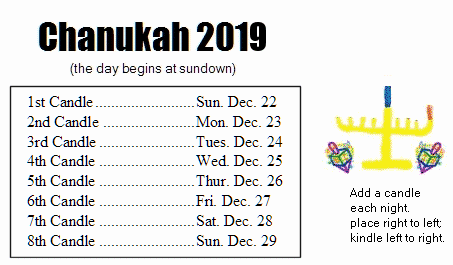
- Dates for Chanukah 2019 (5780):
- 1st Chanukah candle - Sun. Dec. 22nd [i.e., Kislev 25]
- 2nd Chanukah candle - Mon. Dec. 23rd [i.e., Kislev 26]
- 3rd Chanukah candle: Teus. Dec. 24th [i.e., Kislev 27]
- 4th Chanukah candle: Wed. Dec. 25th [i.e., Kislev 28]
Christmas: Wed. Dec. 25th (Kislev 28, 5780)
- 5th Chanukah candle: Thurs. Dec. 26th [i.e., Kislev 29]
4. Month of Tevet (Fri., Dec. 27th [eve] - Sun. Jan. 26th [day])
- Four Sabbaths: Miketz, Vayigash, Vayechi, Shemot
- Dates for Chanukah (continued):
- 6th Chanukah candle: Fri. Dec. 27th [i.e., Kislev 30] (Chodesh Chanukah)
- 7th Chanukah candle: Sat. Dec. 28th [i.e., Tevet 1]
- 8th Chanukah candle: Sun. Dec. 29th [Tevet 2] Zot Chanukah
- Asarah B'Tevet - Tues. Jan. 7th (dawn), 2020; fast over the seige of Jerusalem
- Secular New Year: Wed. Jan. 1st, 2020 (Tevet 4, 5780)
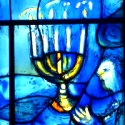 |
Note: For more about the dates of these holidays see the Calendar pages....
November 2019 Updates
Redeeming the Time...

11.29.19 (Kislev 1, 5780) Our life in this world will end far sooner than we expect, and then what will become of us? I am not here thinking of the end of "the" world, but rather the end of your world - when you will die and face the light of eternity. Today, this moment, you are on the way, going someplace; your "latter days" are already come... If you are not prepared today, how will you be better prepared tomorrow? Today is the day of salvation, the hour that matters most (Psalm 95:7; Heb. 3:13). Learn to die to the world now, to let go of what presently holds you captive, so that you are free to meet that which forever shall come. Don't put off genuine teshuvah: turn while there is still time (Eph. 5:15-16). And may God give us mercy to say from the heart: "For me to live is Messiah, and to die is gain" (Phil. 1:21).
As philosopher Blaise Pascal (1623-1662) once wisely observed: "Let each of us examine his thoughts; he will find them wholly concerned with the past or the future. We almost never think of the present, and if we do think of it, it is only to see what light it throws on our plans for the future. The present is never our end. The past and the present are our means, the future alone our end. Thus we never actually live, but hope to live, and since we are always planning how to be happy, it is inevitable that we should never be so" (Pensees). Amen, may God help us "remember the future" and live in the light of his great promises! Chodesh Tov and Shabbat Shalom, chaverim.
לִמְנוֹת יָמֵינוּ כֵּן הוֹדַע
וְנָבִא לְבַב חָכְמָה
leem·noht · ya·mei·noo · kein · ho·da'
ve·na·vee · le·vav · chokh·mah

"Teach us to number our days
that we may apply our hearts unto wisdom."
(Psalm 90:12)
Hebrew Study Card

A Willful Ignorance...
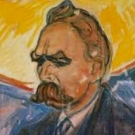
11.29.19 (Kislev 1, 5780) Dietrich Bonhoeffer (1906-1945), a German pastor who was surrounded by the atrocious evil of Nazi Germany and who was murdered at their hands, regarded stupidity as more dangerous than outright evil, since stupidity is a type of irrationality, a chosen ignorance of what is real and true. Against such willed ignorance we are often defenseless, since any reasoning that appeals to transcendental moral truth finds no traction, carries no weight, and has no effect. The devil, then, seeks first of all to stupefy people, that is, to drug them or flatter and persuade them to think that there is no need to engage in serious thinking or to humbly question their assumptions... As William James observed: "A great many people think they are thinking when they are merely rearranging their prejudices." The antidote to unthinkingly accepting the biases and inculcated prejudices of the world is to be awakened to the reality of God: "The fear of the LORD is the beginning of knowledge; but fools despise wisdom and correction" (Prov. 1:7).
יִרְאַת יְהוָה רֵאשִׁית דָּעַת
חָכְמָה וּמוּסָר אֱוִילִים בָּזוּ
yeer·at · Adonai · rei·sheet · dah·at
chokh·mah · oo·moo·sar · e·vee·leem · ba·zoo

"The fear of the LORD is the beginning of knowledge;
but fools despise wisdom and correction."
(Prov. 1:7)

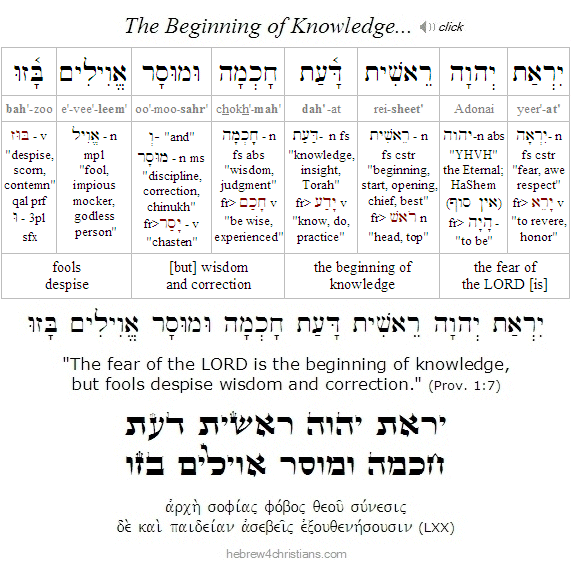
For Bonhoeffer, stupidity is a moral fault, not an intellectual deficiency; it is the result of a willful ignorance and cynical laziness. He wrote: "If we want to know how to get the better of stupidity, we must seek to understand its nature... that it is in essence not an intellectual defect but a human one. There are human beings who are of remarkably agile intellect yet stupid, and others who are intellectually quite dull yet anything but stupid. We discover this to our surprise in particular situations. The impression one gains is not so much that stupidity is a congenital defect but that, under certain circumstances, people are made stupid or that they allow this to happen to them. We note further that people who have isolated themselves from others or who live in solitude manifest this defect less frequently than individuals or groups of people inclined or condemned to sociability. And so it would seem that stupidity is perhaps less a psychological than a sociological problem" (Bonhoeffer: Letters from Prison).
Soren Kierkegaard likewise regarded stupidity to be a category of the "groupthink" of the crowd. He wrote: "There is a view of life which holds that where the crowd is, the truth is also, that it is a need in truth itself, that it must have the crowd on its side. There is another view of life; which holds that wherever the crowd is, there is untruth, so that, for a moment to carry the matter out to its farthest conclusion, even if every individual possessed the truth in private, yet if they came together into a crowd (so that "the crowd" received any decisive, voting, noisy, audible importance), untruth would at once be let in... Indeed, the crowd is untruth. There is therefore no one who has more contempt for what it is to be a human being than those who make it their profession to lead the crowd. ... For to win a crowd is not so great a trick; one only needs some talent, a certain dose of untruth and a little acquaintance with the human passions" (Upbuilding Discourses).
Those who deny that truth exists (or those who deny that something may be known about reality) are themselves making a truth claim, namely the claim that there is no such thing as objective truth (or that knowledge of the world is not possible). This self-inflicted incoherence is a sign of irrationalism, of course, the abandonment of reason, which perhaps is the ulterior motive for such manner of thinking, after all. The person who denies truth does so to escape the demands of truth – to flee from personal responsibility before moral and spiritual Reality. It is a form of "wish-fulfillment" to deny that people are not responsible for what they believe and how they live their lives. Hence our culture's obsessive "busyness," its craving for ongoing diversion, entertainment, fantasy, escapism, and so on. Our generation finds evil in "boredom" and finds nothing of lasting interest because it has forsaken the big questions of life and the pursuit of truth. Popular culture encourages apathy, indifference, and seeks to enslave people to thrills and titillations of the moment... The ancient pagan world at least esteemed honor and believed in the pursuit of virtue and truth, but today's post-Christian world is nihilistic, anarchist, and therefore marks a return to barbarism.
The ground of all right thinking about reality is "wonder," or the sense that life itself is something mysteriously beautiful, amazing, and therefore inherently sacred. This is sometimes called yirat Adonai (יִרְאַת יְהוָה), "the fear of the LORD" that leads to wisdom. Right thinking therefore begins with consciousness of the good (הַכָּרַת טוֹבָה), that is, with an awareness that life itself a gift, a mystery, and a hallowed question... We seek our origin, our essence, and our purpose -- and in our seeking we seek the LORD. We long for deliverance from what keeps us from healing, from love, from real hope. And as we seek, the wonder of the LORD God never ends. As Yeshua said, "Ask, and it will be given to you; seek, and you will find; knock, and it will be opened to you" (Matt. 7:7).
Seeing with Wonder...
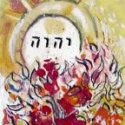
11.29.19 (Kislev 1, 5780) The commandment not to take the Name of the LORD "in vain" (Exod. 20:7) implies that we must affirm the sanctity, meaning, significance, and worth of life itself. We must never live as though God does not exist, or, to state this positively, we must "set the LORD" always before us (Psalm 16:8). It is therefore forbidden to ignore the miracle of existence, to scoff at the value of life, or to debase ourselves by refusing to receive the truth. We are to take every thought "captive" to the reality of the Messiah (2 Cor. 10:5). Everything belongs to God, and every moment we have is beholden to Him...
שִׁוִּיתִי יְהוָה לְנֶגְדִּי תָמִיד
כִּי מִימִינִי בַּל־אֶמּוֹט
shee·vee·tee · Adonai · le·neg·dee · ta·meed
kee · mee·mee·nee · bal - e·moht

"I have set the LORD always before me;
because he is at my right hand, I shall not be shaken."
(Psalm 16:8)
Hebrew Study Card

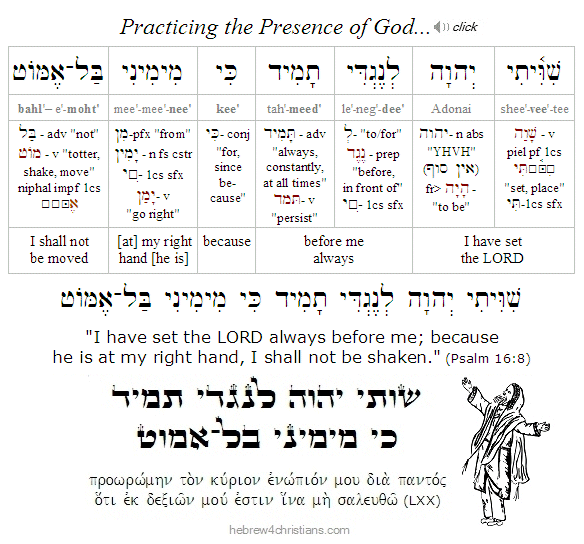
Finding deliverance from profane thinking requires concentrated focus, or "kavanah" (כַּוָנָּה). As it is written: "We destroy arguments and every lofty opinion raised against the knowledge of God, and take every thought captive to obey Messiah" (2 Cor. 5:10). We are instructed to "bring down reasonings" (λογισμοὺς καθαιροῦντες) and every high thing that is lifted up against the knowledge of God (κατὰ τῆς γνώσεως τοῦ θεου) and to bring every thought "as a captive" to the obedience (ὑπακοὴν, from ὑπό: by, under, + ἀκούω: hear, obey) of Messiah. We can do this negatively by fighting against evil thoughts and censoring the inner evil of our hearts, or we can do this positively by being "captivated" by the words and love of Yeshua, and often we have to do both! This is the deeper meaning of "profanity" - to deny reality, to live in willful ignorance, and to miss the wonder of God's presence. If we sanctify God in our hearts, we will be far less likely to use God's name in vain, of course.
God invites you to come to Him for relationship... Since the LORD is a Person, He wants to know you as a person. He is not interested in formulaic prayers, religious rituals, or your membership at a particular religious organization. God wants to know your inmost thoughts and heart. Drawing near to God is God's way of drawing near to you... In other words, as you draw near to God, He will draw near and touch you (James 4:8).
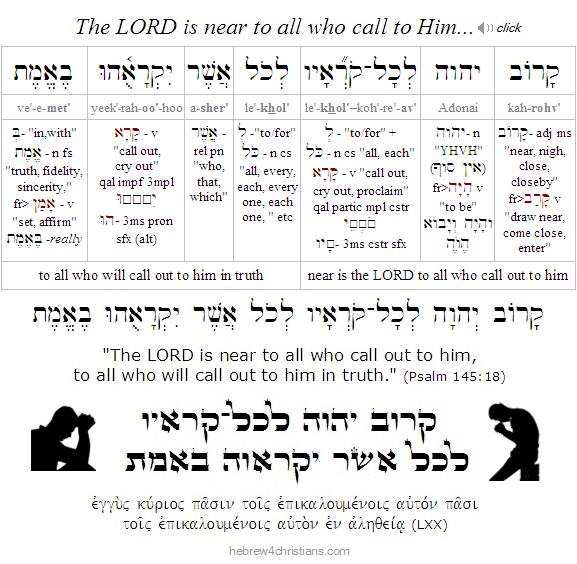 |
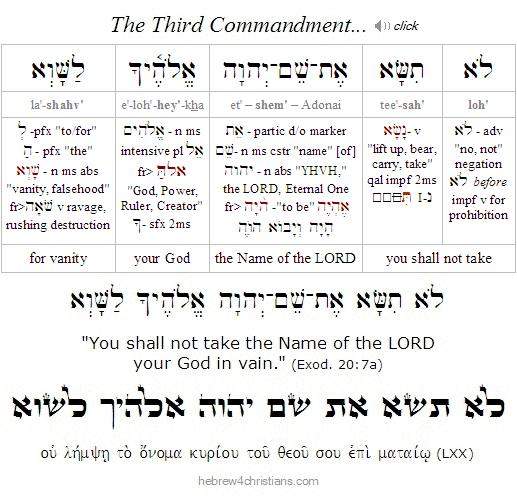 |
Gratitude and Seeing...
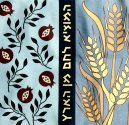
[ Happy Thanksgiving, friends. It is always good to thank God for the precious gift of life... ]
11.28.19 (Cheshvan 30, 5780) Gratitude is essential to the life of faith... We read in the Torah: "And you shall bless the LORD your God for the good" (Deut. 8:10). Whenever we derive benefit or enjoyment from something we are to bless (i.e., thank) God for his goodness. Indeed the Hebrew term for gratitude is hakarat tovah (הַכָּרַת טוֹבָה), a phrase that means "recognizing the good." The heart looks through the eye, and therefore how we see is ultimately a spiritual decision: "If your eye is "single" (i.e., ἁπλοῦς, sincere, focused)," Yeshua said, "your whole body will be filled with light" (Matt. 6:22). When we see rightly, we are awakened to God's Presence in the little things of life, those small miracles and "signs and wonders" that constantly surround us. The good eye of faith sees hundreds of reasons to bless God for the precious gift of life (1 Cor. 10:31).
"Give thanks to the LORD for He is good; his love endures forever" (Psalm 136:1); "give thanks to the LORD always" (Col. 3:17; Eph. 5:20; 1 Thess. 5:18)... Gratitude is foundational to our lives as followers of Yeshua. Indeed there are really only two prayers we ever offer to God, namely "Help, LORD!" and "Thank you, LORD." Meister Eckhart once remarked that if the only prayer you said in your entire life was, "thank you," that would suffice... Genuine prayer ultimately resolves to an expression of thanks. We are to "praise the Bridge that carries us over" into the Presence and Love of God, and that Bridge is Yeshua our Lord.
The "thank offering" mentioned in the Torah (i.e., zevach ha-todah: זֶבַח הַתּוֹדָד) is also mentioned in the New Testament. In the Book of Hebrews were are instructed to "continually offer up a sacrifice of thanks (זֶבַח תּוֹדָה) to God, that is, the fruit of lips that acknowledge his Name" (Heb. 13:15). It is interesting to note that the Greek verb used to "offer up" (i.e., ἀναφέρω) is used to translate the Hebrew verb "to draw near" (karov) in Leviticus. In other words, the "offering up of thanks" for the sacrifice of Yeshua functions as "korban" and draws us near to God. Thanking God for personal deliverance constitutes "right sacrifices" (זִבְחֵי־צֶדֶק) as we draw near to God in the hope of His love (Psalm 4:5; Heb. 7:19).
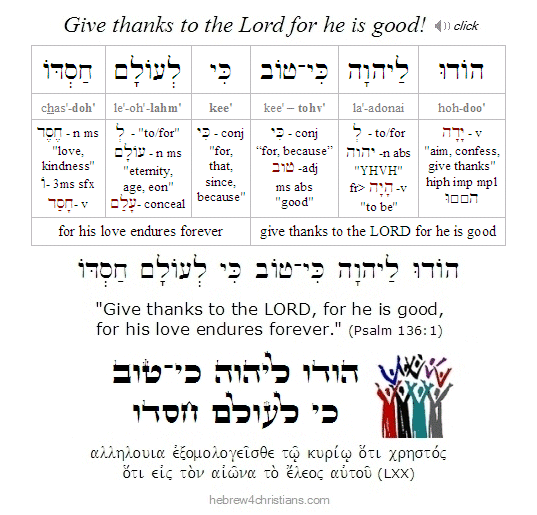 |
I thank the Lord for the opportunity to have served you here at Hebrew for Christians over the years, and I am also grateful for your kindness and encouragement, friends. Chag Hodayah Sameach! (חג ההודיה שמח) - Happy Thanksgiving, chaverim! - John
Love Believes all things...

11.27.19 (Cheshvan 29, 5780) "I would have fainted unless I believed to see the goodness of the LORD..." (Psalm 27:13). Faith is therefore self-authenticating: as you trust in the good, the good will be revealed: believe to see! As Yeshua said, "According to your faith be it done unto you" (Matt. 9:29). And if it is faith that makes you whole, then its lack makes you sick... As you doubt, so you will lose sight of what is real, true, and abiding. Being cynical is cowardly: "There are two ways to be fooled. One is to believe what isn't true; the other is to refuse to believe what is true" (Kierkegaard). The cynic refuses the possibility of truth because he is afraid of being fooled, and for this fear he willingly closes his eyes to the good. "Believe that life is worth living, and your belief will help create the fact" (James). When we trust God's promises, we affirm an unseen good even if the present hour is shrouded in darkness. Faith sees beyond "the seen" to the unseen (2 Cor. 4:18). The "seen" is not ultimately real, and consequently faith is exiled from the vanity of the present hour. Therefore affirm your faith, dear friend; do not allow your heart to waver. Refuse the darkness of fear by choosing to believe in the reality of God's love for your soul, despite the mess you've made of your life. Affirm that God's love is more real, more substantive, and more valuable than anything disclosed in the false world (עולם השקר) that is fading away. Amen.
Wounds of a Friend...

11.27.19 (Cheshvan 29, 5780) Do you need a reason to be truly thankful, friend? Well how about remembering the incalculable blessing you have been given because Yeshua died on the cross in exchange for your life, saving you from the penalty of the law and healing you from the hopeless condition of "spiritual death." Is not this the most amazing and wonderful thing ever done for you? Because of Yeshua you have an everlasting hope; you will never be separated from love; you have a place within the heart of God; you are forever accepted, welcomed, and beloved.... Because of Yeshua, you will never die; you will be resurrected from the dead to experience peace and love and joy forever and ever as a member of God's family... Moreover, because of God's grace you are given strength to face the challenges of this life and to live without fear. You understand this world to be a "corridor" to the world to come where you will enjoy the great consolation of heaven, even experiencing the glory of the direct and personal revelation of God Himself!
Please remember, however, that the cost of your redemption was utterly priceless and beyond all reckoning, namely "the precious life blood of Messiah, like that of a lamb without blemish or spot, who was foreknown before the foundation of the world but was made manifest in the last times for the sake of you" (1 Pet. 1:18-20). יְהִי שֵׁם יְהוָה מְברָךְ As Isaiah foretold of Yeshua: "Surely he has borne our griefs and carried our sorrows; yet we esteemed him stricken, smitten by God, and afflicted. But he was pierced (profaned) for our transgressions; he was crushed for our iniquities; the punishment for our peace was upon him, and in his wounds we are healed" (Isa. 53:4-5). In this famous passage that foretold the suffering of Yeshua, note that the word translated "wound" (i.e., chaburah: חַבּוּרָה, "blow" or "stripe") comes from the same root as the word for "friend" (i.e., chaver: חָבֵר), and therefore we can read "in His friendship we are healed." Yeshua gave up His life for us so that we could become his friends... As he later said regarding his sacrifice: "Greater love has no one than this, that one lay down his life for his friends" (John 15:13). Indeed of Yeshua it may truly be said, Yesh ohev davek me'ach – "there is a friend who sticks (davek) closer than a brother" (Prov. 18:24). Praise God for Yeshua our "Leper Messiah," and the "friend of sinners" (Luke 7:34). O give thanks to the LORD for his great friendship for you and for the great gift of his salvation! Amen.
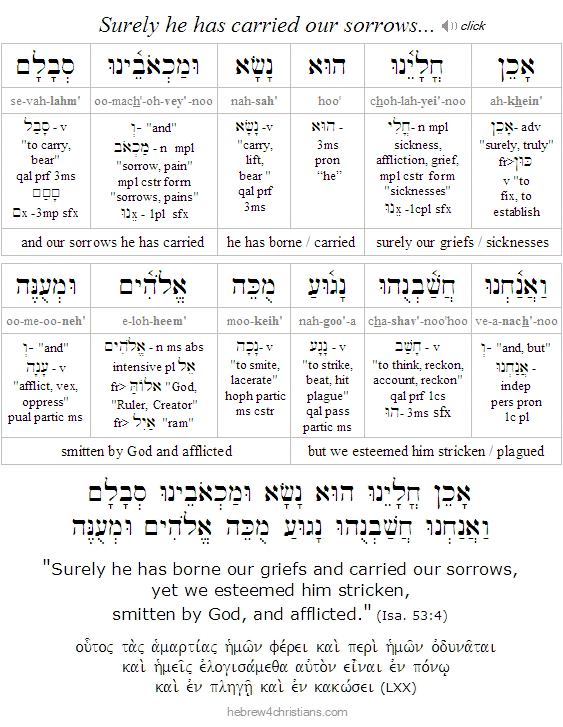 |
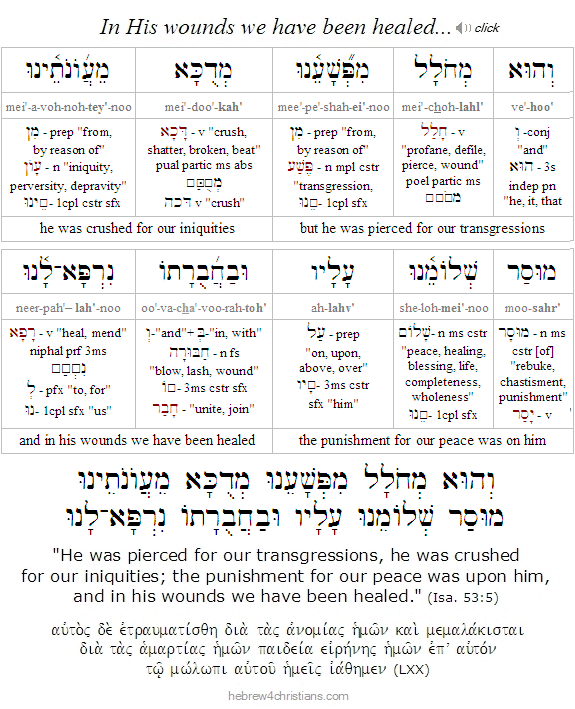 |
The Oath of Blessing...
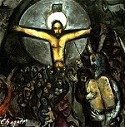
[ The following is related to this week's Torah reading, parashat Toldot... ]
11.27.19 (Cheshvan 29, 5780) In our Torah portion this week (Toldot) we learn that the great oath of blessing that God gave to Abraham was extended (exclusively) to his beloved son Isaac (Gen 26:3-4; Rom. 9:7). Recall that it was only after the Akedah (the sacrifice of Isaac) that the LORD God swore the oath (שְׁבוּעָה) that through Abraham would all the families of the earth be blessed: "By myself I have sworn, declares the LORD, because you have done this and have not withheld your son, your only son (ben yachid), I will surely bless you... and in your offspring shall all the nations of the earth be blessed, because you have obeyed my voice" (Gen. 22:16-18; cp. Gal. 3:9,16). The phrase, "by myself have I sworn" is the most solemn oath God could make and must be regarded as an inviolable vow (Heb. 6:13-18). It is nothing short of astounding to realize that the very existence of Israel and the Jewish people - and therefore the advent of the Messiah himself - derives from the Abraham's willingness to sacrifice his "only begotten son," an act of faith that constituted the revelation of "deeper Torah" later enshrined in the laws of sacrifice given at Sinai. That is why the key idea of the Torah centers on the idea of atoning sacrifice, and in particular, the continual sacrifice of the lamb. Indeed atonement is the central theme of the central book of Torah, i.e., Leviticus, where we are called to draw near to God through sacrificial rites, the foremost of which was the ongoing offering (i.e., korban tamid: קָרְבַּן תָּמִיד) of a defect-free male lamb, together with unleavened bread and wine. The LORD called this "My offering, My bread" (Num. 28:1-8). In other words, the very center of the Torah is the altar that constantly prefigured the Lamb of God who would be offered up to secure our eternal redemption (John 1:29; Heb. 9:11-12). Yeshua is our "lamb offered in the morning and in the evening," and His sacrificial life embodies God's passion for you to receive his love.
"He is the LORD our God; his judgments are in all the earth. He remembers his covenant forever, the word that he commanded, for a thousand generations, the covenant that he made with Abraham, his sworn promise to Isaac, which he confirmed to Jacob as a statute, to Israel as an everlasting covenant." (Psalm 105:7-10)
The "Gospel of Moses" revealed in the Akedah foretells the cross of our Savior. For more on this subject, see "Israel and the Akedah" here.
Broken and Remade...

11.26.19 (Cheshvan 29, 5780) "See to it that no one fails to obtain the grace of God; that no root of bitterness (שׁרֶשׁ פּרֶה) springs up and causes trouble, and by it many become defiled; that no one is immoral or profane like Esau, who sold his birthright for a single meal. For you know that afterward, when he desired to inherit the blessing, he was rejected, for he found no chance to repent, though he sought it (the blessing) with tears" (Heb. 12:15-17; Gen. 27:38). The LORD says, "my people have committed two evils: they have forsaken Me, the fountain of living waters (מְקוֹר מַיִם חַיִּים), and hewed out cisterns for themselves, broken cisterns that can hold no water" (Jer. 2:13). Spiritually speaking, there are two basic sorts of breaking. One is to be broken by the inevitable sin and ruin of this world, and the other is to be made lev-nishbar (לֵב־נִשְׁבָּר), a broken heart, before the LORD. The former breaking comes from the vain attempt to find life in the broken vessels of this world, and "repentance" is expressed as remorse over perceived temporal loss. This sorrow eventually leads the soul to death (2 Cor. 7:10). To be inwardly broken, on the other hand, requires mourning over your life and returning to God for deliverance (Matt. 5:4). In hunger and thirst for God's righteousness the soul finds eternal satisfaction, since God alone provides the vessel of "living water" we need to live (John 4:14; 7:38). We all must drink from God's fountain of life (מְקוֹר חַיִּים), lest we suffer spiritual dehydration and death....
Are you haunted by an inner ache for love, joy, peace, and life? "Blessed are those who hunger and thirst for righteousness, for they shall be satisfied" (Matt. 5:6). Our inner poverty and need is a disguised grace; our desire for healing reveals the Spirit's invitation. Faith begins with the recognition of our need, since only then will we come to Yeshua for the "Bread of Life" (לֶחֶם הַחַיִּים) and the "Living Water" (מַיִם חַיִּים). Everything we need is found in him, though we must reach out in faith: "For without faith (אֱמוּנָה) it is impossible to please him, for whoever would draw near to God must believe that he exists, and that he rewards those who seek him" (Heb. 11:6). God rewards those who seek him; he answers the heart's cry; he responds to all who trust in his love and salvation. Therefore "ask, and it will be given to you; seek, and you will find; knock, and it will be opened to you. For everyone who asks receives, and the one who seeks finds, and to the one who knocks it will be opened" (Matt. 7:7-8). We are not saved by faith in our own faith, but in the Reality and Power of the LORD God who alone can raise the dead to new life....
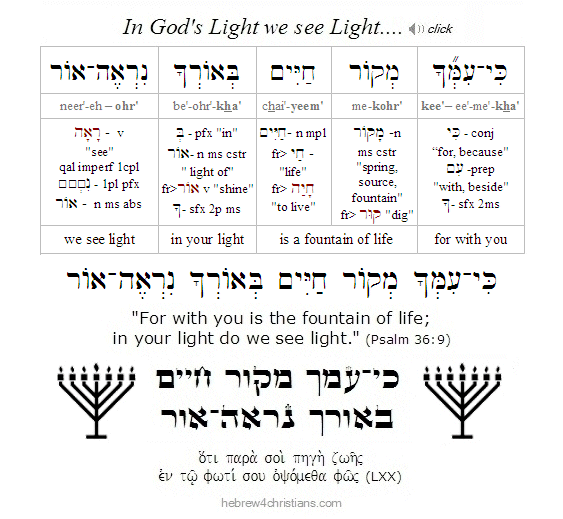 |
Bartering with Vanity...

11.26.19 (Cheshvan 29, 5780) From our Torah portion (i.e., parashat Toldot) we read: "And Esau said to Jacob, 'Let me eat some of that red stew, for I am exhausted!' Therefore his name was called Edom (אֱדוֹם)." The Hebrew text more forcefully reports Esau's words: 'Let me gulp down (הַלְעִיטֵנִי) some of that "red-red stuff" (הָאָדם הָאָדם), picturing how eagerly he bartered away the blessing of heaven for a momentary and fleeting pleasure... The Maharal of Prague said that when Esau called the stew that "red-red stuff," he was acting like an unthinking brute that relates to things without restraint, in the immediacy of the moment, and without regard to their "form," that is, their higher purposes or end...
נִבְחָר שֵׁם מֵעשֶׁר רָב
מִכֶּסֶף וּמִזָּהָב חֵן טוֹב
neev·char · shem · me·oh·sher · rav
mee·ke·sef · oo·mee·za·hav · chen · tov

"A good name is to be chosen rather than great wealth,
and good favor is better than silver or gold."
(Prov. 22:1)

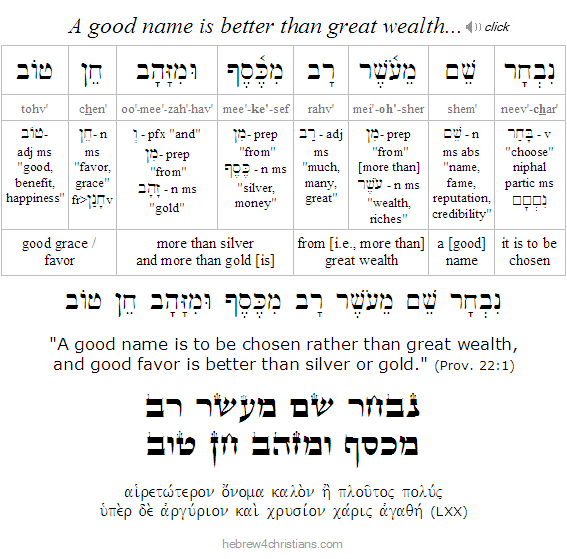
"See to it that no one fails to obtain the grace of God; that no "root of bitterness" springs up and causes trouble, and by it many become defiled; and that no one is sexually immoral or profane (i.e., βέβηλος, worldly, ungodly) like Esau, who sold his birthright for a single meal" (Heb. 12:15-16). Surely this is the deeper meaning of "profanity" - to deny reality, to live in willful ignorance, and to miss the glory of God's presence.
Isaac's Troubled Family...

[ The following is related to this week's Torah reading, parashat Toldot... ]
11.26.19 (Cheshvan 29, 5780) The sages talk about the "voice of Jacob" and the "hands of Esau" (Gen. 27:22). Both sons were counterparts of one another, though each needed the qualities of the other to be complete. Esau needed to learn the ways of Jacob - to love Torah, to respect the call of the family to be God's agents in the world, to value the things of heaven, and so on, whereas Jacob needed to learn the ways of Esau - to be a man of action, to work with his hands, to deal with the rough-and-tumble world at large. After Jacob fled to Charan to escape the clutches of his aggrieved brother, he learned to be a shepherd, a husband, and a father. In this way Jacob also learned the value of the blessing given to Esau, although this too was discovered needlessly late in his life.
It is quite clear that the families of the patriarchs had serious struggles and were often quite "dysfunctional." If we idealize these people, however, we tend to forget their humanity, and they may appear disconnected from us - on a much higher spiritual level. The story of Isaac's troubled family is ultimately one of hope for us all. Isaac was deeply wounded but ultimately found healing, just as his son Jacob later wrestled through his family issues to be renamed "Israel." Take heart, chaverim: God can use us for His kingdom purposes despite whatever wounds and troubles might be in our family backgrounds. The Spirit speaks: "I AM the LORD your healer" (אֲנִי יְהוָה רפְאֶךָ).
Note: For more on this topic see, "Isaac's Troubled Family: Further thoughts on Toldot."
God's Word of Love...

11.26.19 (Cheshvan 29, 5780) In moments of testing, and especially in your failures, heed the voice of God's compassion (מילות רחומות). Use the "good eye" (עַיִן טוֹבָה) to see how the Spirit draws you close in your weakness, gently urging you to return from your self-imposed exile, and welcoming you back to the Divine Presence. Note that the good eye (ayin tovah) is also called the "beautiful eye" (עין יפה), since it sees beauty even in ashes... Do not turn away from God's plea for your comfort; know that God is love (Exod. 34:6; 1 John 4:16); He is light (1 John 1:5), and He is forever with you as your Savior (Isa. 41:10; Matt. 28:20). Using the "beautiful eye" means refusing to think evil about others (including yourself); it "does not impute the bad" - οὐ λογίζεται τὸ κακόν (1 Cor. 13:5) but rejoices in the truth – even if that truth is found only in the hope of a future and seemingly distant good (1 Cor. 13:7; Rom. 8:24). Yeshua told us, "The eye is the lamp of the body. So, if your eye is good (i.e., ἁπλοῦς, sincere, focused, compassionate), then your whole body will be full of light" (Matt. 6:22).
כִּי־טוֹב חַסְדְּךָ מֵחַיִּים
שְׂפָתַי יְשַׁבְּחוּנְךָ
kee · tohv · chas·de·kha · mei·cha·yeem
se·fa·tai · ye·sha·be·choon·kha

"Because your lovingkindness is better than life,
my lips will praise you."
(Psalm 63:3)
Download Study Card

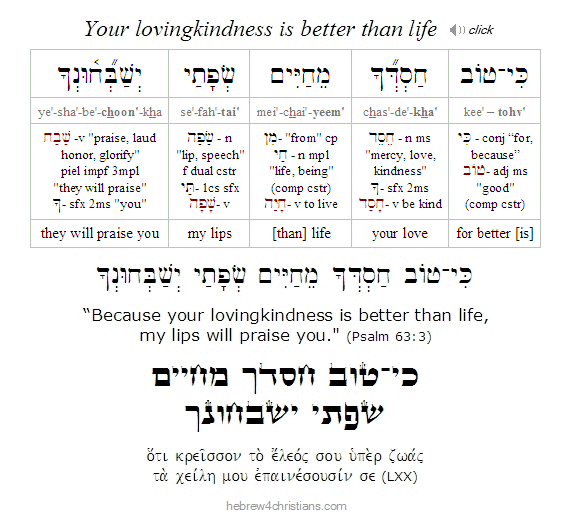
Rebekah's Surrender...

11.26.19 (Cheshvan 29, 5780) When the twins fought within her womb, Rebekah asked, lamah zeh anochi ("Why do I exist?"), and then the LORD gave her the prophecy: ve'rav ya'avod tza'ir – "the older (or "stronger) shall serve the younger" (see Gen. 25:23). God had chosen one of her two children to become the heir of the covenantal promise, and she therefore may have thought it was her purpose or mission in life to help make that happen... However, Rebekah's elaborate scheme to trick her husband by exchanging the twins for the blessing was doomed from the outset, since God needed to open the blind eyes of Isaac to truly bless Jacob as the family heir (Gen. 28:1-4). Rebekah's mistake was that she thought it was her job to intervene, or to "help God" by resorting to human intervention – somewhat like her mother-in-law Sarah earlier had sought to "help God" by giving Hagar as a surrogate wife to Abraham to produce the heir. It is a difficult thing to let go and to trust that the Lord will take care of everything. Lamah zeh anochi – Why do I exist, except to bear witness to God's providential plan and to trust in God's power to work all things together for good?
Such a plaintive question, lamah zeh anochi – "Why do I exist?" When she was young, Rebekah seemed strong, secure, and courageous. For example, after meeting Eliezer she unhesitatingly declared her willingness to leave all that she knew to go to a strange land and to marry an unknown man -- all for the promise of an unseen good. Nevertheless Rebekah was tested. First, she (like Sarah) was barren and for 20 years ached for a child with Isaac. Second, her pregnancy was difficult and the Lord foretold her that though she would have twins, there would be an ongoing conflict between them that would trouble their lives. Third, after bearing the children, Rebekah's turmoil continued: her husband discounted her faith; her sons pathetically competed for the approval of their father; and she was torn to choose to stand with Jacob even if that jeopardized her relationship with both Esau and Isaac. And later, after the scheme to exchange Jacob for Esau was exposed, her worst fear was realized: she indeed lost both of her sons (Esau because of her betrayal, and Jacob after he fled to Mesopotamia). Struggle after struggle: lamah zeh anochi? Why is this happening to me? Why did I deserve such a fate? Why, but to partake of the truth – to suffer for the sake of the deliverance of God's ultimate blessing for the world. Like Rebekah, we have an important part to play, though assuredly we will be tested and experience challenges along the way. Lameh zeh anochi? To learn to trust God for all that happens in life...
The Call of Affliction...
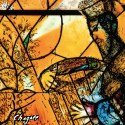
11.25.19 (Cheshvan 27, 5780) It is written in our Scriptures: "The sacrifices of God are a broken spirit; a broken and contrite heart, O God, you will not despise" (Psalm 51:17). We are "in" but not "of" the world, so that means that we share in the common hardships and sorrows of this world. However, the difference is this: We do not suffer alone, for God's love surrounds us with comfort. For those who know Yeshua, suffering does not demand an intellectual answer to "why" we suffer as much as it evokes the heart's cry for God's presence... In the midst of our troubles the Spirit groans within us: "My soul clings to you and your right hand upholds me" (Psalm 63:8). We come to God in our brokenness, holding fast to his promise of comfort, and God upholds us with his hand. "This is my comfort in my affliction, that your word gives me life" (Psalm 119:50).
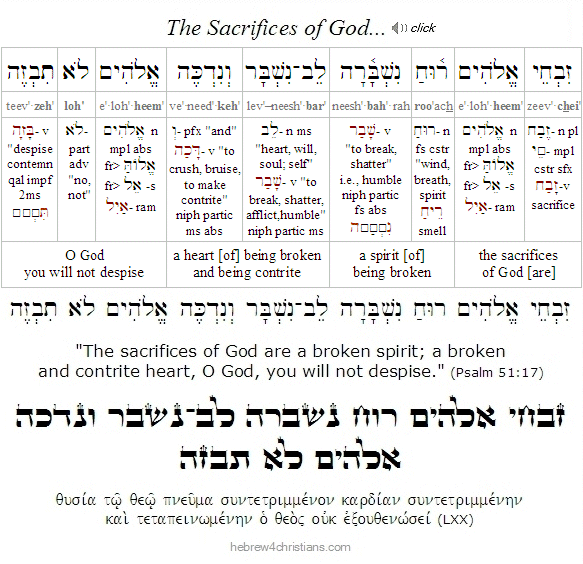 |
God is not indifferent to our plight, chaverim, and indeed, that is the basic message of the cross... Indeed how can we believe in God's love apart from the cross? How can we know the truth of his heart? God knows those who are broken and the contrite (Isa. 57:15). The LORD is full of comfort; he loves the afflicted, he has grace for the humble, he forgives the fallen, and he revives the heart. Compassion is his nature - as the cross of Yeshua reveals - and therefore we can come to him in our need, in our affliction, as those who are "poor in spirit" (Matt. 5:3). God loves us even when we feel forsaken, all alone in our private struggles. The Spirit impels us to cry out for deliverance and experience consolation in our distress. This is a common experience in God's people: in our sorrows we seek him, and then we rediscover his mercies and great compassion. Great is his faithfulness (Lam. 3:23).
The Akedah of Jacob...

[ The following is related to this week's Torah reading, parashat Toldot... ]
11.25.19 (Cheshvan 27, 5780) How did Jacob feel about his part in the deception of his father Isaac? He undoubtedly was aware of the unusual circumstances of his birth, and in particular of the prophecy given to his mother that he, and not his older brother Esau, would be the heir of Isaac and of the Jewish people (Gen. 25:23; Gen. 25:28). The Torah describes the character of Jacob as a wholesome person, a man of integrity (אִישׁ תָּם) who dwelt in tents (Gen. 25:27), and yet he was forced to choose whether he would obey his mother's will to deceive his father or to adhere to his personal integrity. This explains why at first Jacob "bartered" for the blessing of the firstborn (בְּכוֹר) when he and Esau were younger (Gen. 25:31), hoping to resolve the matter peaceably, but after it became clear that Isaac intended to bless Esau as the family's heir, Rebekah took matters into her own hands (Gen. 27:1-ff). This dilemma was Jacob's "Akedah," if you will, the sacrifice of himself for the will of God. Three times does the Torah indicate the pain of Jacob during this ordeal: "And he went (וַיֵּלֶךְ) and he took (וַיִּקַּח) and he brought (וַיָּבֵא) to his mother..." (Gen. 27:14). The sages here note that the repeated use of וי, meaning "woe," suggested the turmoil Jacob felt as he prepared to deceive his father. On the other hand, Rebekah's deception of her husband was intended to show Isaac that he was gullible and thereby easily deceived by Esau's hypocrisy. It was an object lesson, if you will, rather than a outright case of "stealing." After all, Esau was soon to arrive - venison in hand - and the charade would be exposed for all to see... No, Rebekah's plan was to "open the eyes" of her myopic husband, revealing to him that he had been guilty of sacrificing the righteous son Jacob for the sake of deceptive Esau.
For more discussion on this subject see:
Our Shepherd in Darkness....

11.25.19 (Cheshvan 27, 5780) "Yea, though I walk through the valley of the shadow of death, I will fear no evil..." (Psalm 23:4). O God of Light, Light of the world, surely You know my need for light as I look to You, especially when darkness tries to extinguish my hope. Despite my inability to see you now, help me to know that you are with me; let "thy rod and thy staff comfort me" and lead me closer to you. Lord, when I am afraid, quicken the faith you have put within my heart. Be Thou my Shepherd in my darkness, O Lord my God...
גַּם כִּי־אֵלֵךְ בְּגֵיא צַלְמָוֶת
לא־אִירָא רָע כִּי־אַתָּה עִמָּדִי
שִׁבְטְךָ וּמִשְׁעַנְתֶּךָ הֵמָּה יְנַחֲמֻנִי
gam · kee-e·lekh · be·gei · tzal·ma·vet
loh · ee·ra · ra · kee · a·tah · ee·ma·dee
sheev·te·kha · oo·meesh·an·te·kha · he·mah · ye·na·cha·moo·nee

"Even though I walk through the valley of the shadow of death,
I will fear no evil, for You are with me;
Your rod and your staff, they comfort me"
(Psalm 23:4)

"Be not afraid." Over and over again in the Scriptures we hear the LORD saying to those who trust in Him, al-tirah, "be not afraid." Nachman of Breslov is reported to have once said, "All the earth is a very narrow bridge (כָּל־הָעוֹלָם כֻּלּוֹ גֶּשֶׁר צַר מְאד), and the point of life is never to be afraid." Likewise we trust Yeshua to be the Bridge to the Father, the narrow way of passage that leads to everlasting life. He calls out to us in the storms of this world, "Take heart. It is I; be not afraid" (Matt. 14:27). The heart of faith senses the LORD's presence, even in the darkness, and hears the Spirit saying, "I am with you..."
I do not see the road ahead of me, I cannot know for certain where it will end. Nor do I really know myself, and the fact that I think I am following your will does not mean I am actually doing so. But I believe the desire to please you does in fact please you, and I hope I have that desire in all that I am doing. I hope that I will never do anything apart from that desire. And I know that if I do this you will lead me by the right road, though I may know nothing about it. Therefore, I will trust you always, though I may seem to be lost and in the shadow of death. I will not fear, for your are ever with me, and you will never leave me to face my perils alone. -- Merton: Seeds of Contemplation
In times of testing, how we desperately do we need a sense of companionship and intimacy with the Lord! When you feel abandoned, ashamed, or alone; or when you are afraid and unsure of yourself; or when pain distances you from others, nudging you to isolation or loneliness, then may God's Spirit brood over you, whispering your name, reminding you that you are never alone, and that God Himself is forever for you, despite yourself. Therefore "fear no evil," because God is with you in the midst of your present darkness. As it is written: "Surely goodness and love shall pursue you all the days of your life, and you shall dwell in the house of the LORD forever" (Psalm 23:6). Come alive, O heart of faith!
Thanksgiving and Sukkot...

11.25.19 (Cheshvan 27, 5780) The American holiday of Thanksgiving (חַג הַהוֹדָיָה) undoubtedly has its roots in the Jewish tradition of giving thanks to God, and some historians believe that the early "pilgrims" actually derived the idea for the holiday from the Biblical festival of Sukkot (i.e., "the feast of Tabernacles"). Before fleeing to the "New World," the pilgrims lived for a decade among the Sephardic Jews in Holland, since Holland was considered a safe haven from religious persecution at the time. Since the pilgrims were devout Calvinists and Puritans, their religious idealism led them to regard themselves as "new Israel," and it is likely that they learned that Sukkot commemorated the people of Israel's deliverance from their religious persecution in ancient Egypt at that time. After they emigrated to the "Promised Land" of America, it is not surprising that these pilgrims may have chosen the festival of Sukkot as the paradigm for their own celebration. As the Torah commands: "Celebrate the feast so that your generations may know that I made the people of Israel dwell in booths when I brought them out of the land of Egypt: I am the LORD your God" (Lev. 23:39-43). The highly devout pilgrims regarded their perilous journey to the new world as a type of "Exodus event" and therefore sought the appropriate Biblical holiday to commemorate their safe arrival in a land full of new promise...
It is interesting to note that the Hebrew word for "turkey" is tarnegol hodu (תַּרְנְגוֹל הוֹדו), literally, "Indian chicken," which is often shortened to hodu (הוֹדוּ). It is a happy coincidence that we customarily eat turkey on Thanksgiving, and this reminds us of the "thanks" connection: "Give thanks (hodu) to the Lord for he is good" (הוֹדוּ לַיהוָה כִּי־טוֹב), for His steadfast love endures forever."
הוֹדוּ לַיהוָה כִּי־טוֹב
כִּי לְעוֹלָם חַסְדּוֹ
ho·doo · la·Adonai · kee · tohv
kee · le·o·lahm · chas·doh

"Give thanks to the LORD for He is good;
for His steadfast love endures forever."
(Psalm 136:1)
Hebrew Study Card


Note: For more on this subject, see "Thanksgiving and Sukkot."
Parashat Toldot - תולדת
 |
11.24.19 (Cheshvan 26, 5780) Last week's Torah portion (i.e., Chayei Sarah) told how Abraham's servant Eliezer (אֱלִיעֶזֶר) sought a bride for Isaac from among Abraham's relatives living in Mesopotamia. In response to his prayer to the LORD, Eliezer was shown that Abraham's nephew's daughter Rebekah (i.e., Rivkah bat-Betu'el: רִבְקָה בַּת־בְּתוּאֵל) was chosen to be one of the four matriarchs of Israel (i.e., arba imahot l'Yisrael: אַרְבַּע אִמָּהוֹת לְיִשְׂרָאֵל).
This week's reading (i.e., parashat Toldot) continues the story by revealing that Isaac and Rebekah had been married for twenty years but were still without an heir to carry on the family line. Finally their prayers were answered and Rebekah conceived, though not without complications. When she inquired of the LORD about her travail, God told her that she was carrying twins that would be heads of two rival nations, but the younger child would in fact become the promised heir of the chosen people. When the day arrived for Rebekah to give birth, the first child came out "red and covered with hair," so they called his name "Esau" (i.e., esav: עֵשָׂו, "hairy"); then his brother came out with his hand grasping Esau's heel (i.e., akev: עָקֵב), so they named him "Jacob" (i.e., ya'akov: יַעֲקב) from the Hebrew verb (i.e., akav: עָקַב), meaning "to take by the heel; to displace; to supplant."
The Torah then says that Esau became a crafty hunter (i.e., ish yodea tzayid: אִישׁ יֹדֵעַ צַיִד), "a man of the field" (אִישׁ שָׂדֶה) while Jacob was "a wholesome man" (i.e., ish tam: אִישׁ תָּם) who "dwelt in tents" (יֹשֵׁב אֹהָלִים). Isaac favored Esau (וַיֶּאֱהַב יִצְחָק אֶת־עֵשָׂו); because he had a taste for game (כִּי־צַיִד בְּפִיו), but Rebekah favored Jacob (וְרִבְקָה אֹהֶבֶת אֶת־יַעֲקֹב) because she believed the promise of the LORD...
The portion then gives us a look at the spiritual life of the two boys. According to tradition, on the day of the funeral of their grandfather Abraham, Jacob was cooking lentil soup for Isaac, the traditional mourner's meal. Esau rushed in from a hunting expedition, exhausted and hungry. He then begged Jacob to give him some of "that red stuff" (i.e, ha'dom hazeh), but Jacob answered that he would give him some only if he would sell him his birthright. Esau agreed to the terms and discounted his birthright as being worth only a "bowl of beans" (on account of this incident, Esau was given the nickname of "Red" (i.e., אֱדוֹם "Edom"). In this manner the Torah describes how Esau "despised the birthright" (Gen. 25:34).
 |
Years later, when Isaac was old and blind, Jacob (with his mother Rebekah's help) tricked Isaac into conferring the blessing of the firstborn (בִּרְכַּת בְּכוֹר) upon him, thereby making Jacob the heir of the family, and not Esau. When the ruse was discovered, however, Esau sought to kill his brother, and Jacob was forced to flee his home, never to see his mother again...
The Month of Dreams...

11.24.19 (Cheshvan 26, 5780) Wednesday, November 27th (after sundown) marks "Rosh Chodesh Kislev" (which occurs for two days this year). On the Biblical calendar the month of Kislev (כִּסְלֵו) is the ninth of the year (counting from Nisan), and it is also one of the "darkest," with the days progressively getting shorter and the nights getting progressively longer. Kislev is perhaps best known for the eight day holiday of Chanukah (חג החנוכה) which begins on the 25th of the month (Sun. Dec. 22nd) and runs through the third day of the following month (of Tevet). Since there is always a new moon during the season of Chanukah, it is no wonder that this holiday represents an appropriate time to kindle the lights of faith, and especially to recall the advent of Yeshua the Messiah, the Light of the World (אוֹר הָעוֹלָם).
יְהִי רָצוֹן מִלְּפָנֵיךָ יהוה אֱלהֵינוּ
וֵאלהֵי אֲבוֹתֵינוּ שֶׁתְּחַדֵּשׁ עָלֵינוּ חדֶשׁ טוֹב
בַּאֲדנֵינוּ יֵשׁוּעַ הַמָּשִׁיחַ אָמֵן
ye·hee · ra·tzohn · meel·fa·ney·kha · Adonai · E·lo·hey·noo
vei·lo·hey · a·vo·tey·noo · she·te·cha·deish · a·ley·noo · choh·desh tohv
ba'a·do·ney·noo · Ye·shoo·a' · ha·ma·shee·ach · a·mein

"May it be Your will, LORD our God and God of our fathers,
that you renew for us a good month
in our Lord Yeshua the Messiah. Amen."

Download Blessing Card
Chodesh Kislev is sometimes called the "month of dreams" because the weekly Torah portions for this month contain more dreams than any other in the Scriptures. No less than nine dreams (of the ten in the Torah) appear in the four portions of Vayetzei, Vayishlach, Vayeshev, and Miketz - all of which are usually read during the month of Kislev. In the Torah, the primary figure connected with dreams is Jacob's son Joseph, who was nicknamed by his brothers as "that dreamer" and who was later named "Decipherer of Secrets" (Tzofnat Paneach) by Pharaoh (Gen. 41:45). Joseph was able to authentically mediate the spiritual and the physical realms through the Spirit of God within him (Gen. 41:38). Prophetically Joseph represents Yeshua the "disguised Egyptian" who likewise was rejected and hated by his brothers but who later became their savior (for more see "Mashiach ben Yosef").
For more on this subject, see "Chodesh Kislev."
The Vale of Tears...
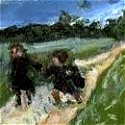
11.22.19 (Cheshvan 24, 5780) The walk of faith refers to trusting in the Presence and love of God for your soul, even though you will suffer and experience various hardships in your life. Yes, we receive comfort from heaven and consolation through the Spirit of God, and yes we are given heavenly wisdom to know the truth that sets us free in Yeshua, however in this life we "see through a glass darkly," which literally means "in a riddle" (ἐν αἰνίγματι). A riddle is an analogy given through some resemblance to the truth, though quite often the correspondences are puzzling and obscure. Hence, "seeing through a glass darkly" means perceiving obscurely or imperfectly, looking "through" something else instead of directly apprehending reality. We see only a reflection of reality, and our knowledge in this life is indirect and imperfect. This is contrasted with the "face to face" (פָּנִים אֶל־פָּנִים) vision and clarity given in the world to come, when our knowledge will be clear and distinct, and the love of God will be fully manifest to us and no longer hidden. Realizing this should make us humble whenever we consider our faith. "Now we know in part, but then shall we know in whole" (1 Cor. 13:12). We often do not have the "answers" for suffering, though "seeing through a glass darkly" means we have the means to trust God despite the present hour.
We must train ourselves to see beyond the realm of appearances, especially regarding matters of the heart. The "outer self" is perishing yet the "inner self" is renewed day by day. Moreover "our momentary affliction is preparing for us an eternal weight of glory beyond all comparison, as we look not to the things that are seen but to the things that are unseen. For the things that are seen are transient, but the things that are unseen are eternal. For we know that if our earthly house, the "tent" we live in, is dismantled, we have a building from God, a house not built by human hands, that is eternal in the heavens" (2 Cor. 4:17-5:1). Amen. Like father Abraham we sojourn in a "land of promise" as "strangers" to this world, looking for a "city that has foundations, whose designer and builder is God" (Heb. 11:9-10). "For here we have no lasting city, but we seek the city that is to come" (Heb. 13:14).
Yeshua is the greatest and most worthy tzaddik of all, yet he terribly suffered throughout his life as the "man of sorrows (אִישׁ מַכְאֹבוֹת) acquainted with grief," and who even died while feeling forsaken by his heavenly Father (Matt. 27:46). A modern day faith-healer might have wanted to "save" him from the pain he was undergoing, but that would have been a deal made with the devil (see Matt. 16:21-23). "We walk by faith, not by sight," abiding in the grace of God and believing in his acceptance for us even in the midst of the desert of this world. Do not be fooled by specious appearances. Contrary to those who teach that Yeshua came to give us our "best life now," being healthy or materially prosperous does not indicate spiritual blessing. In the world to come we will be surprised to see people like Lazarus the beggar in the "bosom of Abraham" while others who seemed successful in this world languishing in hell (Luke 16:20-31).
The truth of God can be found, not by means of carnal reasoning, but by special revelation and encounter with the Truth of God. This is sometimes called "argumentum spiritus sancti," or the argument from the Holy Spirit. Kierkegaard wrote in his journals: "In 1 John 5:9 we read: 'If we receive the testimony of men' (this is all the historical proofs and considerations) 'the testimony of God is greater' -- that is, the inward testimony is greater. And then in verse 10: 'He who believes in the son of God has the testimony in himself.' Therefore genuine faith is more than a creed or "doctrine"; it is existence itself, a matter of spirit, wherein new life is expressed in relationship to God through Yeshua the Savior. Shabbat Shalom, chaverim; keep focused on the glory that is to come!
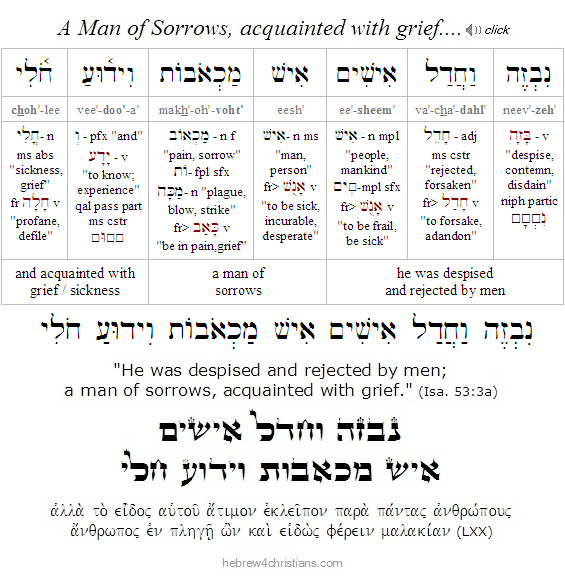 |
Faith and Resurrection...
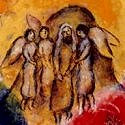
[ The following entry is related to this week's Torah reading, parashat Chayei Sarah... ]
11.22.19 (Cheshvan 24, 5780) More space is given to the negotiation between Abraham and the Hittites for the Cave of Machpelah in Hebron (Gen. 23:3-16) than many other matters in Torah, since it represented Abraham's faith in the resurrection from the dead. Indeed it was the death of Sarah that moved Abraham to "see and greet from afar" the fulfillment of God's promise, despite the appearances of this world (Heb. 11:13). Thus Abraham said to the sons of Chet: "I am a 'stranger and sojourner' (גֵּר־וְתוֹשָׁב) among you; sell me a burial site..." (Gen. 23:4). Abraham foresaw the City of God, the architecture of Zion to come, and by faith "he was looking forward to the city that has foundations, whose designer and builder is God" (Heb. 11:9-10). It is significant that after the great Exodus, the two faithful spies sent to scout the land (Joshua and Caleb) first visited the burial place of the patriarchs in Hebron to renew their conviction that the land could be taken (Num. 13:21-22). The heart of faith affirms the promise of God, even in the face of the dust of death itself; it affirms that underlying the surface appearance of life is a deeper reality that is ultimately real and abiding. It "sees what is invisible" (2 Cor. 4:18) and understands (i.e., accepts) that the "present form of this world is passing away" (1 Cor. 7:31). Faith is the assurance of things hoped for, the conviction of things not seen (Heb. 11:1).
טוֹב לָלֶכֶת אֶל־בֵּית־אֵבֶל מִלֶּכֶת אֶל־בֵּית מִשְׁתֶּה
בַּאֲשֶׁר הוּא סוֹף כָּל־הָאָדָם וְהַחַי יִתֵּן אֶל־לִבּוֹ
tohv · la·le·khet · el · bet- e·vel · mee·le·khet · el- bet- meesh·teh
ba·a·sher · hoo · sof · kohl · ha·a·dahm · ve·ha·chai · yee·tein · el- lee·boh

"It is better to go to the house of mourning than to go to the house of feasting,
for this is the end of all mankind, and the living will lay it to heart."
(Eccl. 7:2)

"These (i.e., the patriarchs) all died in faith, not having received the things promised, but having seen them and greeted them from afar, and having acknowledged that they were strangers and exiles (גֵּרִים וְתוֹשָׁבִים) on the earth. For people who speak thus make it clear that they are seeking a homeland (i.e., πατρίδα, "land of the Father"). If they had been thinking of that land from which they had gone out, they would have had opportunity to return. But as it is, they desire better, that is, a heavenly land. Therefore God is not ashamed to be called their God, for he has prepared for them a city" (Heb. 11:13-16).
The Power of God's Word...
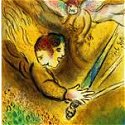
11.22.19 (Cheshvan 24, 5780) Even for one whose heart is frozen solid, or whose heart has turned to stone, the Word of the LORD (דבר יהוה) is powerful to shatter and crush, as it is said, "Is not my word like fire, declares the LORD, and like a hammer that shatters rock in pieces?" Indeed God's truth is quick and piercing - like burning fire - penetrating into the hearts and souls of men (see Heb. 4:12). A key difference between a true and false prophet, then, is that a true prophet is sent by the LORD, and therefore the word spoken has power to effect God's purposes... This is the agency of the Spirit of God, which produces power and fire in those who are truly called, as opposed to those who are imitators or those who simply call themselves God's prophets. The "word" of the false prophet (נביא שקר) might seem powerful or exciting, but it "tickles the ear" by promising blessing despite the prevalence of sin and without the call to do teshuvah. The word of the true prophet, on the other hand, will often offend as it burns away the dross and breaks even the hardest of hearts.
הֲלוֹא כה דְבָרִי כָּאֵשׁ נְאֻם־יְהוָה
וּכְפַּטִּישׁ יְפצֵץ סָלַע
ha·loh · kho · de·va·ree · ka·eish · ne·oom · Adonai
ookh·pa·teesh · ye·fo·tzeitz · sa·la'

"Is not my word like the fire, declares the LORD,
and like a hammer that shatters rock in pieces?"
(Jer. 23:29)

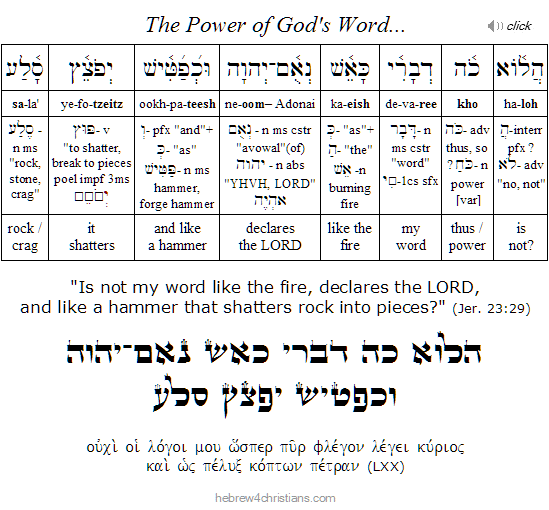
After Paul had asked God three times to remove a certain "thorn in the flesh" (σκόλοψ τῇ σαρκί) which he likened to a "messenger from Satan" (ἄγγελος σατανα), Yeshua told him: "My grace is sufficient for you, for my power is made perfect in weakness" (2 Cor. 12:9). Now this is not a word for those who rely on carnal reasoning and energy to make it through the day, but it is a key principle for all those called to become conduits of God's comfort to others (2 Cor. 1:3-5). Of course we naturally want relief from pain and to mend the broken pieces of our hearts -- to let the "cup of suffering" pass from us -- but there is only the way of surrender, that is, "going through the wound" to find healing comes from the hand of God and not from our own devices. When we realize our ongoing need for God to help us get through our day, we may appear weak, but "there is nothing so whole as a broken heart," and therefore the fire and hammer of God is intended to forge new life from above.
Blessed in all things...
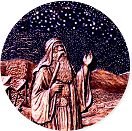
[ The following entry is related to this week's Torah reading, parashat Chayei Sarah... ]
11.22.19 (Cheshvan 24, 5780) In the same verse that Abraham is described as "old and come into days" (זָקֵן בָּא בַּיָּמִים), he is also described to have been blessed bakol (בַּכּל) - "in everything" (Gen. 24:1). Contrary to the ideals of youth-obsessed culture, Torah regards aging as a process of construction, of upbuilding, of perfection -- not of decay. The sages say that the elderly "wear the days of their life as a garment," that is, as an accumulated "presence of days" that attends to the soul of the person. Indeed, the Talmud notes that the word zaken ("elder") can be read as zeh kana, "this one has it." Maturity and wisdom are qualities that should be honored in our culture -- not abhorred or disregarded. As the proverb puts it, עֲטֶרֶת תִּפְאֶרֶת שֵׂיבָה / aseret tiferet sevah: "Gray hair is a crown of glory" (Prov. 16:31). That God blessed Abraham "bakol" means that He revealed his presence to him in all things. This is the meaning of "Abraham was come into days." The days of his life were filled with the Divine Presence, and that is why he died content (Gen. 25:8).
The sages add that God blessed Abraham bakol because it reflected Abraham's own desire to be a blessing to others. This is the "like-for-like" nature of love: when it is shared and given away, it is returned to the heart by the hand of heaven....
Struggles of Faith...
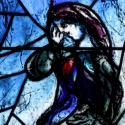
11.22.19 (Cheshvan 24, 5780) Do you sometimes have trouble trusting God? Do you wrestle with fear, anxiety, or worry? Does an inexplicable dread or sense of hopelessness sometimes oppress you? Do you secretly wonder what's wrong with you - and whether you are truly saved, after all? Please hang on. Doubting and questioning are often a part of the journey of faith, and we don't have to be afraid of our questions, concerns, and difficulties... Being full of "certainty" is not the same as being full of faith, after all, since many sincere people are sincerely self-deceived, and many people experience fear and trembling despite their faith. There is so much we simply do not know, and it is dishonest to pretend otherwise. God knows your heart, and he knows your secret fears. Thankfully, there is a special prayer included in the Scriptures for those times when we feel especially insecure: "Lord, I believe, help thou my unbelief..." (Mark 9:24) Here we bring our (lack of) faith to God for healing.
We should not be scandalized that we sometimes struggle with our faith. After all, Yeshua constantly tested his disciples: "Do you now believe?" (John 16:31). And that's why we are commanded to "put off" the old nature and to "put on" the new nature -- because God knows we are fickle admixtures, contradictions, carnal-yet-spiritual, inwardly divided souls that need to learn to trust in the miracle of God with all our hearts....
Of course it's easy to believe when things are going well, when faith "makes sense" or provides you with a sense of community, etc., but when things are difficult, when there are disappointments, pain, grief, losses, etc., then you need to trust in the unseen good, the "hidden hand" of God's love, despite the trouble of your present circumstances. This is part of faith's journey: leaning on God's care, despite the "valley of the shadow of death," despite the tests... The way may sometimes be difficult, but "the tested genuineness of your faith -- more precious than gold that perishes though it is tested by fire -- will be found to result in praise and glory and honor at the revelation of Yeshua the Messiah" (1 Pet. 1:7).
קַוֵּה אֶל־יְהוָה חֲזַק וְיַאֲמֵץ לִבֶּךָ
וְקַוֵּה אֶל־יְהוָה
ka·veih · el · Adonai · cha·zahk · ve·ya·a·meitz · lee·be·kha
ve·ka·veih · el · Adonai

"Wait for the LORD: be steadfast, and he will strengthen your heart;
again, wait for the LORD." (Psalm 27:14)
Download Study Card

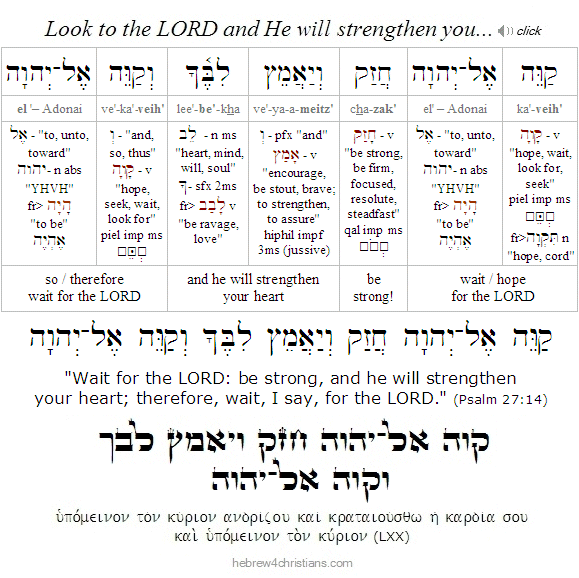
Every Soul a Teacher...
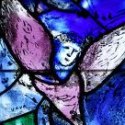
11.21.19 (Cheshvan 23, 5780) Every one of us is a teacher of sorts, proclaiming through our personal choices what we believe to be true. False teachers are those whose choices "teach" that there is no God, no eternal life, no meaning to life, and ultimately, no real hope... It cannot be any other way, for we all teach by our choices; we communicate by our assumptions of what we regard is of "ultimate concern." Don't be fooled by the phony intellectuals of our day: so-called "postmodern" philosophy never answered any of the haunting existential questions of life, such as: What is reality? Why is there something rather than nothing? What is the purpose of life? What happens when we die? Who am I? Do moral choices matter? and so on, but instead merely reinterpreted the hunger for meaning to be about power and control... Nonsense! People may evade the great questions of life by pretending they are unknowable, but Scripture attests that all people are created in God's image and are intuitively aware of God's reality and power: "For His invisible attributes, namely, his eternal power and divine nature, have been clearly perceived, ever since the creation of the world, in the things that have been made; so they are without excuse" (Rom. 1:20). We have a sacred duty to honor God's truth and that implies we bear a sacred animosity toward lies and false teaching. "Do not be deceived: associating with false teaching corrupts good character" (1 Cor. 15:33). We abhor sin because it wounds and kills the soul. Think straight; awaken to the holiness of life; turn away from vain thoughts and lies; embrace the truth of God's salvation.
Every day we make decisions regarding good and evil, and therefore every day we are deciding (i.e., proclaiming, teaching, and attesting) our faith to others. The issue is not whether we will teach others, but what we will teach them by the testimony of our lives and the decisions we make regarding our ultimate concerns...
יִרְאַת יְהוָה שְׂנאת רָע
גֵּאָה וְגָאוֹן וְדֶרֶךְ רָע
וּפִי תַהְפֻּכוֹת שָׂנֵאתִי
yeer·at · Adonai · se·noht · ra'
gei·ah · ve·ga·ohn · ve·de·rekh · ra'
oo·fee · tah·poo·khot · sa·nei·tee

"The fear of the LORD is to hate evil -
pride and boasting and the way of evil
and perverted speech I hate."
(Prov. 8:13)
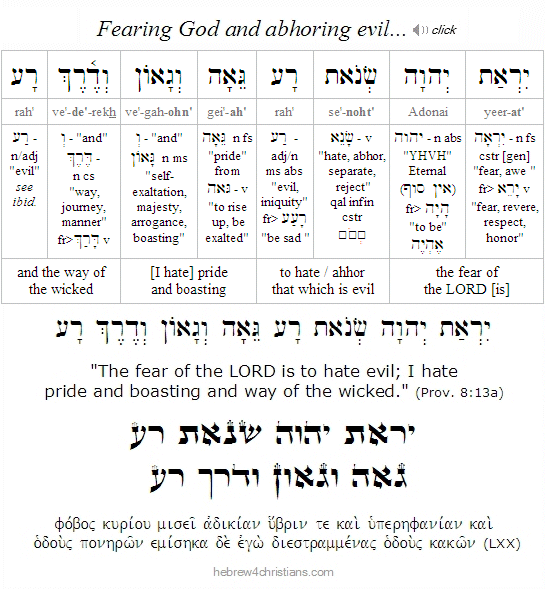 |
Contrary to the philosophy of this fallen world, the essence of love is not spineless tolerance, for tolerating evil is a form of hating what is good... Followers of Yeshua must love the truth and abhor the lie. Tolerating sin in a world ripe for judgment is a tacit form of "collaboration" with the enemy... Indeed, the only thing regarded as intolerable in the devil's world is the objection that people have a supposed "liberty" to sin. But the LORD is clear on this point: "Woe to those who call evil good and good evil, who put darkness for light and light for darkness, who put bitter for sweet and sweet for bitter! Woe to those who are wise in their own eyes and who flatter themseves as understanding" (Isa. 5:20-21). Therefore we are enjoined: "O you who love the LORD, hate evil" (Psalm 97:10). Yes, hate what is evil and love what is good (Amos 5:15). The connection between loving God and hating evil is repeated in the New Testament: "Let your love be genuine (ἀνυπόκριτος, without a "mask" put on): abhor what is evil; cling to what is good (Rom. 12:9). If we truly love the LORD, let us walk in the awe of His great Name by hating what is evil.
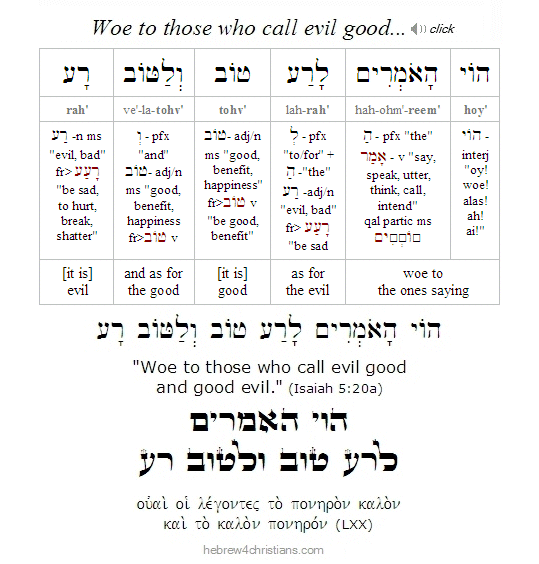 |
Note: The "animism" of pop culture is a direct result of social engineering intended to suppress the truth of God from being heard in the public square. The Apostle Peter instructed us to sanctify ("make sacred, set apart, etc.) the Lord God within our hearts and to be ready always to give a reason for the hope that is us, so long we do so respectfully, with humility and reverence (1 Pet. 3:15-16). Shalom.
Knowing yourself in Him...
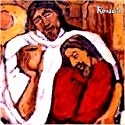
11.21.19 (Cheshvan 23, 5780) It is vital to affirm your identity as a beloved child of God... You may not always feel the connection, but you must choose it regardless of your present emotional state, because your place in God's heart is a matter of truth, not sentimentality. Who you really are is grounded in the Reality and power of the LORD God of Israel. After all, God loved you before you were born (Jer. 1:5; 31:3); he knit you together in your mother's womb (Psalm 139:13-16); he gives you life from above and adopts you as his own (John 1:12; Rom. 8:15); he knows the number of the hairs on your head and every thought and word of your heart (Matt. 10:30; 12:26; Psalm 139:4); he directs every step of your journey throughout this life (Psalm 37:23; 139:3; 23; Prov. 16:9); he foresaw you when he offered up his life in redemption for your healing (1 Cor. 15:3; 2 Cor. 5:21; Gal. 1:4; 1 Pet. 2:24; 2 Cor. 5:18); you are briah chadashah, a new creation (2 Cor. 5:17; Gal. 6:15); you are always welcome in his presence (Eph. 1:6; Heb. 4:16); he will never leave you nor forsake you (Heb. 13:5); he prepares a place for you in the world to come (Jer. 29:11; John 14:1-3); and one day he will wipe away every tear from your eyes (Rev. 7:17; 21:4). When you are tempted to feel badly about yourself, then, take a moment to affirm who you God says you are. Don't allow your past to hold you in exile; don't give place to shame; know yourself only in relation to God's love for your soul. Whenever you feel hurt, angry, fearful, or rejected, turn inwardly to God and center yourself in his presence; realize that such negative feelings do not define what is most real about you. Bacharta ba'chayim: Turn now to God; reaffirm that you are his beloved child, and thank him for the blessing of your redeemed life. Amen.
Why then the Law?
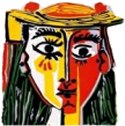
[ We must be careful not to be confused about the essential meaning of the gospel... Listen to the podcast (below) discussing the role of the law in the life of a follower of Yeshua... ]
11.20.19 (Cheshvan 22, 5780) Often it seems that we take one step forward, two steps back, revisiting the waste places of our old thinking and feeling the sting our character defects... Unfortunately this experience is common enough, since we often forget that change does not come from "reforming" the old nature, but by trusting that God makes all things new, and reckoning that our old nature is dead, buried and gone in Messiah (Gal. 2:20). Should we forget this and attempt to rectify the incurable, however, it is inevitable that we will be scandalized over our old depravity and we will need to go back to the beginning. However do not despair, dear one. The first step is most decisive. A chasid once lamented to the Baal Shem Tov that though he worked hard to be observant in his faith, he was still an sinful, ordinary and ignorant man. "Not true," said the Baal Shem Tov. "You now realize that you are a sinful, ordinary, and ignorant man, and that is an improvement" (Socrates would have agreed). Likewise Yeshua came not save the so-called righteous, but sinners to repentance (Mark 5:32). The way of healing is to going back to the beginning, turning to God in our need of heart and confessing the truth that in God alone is our salvation.
Where it is written, "How long shall I take counsel in my soul, having sorrow in my heart daily" (Psalm 13:2), the sages remark that just as long as we take counsel in our own soul there will be such sorrow, since only after we realize that no further counsel can help us do we give up and confess our need for God's salvation. Therefore בְּטַח אֶל־יְהוָה בְּכָל־לִבֶּךָ, "trust in the LORD with all your heart, and do not lean on your own understanding" (Prov. 3:5). Mammash - trust in the LORD!
Yeshua does not represent the "Second Coming of Moses"; nor did our Savior die on the cross so that we would become entangled in the old ways of thinking and being... Following Yeshua is not a religion of "moral reformation" or self-improvement designed to propitiate us before God. No, forever no! Yeshua is LORD and Master and we find new life in His acts of deliverance done on our behalf and for our benefit. The temptation is always to go back to the "law of sin and death" (i.e., the principle of self-justification), but as Luther once said: "The sin underneath all our sins is the lie of the serpent that we cannot trust the love and grace of Christ and that we must take matters into our own hands." Dear friends, we never get past our need for the cross... the crucified life is the way of sanctification.
Do not lie to one another since you have "stripped off" and "disarmed" (ἀπεκδύομαι) the old nature with its practices" (Col. 3:9); but "clothe yourself with the new nature that has been created in God's image – in righteousness and holiness that comes from truth" (Eph. 4:24).
Our Father, Our King...
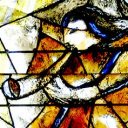
11.20.19 (Cheshvan 22, 5780) "Blessed are you, O LORD God of Israel our Father, forever and ever. Yours, O LORD, is the greatness and the power and the beauty and the victory and the majesty, for all that is in the heaven and in the earth is yours. Yours is the kingdom, O LORD, and you are exalted as head above all" (1 Chron. 29:10-11). Amen, amen. In light of this blessed truth, then, what is it but unbelief that incites us to fear, to become anxious, frustrated, angry, and to seek to control outcomes? Forgive us, O Lord: We sometimes fail to remember your greatness; we lose sight that you indeed reign over all; our fears moves us into exile, our hearts grieve when we find ourselves immersed in the vanity of this world... But your kingdom rules over all and therefore everything is under your ongoing supervision... You sustain and uphold all things by the Word of your Power (נוֹשֵׂא כל בִּדְבַר גְּבוּרָתוֹ); you are our good Shepherd, our loving Father; you watch over our ways; you write our names upon your hands; and you show us the path of life (Psalm 16:11). "You are strength and might, and it is in Your power to make anyone great and strong," and therefore help us, O Lord, to revere you; help us to know that nothing is trivial; awaken us to the truth of your Reality and Presence... Teach us to number our days that we might become wise (Psalm 90:12); we are as a breath; our days are like a passing shadow (Psalm 144:4); have mercy upon us and redeem the days appointed for our sojourn.
ברוך אתה יהוה אלהי ישׂראל אבינו
מעולם ועד־עולם
bah'-rookh · a-tah · Adonai · e-loh-hei · yees-rah-el · ah-vee'-noo
mei-oh-lahm · ve-ad· oh-lahm

"Blessed are you LORD God of Israel our father,
for ever and ever."
(1 Chron. 29:10)

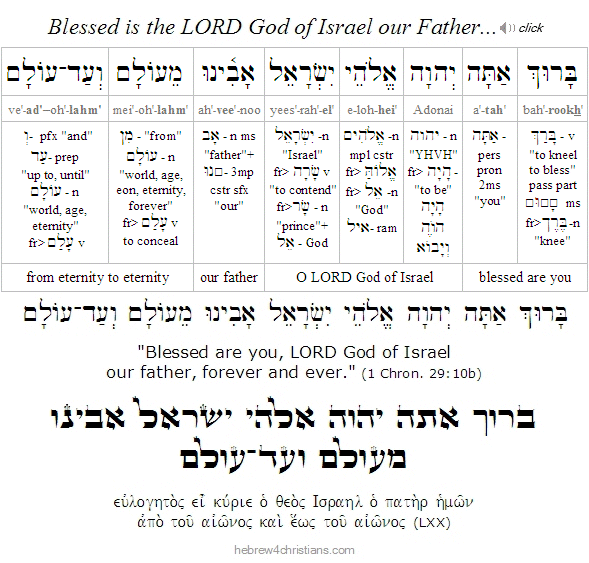
לְךָ יְהוָה הַגְּדֻלָּה וְהַגְּבוּרָה וְהַתִּפְאֶרֶת
וְהַנֵּצַח וְהַהוֹד כִּי־כל בַּשָּׁמַיִם וּבָאָרֶץ
לְךָ יְהוָה הַמַּמְלָכָה וְהַמִּתְנַשֵּׂא לְכל לְראשׁ
le·kha · Adonai · ha·ge·doo·lah · ve'ha·ge·voo·rah · ve'ha·teef·e·ret
ve'ha·neitz·ach · ve'ha·hohd · kee·khol · ba·sha·ma·yeem · oo'va·a·retz
le·kha · Adonai · ha·mam·la·khah · ve·ha·meet·na·sei · le·khol · le·rosh

"Yours, O LORD, is the greatness and the power and the beauty
and the victory and the majesty, for all that is in the heaven and in the earth is yours.
Yours is the kingdom, O LORD, and you are exalted as head above all."
(1 Chron. 29:11)
Download Study Card

What About Head Coverings?

11.20.19 (Cheshvan 22, 5780) It is common for many in the Messianic movement to wear a tallit (prayer shawl), though the Apostle Paul would have made the case that a man covering his head with one during congregational worship is disrespectful in light of meaning of the New Covenant. He wrote: "I want you to understand that the head of every man is Messiah, the head of a wife is her husband, and the head of Messiah is God. Every man who prays or prophesies with his head covered (i.e., κατὰ κεφαλῆς ἔχων, lit. "wearing down from his head") brings shame to his head, and every woman who prays or prophesies with her head uncovered (ἀκατακάλυπτος) brings shame to her head - there is no difference between her and a woman who has had her head shaved.... For a man indeed should not have his head covered (i.e., κατακαλύπτω, "covered up, concealed"), because he is the image and glory of God, and the woman is the glory of man" (1 Cor. 11:3-5,7). Paul's teaching on this question is a remarkable illustration of the how the New Covenant changes our existential posture before God. Under the former covenant given at Sinai, Jewish oral law and tradition enjoined men to pray with their heads covered both as a sign of respect toward God and because of the inherent unworthiness to speak face to face with the LORD. Paul rejected this custom (of using a shawl or other form of head covering) for followers of the Messiah because they are given access to the very Holy of Holies in the Messiah to commune with the LORD face to face (Heb. 4:16). Therefore we may approach God with confidence and great joy as his beloved children: "And we all, with unveiled face (ἀνακεκαλυμμένῳ προσώπῳ), reflecting the glory of the LORD, are being transformed (i.e., μεταμορφόω, the same word used describing the transfiguration of Yeshua in Matt. 17) into the same image from one degree of glory to another. For this comes from the LORD who is the Spirit" (2 Cor. 3:18).
Let's get some background on this, if possible... When we read the entire letter of First Corinthians we can see that Paul was very concerned about leadership issues and carnal problems of the church. Paul was especially concerned about the pagan influences regarding oracles and women priests, temple prostitution, and other things. Though it is difficult to understand Paul's precise reasoning, his conclusion was straightforward: men were not to cover their heads (either effeminately or by any other means) when publicly praying, teaching, or prophesying, though women, on the other hand, were required to cover their heads in subjection to male leadership. I realize this sounds "politically incorrect" by today's standards, but who cares what this world thinks about God's word? At any rate Paul wanted to establish order in the ekklesia, with a hierarchy of leadership beginning with the LORD himself, then to appointed men, then to women, children, and so on (1 Cor. 11:3,7-12; 1 Cor. 14:33-35). This hierarchy implies that each man is directly beholden to the LORD as a priest of God on behalf of his family.
Now let me add that while men are not permitted to cover their heads in public worship, there is no rule prohibiting simply wearing a tallit for ceremonial purposes. The Torah states that the primary purpose of wearing tzitzit (fringes) is to keep people from "whoring after" their eyes: "Speak to the people of Israel, and tell them to make tzitzit (fringes, from צִיץ "bloom") on the corners of their garments (צִיצִת עַל־כַּנְפֵי בִגְדֵיהֶם) throughout their generations, and to put a cord of blue (תְּכֵלֶת) on the border of each corner. And it shall be for a tzitzit (לצִיצִת) for you to look at and remember all the commandments of the LORD, to do them, not to follow after your own heart and your own eyes, which you are inclined to whore after. So you shall remember and do all my commandments, and be holy to your God" (Num. 15:38-40). In other words Paul's instruction not to cover the head does not pertain to wearing a tallit, unless of course the tallit is used as a covering over the head (something for which it was not originally intended, by the way), in which case it would be prohibited! Note further that the word tallit (טַלִּית) does not appear in Scripture, though likely it embellished the Torah's commandment to attach tzitzit to "four-cornered" shrouds... As for the donning of a kippah (skullcap), understand that there is no halakhah (Torah law) that requires it, and therefore it is a simply a minhag (custom) that historically became popular during the middle ages. However like the tallit (which was developed after the Second Temple was destroyed), the use of the kippah would be forbidden for men during times of public prayer and teaching according to Paul.
It is important to keep in mind that Paul was speaking to an assembly of believers that was undisciplined, with various warring factions, open sexual immorality, unseemly lawsuits against one another, and so on. Paul seemed especially concerned with certain women who were prophesying with their heads uncovered, assuming leadership of the assembly. It was a messy situation, for sure, but it seems likely that Paul wanted to establish order because the pagan influences of that culture were so strong that the message of the gospel was at risk of being compromised if a strong message was not delivered.
Concerning the foregoing discussion, please understand there is no misogyny in Paul, and note that he affirms that men come from women as a woman came from a man, indicating reciprocity and equality: "Nevertheless, in the Lord woman is not independent of man nor man of woman; for as woman was made from man, so man is now born of woman. And all things are from God" (1 Cor. 11:11-12). Paul also wrote, "There is neither Jew nor Greek, there is neither slave nor free, there is neither male nor female – for all of you are one in Yeshua the Messiah" (Gal. 3:28; 1 Cor. 12:12).
Does Paul have Divine Authority?
"At midday I saw on the way a light from heaven, brighter than the sun, that shone around me and those who journeyed with me. And when we had all fallen to the ground, I heard a voice saying to me in the Hebrew language (λέγουσαν τῇ ῾Εβραΐδι), 'Saul, Saul, why are you persecuting me? It is hard for you to kick against the goads.' And I said, 'Who are you, Lord?' And the Lord said, 'I am Yeshua whom you are persecuting. Now rise and stand upon your feet, for I have appeared to you for this purpose, to appoint you as a servant and witness to the things in which you have seen me and to those in which I will appear to you, delivering you from your people and from the Gentiles -- to whom I am sending you to open their eyes, so that they may turn from darkness to light and from the power of Satan to God, that they may receive forgiveness of sins and a place among those who are sanctified by faith in me'" (Acts 26:13-18; see also Acts 9:32-36).
You will either accept Paul as a true witness of the LORD God of Israel or you won't; the modern apostate churches have made their move on this question, relegating Paul to "midrash" status, though cherry-picking bits of his thinking they find useful. Be careful here. Read the warning of Galatians 1:8-9. It is a serious error to reject Paul from the Scriptures, since doing so means negating about 30% of the New Testament, and that includes writings that are absolutely essential to understanding the meaning and significance of the cross, the deity of Messiah, the way of salvation, and so on. If you reject the authority of Paul as a witness of the truth, you should not quote from Romans, Galatians, Ephesians, Philippians, Titus, the book of Hebrews, and so on. Indeed, you should not trust the Gospel of Luke or the Book of Acts either, since Luke was a follower of the apostle Paul (see Col 4:14; 2 Tim 4:11).
Some people reject Paul's authority and claim to be followers of "Jesus only..." Well, Yeshua actually called Paul by name and commissioned him to proclaim the message of the gospel to the nations. Moreover the Apostle Peter wrote: "Therefore, dear friends, since you are waiting for the things of salvation, strive to be found at peace, without spot or blemish, when you come into his presence. And regard the patience of our Lord as salvation, just as also our dear brother Paul wrote to you, according to the wisdom given to him, speaking of these things in all his letters. Some things in these letters are hard to understand (δυσνόητος, from δυσ, "hard" + νοέω, "to know"), things the ignorant and unstable twist to their own destruction, as they also do to the rest of the Scriptures. Therefore, dear friends, since you have been forewarned, be on your guard that you do not get led astray by the error of these unprincipled men and fall from your firm grasp on the truth" (2 Pet. 3:16).
It is divinely ironic that God chose the greatest Torah sage of the day and completely turned him around to be an indomitable witness that Yeshua is Messiah of Israel and the Savior of the world... תודה לאל על השליח פאולוס - Thank God for the Apostle Paul!
An Important Adddendum:
In response to this entry, someone challenged me by saying that Paul never would have advocated breaking the law or Jewish traditions because the book of Acts portrays him (after his conversion) still doing Torah things like circumcising Timothy (Acts 16:3), making a Nazirite vow and offering sacrifices at the Temple (Acts 18:18; 21:26), keeping the Jewish festivals (Acts 20:16), and saying "I am a Pharisee" when questioned about his faith (Acts 23:6).
My response was to acknowledge Paul's love for the Torah which he described as "holy, just, and good" (Rom. 7:12), but to point out that Paul regarded "Torah" to mean something more than observing the laws as interpreted by the Pharisees. After all Paul would have understood the implications of the new covenant (בְּרִית חֲדָשָׁה) foretold by the prophet Jeremiah: "Behold, the days are coming, declares the LORD, when I will make a new covenant with the house of Israel and the house of Judah, לא כַבְּרִית אֲשֶׁר כָּרַתִּי אֶת־אֲבוֹתָם - not like the covenant that I made with their fathers on the day when I took them by the hand to bring them out of the land of Egypt, my covenant that they broke, though I was their husband, declares the LORD. For this is the covenant that I will make with the house of Israel after those days, declares the LORD: I will put my Torah within them, and I will write it on their hearts. And I will be their God, and they shall be my people" (Jer. 31:31-33). Indeed Paul had a deeper view of Torah than the Pharisees of his day, as the book of Galatians and the book of Romans clearly explain.
Regarding the book of Acts, recall the issue that led to the "Jerusalem Council" had to do with whether Gentiles should keep the law of Moses (Acts 15:1-2). Now bear with me, since my point here concerns Paul's acknowledgment that no one - not even a Pharisee like himself - actually kept the law of Moses. When Paul and Barnabas went to Jerusalem to resolve the issue in consultation with the apostles (Acts 15:5-6), Peter protested against placing a yoke (the Mosaic Law) on the neck of the disciples that neither the patriarchs nor they, Messianic Jews, were able to bear (Acts 15:10). Peter went on to affirm that people - Jew or Gentile - are saved by grace, not by deeds of the law (Acts 15:11). At this point, Paul and Barnabas told how God used them to reach the Gentiles, and then James proclaimed that the Gentiles should not be troubled by the issue but to simply avoid idolatry, sexual immorality, eating strangled animals and blood (Acts 15:13-20). What's interesting here is that in Galatians 2, Paul rebuked Peter for hypocrisy on this decision, since Peter slunk away to avoid looking like he was eating with uncircumcised Gentiles (something that the Torah forbade (Exod. 23:33, 34:12. Deut. 7:2, Deut. 26:9, Josh 23:7; Jdg. 2:2). Paul then challenged Peter: "If you, though a Jew, live like a Gentile and not like a Jew, how can you force the Gentiles to live like Jews? We ourselves are Jews by birth and not Gentile sinners; yet we know that no one is justified by the works of the law but by the faithfulness of Yeshua the Messiah. And we have come to believe in Yeshua, so that we may be justified by the faithfulness of Messiah and not by the works of the law, because by the works of the law no one will be justified" (Gal. 2:14-16). The sages call this a kal va'chomer inference (i.e., קַל וְחמר, "light and weighty"), namely, that if a light condition is true, then certainly a heavier one is true. If it's true that a Jew cannot keep the law, then for even greater reason a Gentile cannot keep the law...
Paul's rebuke to Peter indicates that he was a "born again" Pharisee who realized that all his attempts to please God through legalistic Judaism were worthlessness (σκύβαλον) compared to the glory of knowing the resurrected LORD:
"For we are the circumcision, who worship by the Spirit of God and glory in Yeshua the Messiah and put no confidence in the flesh-- though I myself have reason for confidence in the flesh also. If anyone else thinks he has reason for confidence in the flesh, I have more: circumcised on the eighth day, of the people of Israel, of the tribe of Benjamin, a Hebrew of Hebrews; as to the law, a Pharisee; as to zeal, a persecutor of the church; as to righteousness under the law, blameless. But whatever gain I had, I counted as loss for the sake of Messiah. Indeed, I count everything as loss because of the surpassing worth of knowing Yeshua the Messiah my Lord. For his sake I have suffered the loss of all things and count them as rubbish, in order that I may gain Messiah and be found in him, not having a righteousness of my own that comes from the law, but that which comes through faith in Messiah, the righteousness from God that depends on faith-- that I may know him and the power of his resurrection, and may share his sufferings, becoming like him in his death, that by any means possible I may attain the resurrection from the dead." (Phil. 3:3-11)
So while Paul never disavowed his heritage as a Jew and learning as a Pharisee, and though he sometimes acted according to the law to win those who are of the law (1 Cor 9:20), this does not contradict the truth that Paul regarded himself as not being "under the Law" (Gal. 5:18; Rom. 10:4). Paul later regarded the law as a "tutor" to bring him to the revelation of Messiah (Gal. 3:24), and he certainly knew the difference between covenant and Torah:
"Do you not know, brothers-- for I am speaking to those who know the law-- that the law is binding on a person only as long as he lives? For a married woman is bound by law to her husband while he lives, but if her husband dies she is released from the law of marriage. Accordingly, she will be called an adulteress if she lives with another man while her husband is alive. But if her husband dies, she is free from that law, and if she marries another man she is not an adulteress. Likewise you also have died to the law through the body of Messiah, so that you may belong to another, to him who has been raised from the dead, in order that we may bear fruit for God" (Rom 7:1-4).
So again while Paul lived as a Jew and honored the Torah, he made a emphatic distinction between the Sinai Covenant and the New Covenant, arguing that the New Covenant was grounded in the truth of God that is "apart from the law," namely, the righteousness of God acquired by faith in Yeshua as the propitiation for our sin (Rom. 3:21). There is a Torah that is older than the revelation given at Sinai, hearkening back to Abraham and further back to the original promise given to Adam and Eve after the original transgression.
The Life-Giving Fear...

11.19.19 (Cheshvan 21, 5780) In the Torah we read: "And now, Israel, what does the LORD your God require of you, but to fear the LORD your God..." (Deut. 10:12). Notice that "fear of the LORD," yirat Adonai (יִרְאַת יהוה), comes first and is what is required of you. The sages say that to fear the LORD means that your fear should be like God's fear. But what could God possibly fear, you ask? Only this: that you will turn away from his love and destroy yourself. To fear God means abhorring that which breaks the relationship He desires with you. That is the wound of God's heart, and that is what God "fears." Of course there is also the fear of going to hell and suffering God's judgment for sin, but that outcome is the result of that which God fears, namely, your rejection of his offer of grace and forgiveness given in Yeshua... Nonetheless, believers should also fear sinning against God since that is a mockery of his love. Why? Because if God so hates sin that he suffered and died for you to be free from its power, what sort of insult is it to continue sinning without experiencing fear and trembling? Consider again the great cost of your salvation (1 Pet. 1:18-19). Yeshua was shamed as a criminal, cruelly beaten, mercilessly flogged, viciously lacerated, and died of asphyxiation upon a cross to intercede for your life and to present his blood as atonement for your sin. He didn't die like this so you could go on sinning with impunity, but to redeem your life from the verdict of the law and to restore your place as child of God. Willfully sinning shows contempt for the sacrifice of Messiah and outrages the spirit of grace: "Someone who rejected the law of Moses was put to death without mercy on the testimony of two or three witnesses. How much worse punishment, do you think, will be deserved by the one who has trampled underfoot the Son of God, and has profaned the blood of the covenant by which he was sanctified, and has outraged the Spirit of grace? For we know the one who said, "Vengeance is mine, I will repay," and again, "The Lord will judge his people." It is a fearful thing to fall into the hands of the living God" (Heb. 10:28-31).
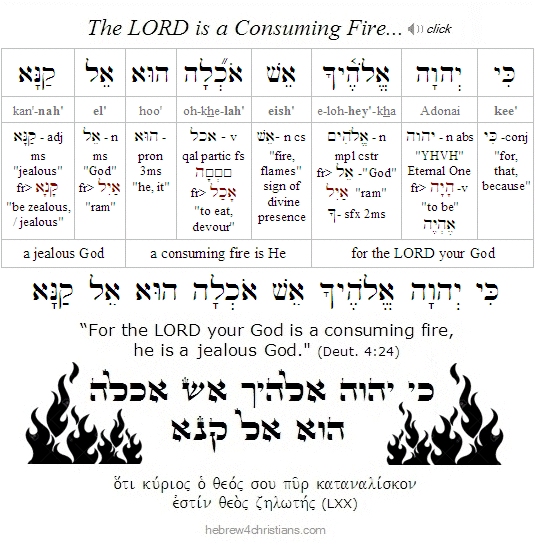 |
Be encouraged. It is written that the fear of the LORD is "the beginning of wisdom (רֵאשִׁית חָכְמָה)," but it also the beginning of the experience of God's love... Without the fear of the LORD, you will walk in darkness and be unable to turn away from evil (Psalm 111:10; Prov. 1:7; 9:10; 10:27; 14:27, 15:33; 16:6); you will find yourself alone, in a place of sadness and vexation, of despair and inner pain. The Spirit of God's love plainly declares that "the fear of the LORD leads to life (יִרְאַת יְהוָה לְחַיִּים, lit. "is for life"), indicating that it is a healing passion:
יִרְאַת יְהוָה לְחַיִּים
וְשָׂבֵעַ יָלִין בַּל־יִפָּקֶד רָע
yeer·at · Adonai · le·cha·yeem
ve·sah·vei·'a · ya·leen · bal-yee·pa·ked · ra

"Fearing the LORD leads to life,
the one who does so rests satisfied and will not be visited by harm."
(Prov. 19:23)

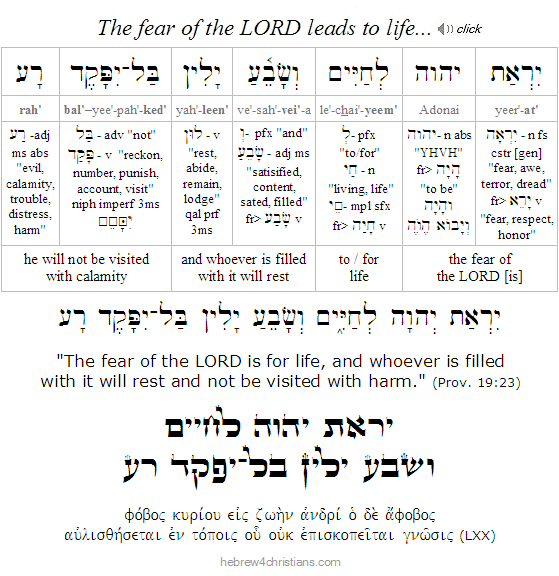
Some people tend to get this backwards, or they may underestimate the seriousness of the issue. The problem is not that people sometimes sin and therefore risk being sent to hell, but rather that people are incorrigible sinners that presently exist in state of hell... Human nature is incurably sick; the wound of our mortality is indeed fatal (Jer. 17:9; Mark 7:21-23). As Yeshua taught, the way out of bondage to sinful human nature is through the miracle of spiritual rebirth (John 3:3-8; 8:44). When we accept God's love we are delivered from the guilt that justly condemns our souls (Col. 1:13). As it is says "Whoever believes in him is not condemned, but whoever does not believe is condemned already, because he has not believed in the name of the only Son of God" (John 3:18). In other words, unless you truly repent by accepting God's love, you risk an eternally loveless existence... It must be remembered that God does not want any one to perish but for all to be in loving relationship with Him (2 Peter 3:9). "God our Savior desires all people to be saved and to come to the knowledge of the truth" (1 Tim. 2:4). However, "hell is a room locked from the inside," and if you steadfastly refuse to be loved, God Himself will respect your decision...
All this resolves to a sober question about your spiritual identity... Do you believe you are a redeemed child of God? Are you spiritually reborn? Do you accept His love and deliverance, or do you make it conditional, based on your performance? This is not about mere ethics, friends - the world is filled with various kinds of ethical philosophy, after all. No, this is a question about ontology - about who you really are; it's a question about what you are trusting, and it centers on the presence of the miracle within your heart.
We are saved by hope (Rom. 8:24). May you fall before the cross in fear of your sins, but may you be raised up by the reality of God's love for your soul... May you then walk in the awe of God's glorious mercy, "to love him, to serve the LORD your God with all your heart and with all your soul." Amen.
Our Need for Vigilance...

11.18.19 (Cheshvan 20, 5780) Yeshua forewarned of the moral depravity that would pervade mankind just before the time of his return: "Because lawlessness (i.e., ἀνομία, from -α ('not') + νομος, 'torah') will be increased," he said, "the love of many will grow cold (i.e., ψύχομαι, 'be extinguished')" (Matt. 24:12). Note the link between Torah and love: true love requires respect for God's authority, for without that the divine image is disfigured and desecrated. Likewise the Apostle Paul said the "End of Days" (אַחֲרִית הַיָּמִים) would be marked by "times of peril" (καιροὶ χαλεποί) because people would become increasingly narcissistic, self-absorbed, infatuated with their own self-importance, abusive toward others, disrespectful to elders, ungrateful, heartless, unforgiving, without self-control, brutal, treacherous, and so on (2 Tim. 3:1-4). When Paul said "times of peril," he used the same word (χαλεποί) that described the character of the demonaics mentioned in Matthew 8:28. Therefore, in light of the spiritual war that rages all around us, it is vital that we remain firmly rooted in what is real by taking hold of our identity and provision as children of God. "God has not given us the spirit of fear, but of power (גְּבוּרָה / δύναμις) and of love (ἀγάπη), and of a "sound mind" (σωφρονισμός), i.e., a "delivered" mind, "healed" from carnal fears (2 Tim. 1:7). We are not to be troubled like the world that lives in terror of man, nor are we to crave "security" from the vain devices of mere men (Jer. 17:5). No - we must look to God Almighty, the Master of the Universe. He alone is our Refuge and Defense, the One who gives us steadfast love in the midst of these storms.
"For you yourselves are fully aware (i.e., ἀκριβῶς οἴδατε, "you carefully know") that the Day of the LORD (יוֹם־יְהוָה) will come like a thief in the night" (see Matt. 24:42; 2 Pet. 3:10; Rev. 3:3; 16:15). While people are saying, "There is peace and security," then sudden destruction will come upon them as labor pains come upon a pregnant woman (i.e., the birthpangs of Mashiach: חֶבְלֵי מָשִׁיח), and they will not escape. But you are not in darkness, brothers, for that day to surprise you like a thief" (1 Thess. 5:2-4). Note that a characteristic of this season will be a emphasis on peace and "security," that is, setting up a ubiquitous security grid that will monitor people... In light of this, "let us not sleep, as others do, but let us keep awake and be sober.. having put on the breastplate of faith and love, and for a helmet the hope of salvation (ἐλπίδα σωτηρίας). For God has not destined us for wrath, but to obtain deliverance through our Lord Yeshua the Messiah" (1 Thess. 5:6-9).
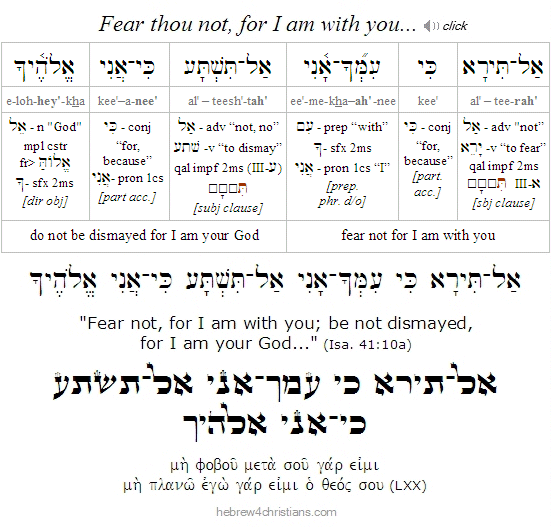 |
The Decision to Love...
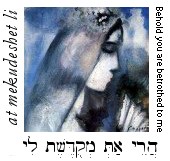
[ The following entry is related to this week's Torah reading, parashat Chayei Sarah... ]
11.18.19 (Cheshvan 20, 5780) From our Torah portion this week we read, "Then he (Isaac) took Rebekah and she became his wife, and he loved her..." (Gen. 24:67). The sages note the sequence -- first he took her to be his wife, and then he loved her - to highlight that marriage is based on a spiritual decision to love rather than a feeling based on passion or self-interest. Feelings of passion and personal satisfaction may develop from the decision to love, but these by themselves cannot form the love's foundation. Meaningful love is grounded in a decision to honor and cherish the other person, and therefore is spiritual in nature. As C.S. Lewis said, don't let your happiness depend on something you may lose. "Aim at heaven, and you get earth thrown in; aim at earth, and you get neither." Rebekah was willing to leave her family - all that she knew - based on an "otherworldly" promise. Her response to the invitation was simply: "I will go"(Gen. 24:58); Isaac, on the other hand, "took her to be his wife," that is, he pledged to be family for her...
Of course the world gets all this backward and thinks that selfish satisfaction is the basis of a marriage relationship, and therefore, as soon as one (or the other) person feels unsatisfied, the relationship is jeopardized. The truth, however, is that marriage is above all the duty to honor and revere the beloved, regardless of matters of personal self-interest.
Endurance and Healing...
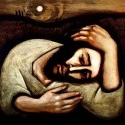
11.18.19 (Cheshvan 20, 5780) You may sometimes struggle with your faith -- not by questioning whether Yeshua is the Savior who died for your eternal healing, but in an hour of testing, when you feel exhausted by pain, when you pray for relief, seeking God in your cries and tears, but the pain continues, and then you are left rationalizing why you were denied your supplication, why your suffering has been prescribed -- for surely, you believe, God can heal you by simply saying the word - and then you wonder to what extent you need to be broken in order to be fully remade... As C.S. Lewis once said, "We are not necessarily doubting that God will do the best for us; we are wondering how painful the best will turn out to be" (Letters of C.S. Lewis, 1964). There is a trust issue in suffering, and an intimacy that comes through its fires. As Kierkegaard reminds us, "It is one thing to conquer in the hardship, to overcome the hardship as one overcomes an enemy, while continuing in the idea that the hardship is one's enemy; but it is more than conquering to believe that the hardship is one's friend, that it is not the opposition but the road, is not what obstructs but what develops, is not what disheartens but ennobles" (Four Upbuilding Discourses, 1844).
The difficulty of intense personal suffering is deeply existential: how do you keep hope in the midst of this tension? "Lord I believe; help my unbelief" (Mark 9:24). How do you affirm that your heavenly Father will heal you but at the present hour you must continue to endure suffering? Do you then devise a "soul-building theodicy" to explain your struggle – providing a narrative to answer the "why" of your suffering -- or do you attempt to sanctify suffering as a means of healing others by the grace of the Messiah (Col. 1:24)? When Yeshua victoriously proclaimed, "It is finished" just before he died on the cross, he foreknew that his followers would experience a "purging process," a "refining fire," and time on the "potter's wheel" to perfect their sanctification. At the cross of Yeshua death itself was overcome – and all that it implies – and yet it is nevertheless true that we will suffer and die ourselves and that death persists an enemy (see 1 Cor. 15:26). While we celebrate the reality of the final redemption, the "instrumentality of our sanctification" needs to be willingly accepted and endured. I say "endured" here because I don't think we will ever have a complete answer to the question of "why" we undergo the various tests we face in this life. Our disposition in the midst of this ambiguity, in the midst of seemingly unanswered prayers, is where our faith is disclosed: will we despair of all temporal hope or not? Will we console ourselves with the vision of a future without tears and loss - a heaven prepared for us -- or will we resist the present darkness and seek to find deliverance in this hour? Do we trust God with our pain and submit to his will, or will we "curse God and die" inside – losing hope and despairing of all remedy?
As King David once wrote, "At an acceptable time, O God, in the abundance of your steadfast love answer me in your saving faithfulness. Deliver me from sinking in the mire; let me be delivered from my enemies and from the deep waters. Let not the flood sweep over me, or the deep swallow me up, or the pit close its mouth over me. Answer me, O LORD, for your steadfast love is good; according to your abundant mercy, turn to me" (Psalm 69:13-16).
עֲנֵנִי יְהוָה כִּי־טוֹב חַסְדֶּךָ
כְּרב רַחֲמֶיךָ פְּנֵה אֵלָי
a·nei·nee · Adonai · kee · tohv · chas·de·kha
ke·rohv · ra·cha·mey·kha · pe·neih · e·lai

"Answer me, O LORD, for precious is your love;
in the greatness of your compassion turn to me."
(Psalm 69:16)

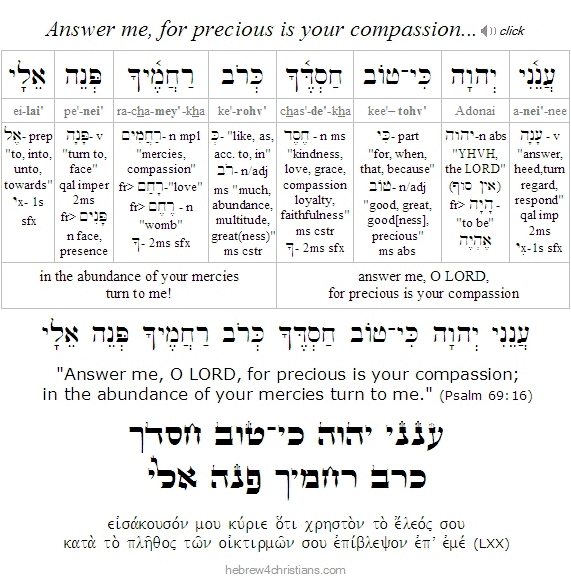
God sometimes allows difficulties in the lives of those whom He favors in order to ultimately reward them. Why were Sarah, Rebekah, and Rachel barren for so many years? So that God would hear their prayers and reward them for their steadfast faith. Why was Leah more fruitful than the other wives of Jacob? Because she was "hated" and subject to unending gossip that she tried to steal her sister's husband, yet she persevered in hope. In this connection, some of the Chassidic sages render Psalm 118:21 as, "I thank you that you have pained me (עֲנִיתָנִי) and have become my salvation." The pain that I regarded as punishment became the means by which I obtained the salvation of the LORD. Similarly, "It was good that I was afflicted (עֻנֵּיתִי), that I might learn your decrees" (Psalm 119:71).
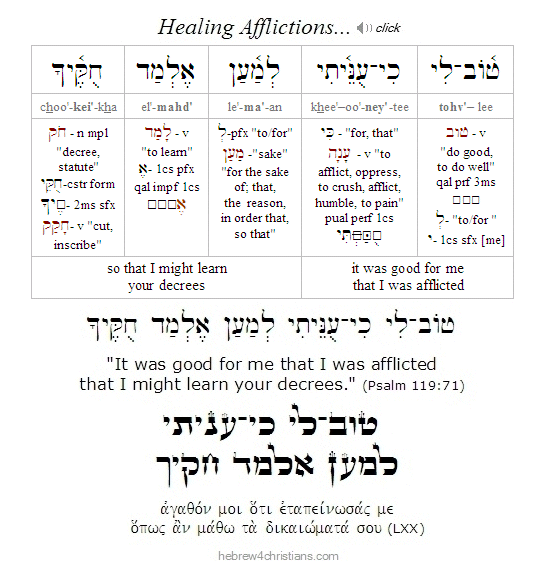 |
"But You, O GOD my Lord, do Thou for me for your own Name's sake; because your steadfast love is good, deliver me" (Psalm 109:21). "Do thou for me" is the confession that God alone has the power to help. Asking God to bring glory to His own Name -- to honor and magnify His Name -- is the theme of all true intercession.
Suffering has a way of focusing the heart and mind, reminding us that "today is the tomorrow of yesterday." Life is short, and our need is great to turn to the LORD and take hold His promises. We take comfort that God is for us the God of salvation: "Blessed be the Lord, who daily bears us up; God is for us our salvation. Selah. Our God is a God of salvation (יְשׁוּעָה), and to GOD, the Lord, belong deliverances from death" (Psalm 68:19-20).
Ephemera and Substance...
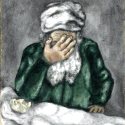
[ The following entry is related to this week's Torah reading, parashat Chayei Sarah... ]
11.17.19 (Cheshvan 19, 5780) When Abraham sought a place to bury his wife Sarah, he said to the Hittites chieftains: "I am a stranger and sojourner among you..." (Gen. 23:4). The righteous invariably feel like strangers to this world, since they are only passing through, and their focus is on the invisible "city that has foundations, whose designer and builder is God" (Heb. 11:10). Likewise they are as sojourners, not at home in this world, because their faith sees through the vanity and deceit of the present world, and therefore they regard themselves as on a journey to the place of truth and holiness where God abides. The wicked, on the other hand, regard life in this world as all that exists, and therefore they "absolutize" the moment and forfeit the blessing of the eternal (Matt. 16:26). Abraham regarded himself as a "stranger and sojourner" (גֵּר־וְתוֹשָׁב) because the people of his world considered themselves as "owners" and "permanent residents" who sought their inheritance in the here and now. Abraham was a "resident" of someplace higher, however, and understood this world to be a corridor to the next. The sages comment on this paradox: God says to man, 'If you see yourself as a permanent resident in this world, then I will be a stranger to you; if, however, you see yourself as a stranger to this world, then I will be a Dwelling Place for you."
כִּי־גֵרִים אֲנַחְנוּ לְפָנֶיךָ
וְתוֹשָׁבִים כְּכָל־אֲבֹתֵינוּ
כַּצֵּל יָמֵינוּ עַל־הָאָרֶץ וְאֵין מִקְוֶה
kee-ge·reem · a·nach·noo · le·fa·nei·kha
ve·to·sha·veem · ke·khol-a·vo·tei·noo
ka·tzeil · ya·mei·noo · al-ha·a·retz · ve·ein · meek·veh

"For we are strangers before you,
and sojourners as were all our fathers;
our days on the earth are like a shadow and there is no abiding."
(1 Chron. 29:15)

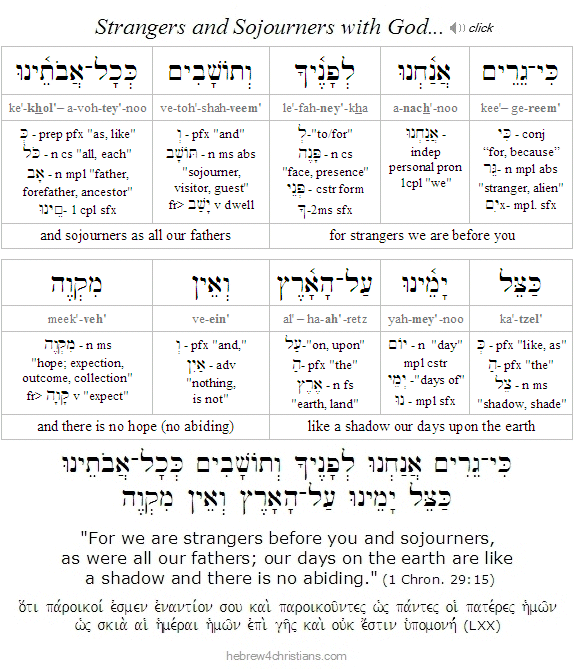 |
Like father Abraham we must learn to see beyond the temporal to behold the eternal; we must look past the shadows to see the substance. Faith calls us to see the unseen, to believe in the promised good that will come, and to keep hope alive... We have to turn our attention away from the rumors and visions of the present hour to see the supernal light which transcends the atmosphere of this world (2 Cor. 5:7). Faith separates us from the visible and temporal realm (i.e., chayei sha'ah: חיי שעה) before the invisible and eternal realm (i.e., chayei olam: חַיֵּי עוֹלָם); it hears (shema) the "yes" of the LORD in the midst of worldly dissipation and despair. Faith is the heartache, the groaning, and the yearning for undying love. "Whom have I in heaven but you? And there is nothing on earth that I desire besides you. My flesh and my heart may be consumed, but God is the strength of my heart and my portion forever" (Psalm 73:25-26). This world appears to the eye of faith a strange place, and here we are no more than sojourners as we look for our heavenly habitation whose builder and maker is God (Heb. 11:10; John 14:1-3). Our hearts yearn for the unseen good, healing beyond death to life, the realm of promise and blessing and unending grace.
מִי־לִי בַשָּׁמָיִם
וְעִמְּךָ לא־חָפַצְתִּי בָאָרֶץ
כָּלָה שְׁאֵרִי וּלְבָבִי
צוּר־לְבָבִי וְחֶלְקִי אֱלהִים לְעוֹלָם
mee-lee · va·sha·ma·yeem
ve·ee·me·kha · loh-cha·fatz·tee · va·a·retz
ka·lah · she·ei·ree · oo·le·va·vee
tzoor-le·va·vee · ve·chel·kee · E·lo·heem · le·o·lahm

"Whom have I in heaven but you?
And there is nothing on earth that I desire besides you.
My flesh and my heart may fail,
but God is the strength of my heart and my portion forever."
(Psalm 73:25-26)
Hebrew Study Card

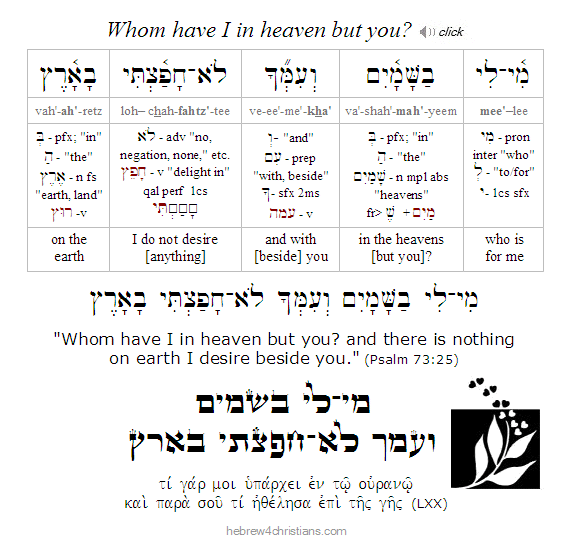
The Life of Sarah... חיי שרה

11.17.19 (Cheshvan 19, 5780) Our Torah reading for last week (i.e., Vayera) told how God was faithful to Abraham and Sarah by miraculously giving them a son (Isaac) in their old age. Nonetheless, Abraham faced his greatest test of all by being asked to offer up his promised child as a sacrifice on Mount Moriah, the place of the future Temple. On account of his willingness to obey, God promised He would multiply Abraham's offspring as the stars of heaven and that in his seed (singular) all the nations of the earth would be blessed.
This week's Torah portion is called Chayei Sarah (חיי שרה), the "life of Sarah," though it begins (paradoxically) with the account of her death, and tells how the first great matriarch of the Jewish people was buried in the Cave of Machpelah in Hebron, a burial site which Abraham had purchased from Ephron the Hittite (Gen. 23:1-20). Since the account of Sarah's death is given just after the account of the near-sacrifice of Isaac (i.e., the Akedah), some of the sages link the events together, suggesting that the shock of the loss of her beloved son at the hand of her husband was just too much for her to bear...
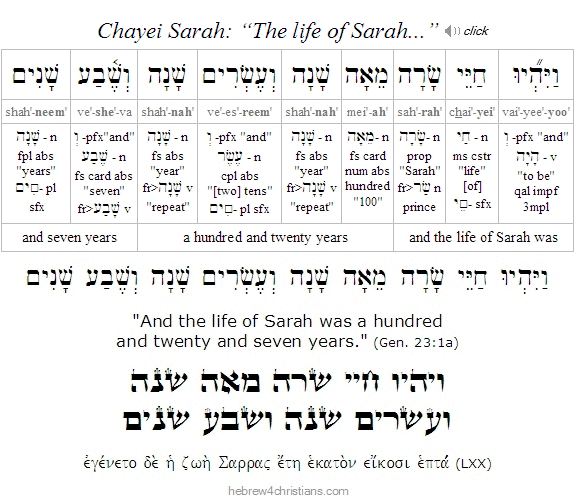 |
After Sarah was buried in Hebron, Abraham sought a wife for his son by commissioning his faithful servant Eliezer (whom Abraham had originally thought would be his heir), to go among his relatives living in Mesopotamia to seek for a bride for Isaac. Eliezer (i.e., אֱלִיעֶזֶר, lit., "My God will help") then set out on the 550 mile journey to Haran (also called the City of Nahor and the place where Abraham's father died), taking ten camels laden with gifts in search of a suitable woman. Providentially, and in answer to his prayer, as soon as Eliezer reached the city of Nahor he encountered Abraham's grand niece Rebekah drawing water at a well, where she graciously provided water for him and for his ten camels, thereby confirming that she was God's choice for Isaac.
Awaken to the Spirit...

11.15.19 (Cheshvan 17, 5780) "You do not know what spirit you are of..." (Luke 9:55). Yeshua's words imply that each of us has the responsibility to know ourselves (γνῶθι σεαυτόν), and to learn to endure (and overcome) the natural motives and focus of our hearts. We discover the truth of our spiritual condition in the midst of our daily frustrations, as we experience conflict, opposition, and the inner groan that arises from pressure and disappointment. Spiritual growth means learning to transcend our negative reactions, to stop cursing our conflicts, and to awaken to the blessings that surround and pervade our way. God's grace enables us to open our eyes so that we may "choose life and live" (Deut. 30:19). Our daily struggle with sin reveals the contradiction between the ideals of our faith and the spontaneous reactions of our heart.... We live in between the "is" and the "ought," the real and the ideal (though often we deny one or the other). The impulse to despair, to be angry, to complain and curse our experience can be transformed into an opportunity to pray, to ask God for help, and to refocus on what is real. This is the "hidden blessing" (ברכת סוד) of our troubles. When we learn to surrender to God's Presence, we can breathe in his peace and love, despite the grief we encounter over ourselves and others. When we come to the light, and do not deny the truth about our condition, we can honestly ask the LORD for healing (Heb. 4:16). When we seek for the good - and even bless the struggle - we express our trust that God will use our sorrow to help us grow and to bring beauty from our ashes (2 Cor. 7:10). Hashivenu: "Turn us back to you, O LORD, and we shall be turned..."
הֲשִׁיבֵנוּ יְהוָה אֵלֶיךָ וְנָשׁוּבָה
חַדֵּשׁ יָמֵינוּ כְּקֶדֶם
ha·shee·vei·noo · Adonai · e·ley·kha · ve·na·shoo·vah
cha·desh · ya·mey·noo · ke·ke·dem

"Turn us back to you, O LORD, and we shall be turned;
renew our days as of old."
(Lam. 5:21)
Hebrew Study Card

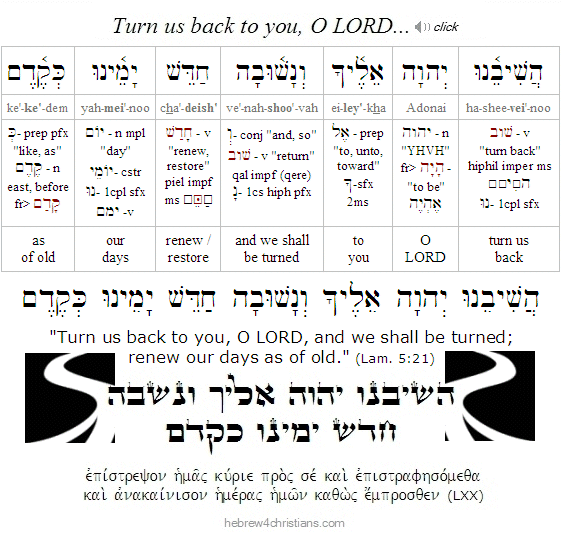
Again, our daily struggle with sin reveals the contradiction between the ideals of our faith and the spontaneous reactions of our heart. If we are able to find the courage, our failures and brokenness may be used by God to distill the intentions of the heart by helping us to be more honest with ourselves. We begin to realize that we are more vulnerable than at first we thought; that our faith is not as strong as we imagined, and that our motives are often mixed and unconscious. Illusions are striped away; idols crumble; deeper levels of selfishness are uncovered; the gap between our words and our deeds is exposed... It is one thing, after all, to intellectually think about faith or to idealize spirituality, but it is quite another to walk out faith in darkness. Yet it is only there, in the rawness of heart, that we discover what we really believe and how our faith makes traction with reality...
Keep the flame within your heart burning, friend... A sage once told a person struggling with his faith: "It is written that all creation was brought into being because of people like you. God saw there would be people who would cling to our holy faith, suffering greatly because confusion and doubt would plague them. God perceived that such would overcome these doubts and troubles of heart and remain strong in their belief. It was because of this that God brought forth all creation." Indeed, it was because of this that Yeshua our LORD suffered and died for you... Amen. Therefore never yield to despair, since that leads to further darkness and fear. Press on and keep fighting the "good fight" of faith (1 Tim. 6:12). Remember that you infinitely matter to heaven; your life has great value; you are significant and you are truly loved by our Heavenly Father. There is a "future and a hope" for you; there is "a white stone, and on that stone will be written a new name that no one can understand except the one who receives it" (Rev. 2:17). May "the trial of your faith, being much more precious than of gold that perishes, though it be tested with fire, be found to result in praise and glory and honor at the revelation to come" (1 Pet. 1:7).
"I am sure of this, that he who began a good work in you will bring it to completion (ἐπιτελέω) at the Day of Yeshua the Messiah" (Phil 1:6). The LORD is able to guard you (φυλάξαι) from stumbling and to present you blameless before the presence of His glory with great joy (Jude 1:24). "The LORD upholds all who are falling and raises up all who are bowed down" (Psalm 145:14). "He will sustain you to the end, guiltless in the Day of our Yeshua the Messiah" (1 Cor. 1:8). He who calls you is forever faithful; He will surely do it (1 Thess. 5:24). Yea, "the Lord is faithful (נֶאֱמָן הוּא): He will establish you and guard you against the evil one" (2 Thess. 3:3). The Spirit says, "Fear not, for I AM with you always."
Amen and Shabbat Shalom, chaverim...
Father of the faithful...

11.15.19 (Cheshvan 17, 5780) Abraham is the "father of all who believe" in the miracle of the Promised Seed (הזרע הבטיח), that is, in the Coming Deliver who would bring redemption and healing to the whole world (see Gal. 3:16; Rom. 4:1-5:1). The Torah states that God chose Abraham because he would faithfully teach his children to guard "the way of the LORD" (דֶּרֶךְ יְהוָה), by trusting in God's acts of "righteousness and justice" (צְדָקָה וּמִשְׁפָּט) that He would perform according to his promise (Gen. 18:19). God regarded Abraham as faithful to retain His promise, and therefore He would manifest salvation (יְשׁוּעָה) through his descendants. The "way of the LORD" refers to Yeshua, "the way and the truth and the life" (הַדֶּרֶךְ וְהָאֱמֶת וְהַחַיִּים), the Promised Seed that would crush the head of the serpent in the battle for our redemption. Abraham's faith was directed toward the Deliverer to come, as Yeshua said: "Abraham rejoiced to see my day; and he saw it and was glad" (John 8:56). Likewise we guard the way of the LORD as our father Abraham did – by trusting in God's promises given to us in Yeshua our Messiah.
We are chosen to embody the same heart, vision, and mission of Yeshua our LORD, to exist as "extensions of his presence" in this world, and therefore we are also called to walk uprightly, as he walked... Indeed, the Hebrew word derekh (דֶּרֶךְ), usually translated as "way," metaphorically refers to the journey, manner, or course of your life. Because God is tov v'yashar (good and upright), he teaches his children to be yesharim (יְשָׁרִים), i.e., those who walk uprightly. Indeed, the way of the LORD (דֶּרֶךְ יהוה) is "to do acts of charity and justice" (לַעֲשׂוֹת צְדָקָה וּמִשְׁפָּט) (Gen. 18:19). This is the "straight way" (derekh ha-yashar), or the "narrow path" that leads to life (Matt. 7:14).
טוֹב־וְיָשָׁר יְהוָה
עַל־כֵּן יוֹרֶה חַטָּאִים בַּדָּרֶךְ
tohv-ve·ya·shar · Adonai
al-kein · yo·reh · cha·ta·eem · ba·da·rekh


"Good and upright is the LORD
therefore will he teach sinners in the way."
(Psalm 25:8)

Note that the verbal clause "he will teach" (i.e., יוֹרֶה) used in this verse comes from the root yarah (ירה) -- the same root used in the word Torah (תּוֹרָה). Because the LORD is good and upright, He gives us Torah (direction) for our lives. God educates us for eternity by imparting to us moral and spiritual truth. As King David taught, "Happy is the man who delights in the Torah of the LORD and meditates upon it day and night" (Psalm 1:1-2).
God's Way of Deliverance...

[ The following entry is related to this week's Torah reading, parashat Vayera... ]
11.14.19 (Cheshvan 16, 5780) From our Torah portion this week we read, "Escape for your life. Do not look back..." (Gen. 19:17). You must turn away from what once defined you and never look back... This includes not only turning away from your former sins, but turning away from the guilt and shame of your sins... Living in the past, wallowing in your sin and regretting your mistakes, can cause you to feel worthless and even hopeless. If you feel compelled to revisit your former life, then be sure to do so before the foot of the cross, in light and presence of God's redemptive love for you. You can't change the past, but you can leave it behind by turning it over to God for healing. Teshuvah (repentance) means accepting who you are in light of God's love and salvation for your soul. "Brothers and sisters, I do not consider myself to have attained this, though I am single-minded: I forget the things that are behind and reach out for the things that are ahead ... heeding the upward call of God in Yeshua our Messiah" (Phil. 3:13-14). May you "find yourself in Him, not having a righteousness of your own that comes from the law, but that which comes through faith in Messiah, the righteousness from God that depends on faith" (Phil. 3:9).
God's way of deliverance is entirely different than man's way. Man tries to suppress the flesh, to cover it up, to justify its failings, or to enlist its power in the battle against sin (i.e., religion), but God's way is to remove the flesh from the equation. The goal is not to make us stronger and stronger, but rather weaker and weaker, until the flesh is "crucified" and only the sufficiency of the Messiah remains. Then we can truly say, "I have been crucified with Messiah. It is no longer I who live, but the Messiah who lives in me. And the life I now live in the flesh I live by faith in the Son of God, who loved me and gave himself for me" (Gal 2:20). The word "Hebrew" (עִבְרִי) means one who has "crossed over" (עָבַר) to the other side, as our father Abraham did (Gen. 14:13). It is on the other side of the cross that we experience the very power that created the universe "out of nothing" (i.e., yesh me'ayin: יֵשׁ מֵאַיִן) and that raised Yeshua the Messiah from the dead.
Identifying with the Lamb...

[ The following entry is related to this week's Torah reading, parashat Vayera.... ]
11.14.19 (Cheshvan 16, 5780) The near-sacrifice of Isaac establishes that God does not want us to sacrifice ourselves on the altar, but rather to identify with the appointed sacrifice of the lamb given on our behalf... Isaac pictures the identification process. First he completely submitted himself to God's will by being bound as a sacrifice. Once that decision was made, God intervened by providing the ram caught in the thicket, which represented the "binding" or identification of God's sacrifice for him (Gen. 22:13). Just as the lamb was identified with Isaac, so Isaac was identified with the lamb. Likewise, Yeshua died in your place so you can identify with his death for you, trusting it as your atonement provided by your Heavenly Father. Your union with Yeshua means that his death was your death: "For you have died, and your life is hidden with Messiah in God" (Col. 3:3). Likewise, his "life after death" (resurrection) is your eternal life: "When Messiah who is your life appears, you also will appear with him in glory" (Col. 3:4). Baptism symbolizes your identification with the death, burial, and resurrection of Yeshua as the Lamb of God sacrificed on your behalf (Col. 2:12; Rom. 6:4). Just as Isaac descended from the altar in newness of life, so we are made new creations because of the sacrifice of Messiah: "I have been crucified with Christ. It is no longer I who live, but Christ who lives in me. And the life I now live in the flesh I live by faith in the Son of God, who loved me and gave himself for me" (Gal. 2:20).
Of course we cannot crucify ourselves, but we trust that God finishes the work of Yeshua on our behalf... We "reckon" ourselves crucified with Messiah and trust in his work of salvation performed for our personal blessing. As it says: "So you also must consider yourselves dead to sin but alive to God in Yeshua the Messiah" (Rom. 6:11). Only after this can you present yourself as korban chai (קָרְבָּן חַי) - a living sacrifice - for God (Rom. 12:1; 1 Pet. 2:5).
There aren't two gospel messages: one for the sinner and the other for the saint... The message of salvation is always "good news" to those who are sin-sick and riddled with guilt and shame, and it is always "bad news" for those who deny their inner condition before God and believe that they can justify themselves. We never get beyond the call to "repent and believe the gospel" (Mark 1:15). We don't "get saved" in order to follow the path of self-righteousness; we get saved to be witnesses of God's righteousness... We love God because He first loved us (1 John 4:19).
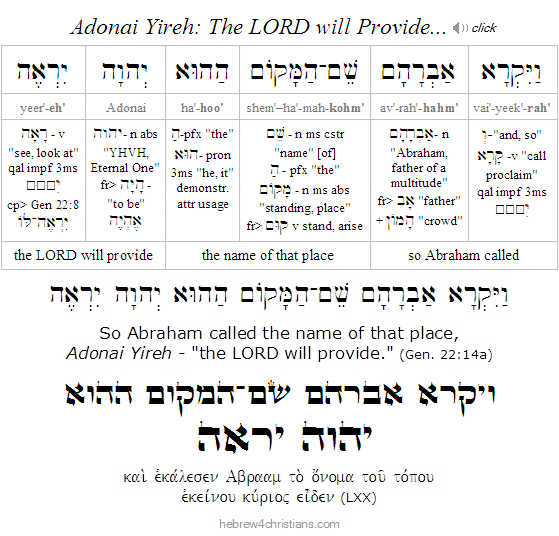 |
The Work of Faith...
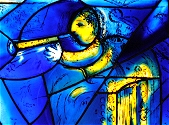
11.13.19 (Cheshvan 15, 5780) Our Torah for this week (Vayera) gives the account of the terrible test given to Abraham when God asked him to offer up his son as a sacrifice (see Gen. 22). The apostle James later said that Abraham was "justified by works when he offered his son Isaac upon the altar" (James 2:21), whereas the apostle Paul seemed to say just the opposite, that Abraham was not justified by works (see Rom. 4:1-3). So is there a contradiction here in our Bibles regarding the idea of "justification"? To answer this first understand that when James said that Abraham was justified "by works" he was referring to the work of faith and certainly not to the works of the law (מַעֲשֵׂי הַתּוֹרָה), since the Torah explicitly prohibited human sacrifice (Gen. 9:5), and furthermore the Angel of the LORD restrained Abraham's hand during the great test of faith (Gen. 22:12) thereby indicating that it was not God's will (i.e., Torah). On the other hand, the apostle Paul's seemingly contrary statement that Abraham was not justified by works refers to Abraham's unwavering trust in God's promise that his descendants would be as numerous as the stars in the heavens (Gen. 15:1-6). There is no real contradiction, then, since the two apostles were referring to two different historical episodes in their discussion of justification. Faith and works are two sides of the same coin: true faith will show up in your life and character. As Yeshua said, "This is the work of God, that you believe in the One whom He has sent" (John 6:29).
The life of faith is inherently paradoxical, as Kierkegaard noted: "Ethically speaking, what Abraham planned to do was to murder Isaac; religiously, however, he was willing to sacrifice Isaac. In this contradiction lies the very anguish that can indeed make anyone sleepless. And yet without that anguish Abraham is not the one he is. Neither would faith be what it is." Although Abraham understood that God must be obeyed, he also understood that human sacrifice was immoral, and hence his struggle represented the collision between the imperative of reason and the imperative of faith. Choosing to heed the voice of reason (i.e., the "ethical," the "universal") over the personal voice of God created a state of "fear and trembling" and a sense of being unable to communicate his passion and mission to others.
As Kierkegaard further commented: "Faith's conflict with the world is not a battle of thought with doubt, thought with thought. It is a battle of character. The person of faith is a person of character who does not insist upon comprehending everything. Now comes the conflict. The world insists that to believe what you cannot comprehend is not only blind obedience but obscurantism, stupidity, and so on. The world wants to alarm the believer against such foolishness. This is precisely why faith is a task for the person of character."
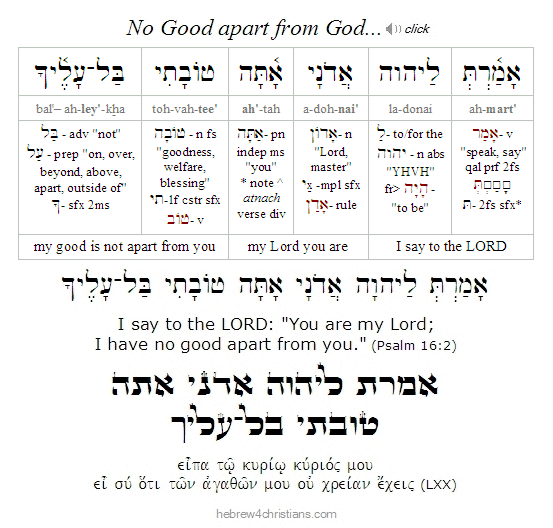 |
Note: In the Book of Hebrews we read: "By faith Abraham, when he was tested, offered up Isaac, and he who had received the promises was in the act of offering up his only son, of whom it was said, "Through Isaac shall your offspring be named." Abraham considered that God was able even to raise Isaac from the dead, from which, figuratively speaking, he did receive him back" (Heb. 11:17-19). The Greek text for "from which, figuratively speaking, he did receive him back" (i.e., ὅθεν αὐτὸν καὶ ἐν παραβολῇ ἐκομίσατο; Heb. 11:19b) seems to suggest Abraham believed (beforehand) that God would do a miracle and bring his son back from the dead after being sacrificed, though, of course, saying this does not mean it was therefore "easier" for him to go through with the sacrifice or that it required anything less than a complete surrender of his will to do God's will... The key phrase in 11:19b, however, has to do with receiving Isaac back, and the language here means that he did receive him back from the dead "symbolically" or "figuratively" (i.e., as a "parable").
The Sacrificed Seed...

[ The following entry is related to this week's Torah reading, parashat Vayera.... ]
11.13.19 (Cheshvan 15, 5780) "And Abraham took the wood of the burnt offering and laid it on Isaac his son. And he took in his hand the fire and the knife. So they went both of them together" (Gen. 22:6). Isaac was about 37 years old at this time and needed to understand what was being asked of him: "And Isaac said to his father Abraham, "My father!" And he said, "Here am I, my son." And he said, "Behold, the fire and the wood, but where is the lamb for a burnt offering?" (Gen. 22:7). This is the first word of dialog recorded over the three day journey... It is hard to imagine Isaac's pathos during this exchange. Abraham replied, "God will provide for himself the lamb for a burnt offering, my son." So they went both of them together (Gen. 22:8). Notice that the Hebrew could be read: "God will provide for himself the lamb for the burnt offering -- my son!" (ירְאֶה־לּוֹ הַשֶּׂה לְעלָה בְּנִי) - making it plain that Isaac would be offered upon the altar. The Torah then repeats, "and they both walked on together," indicating that Isaac accepted his sacrificial death in obedience to his father's will.
"And when they came to the place of which God had told him, Abraham built the altar there and laid the wood in order and bound Isaac his son (וַיַּעֲקד אֶת־יִצְחָק בְּנוֹ) and laid him on the altar, on top of the wood" (Gen. 22:9). According to the Talmud, Isaac asked his father to make the knots on his hands and feet tighter - not out of fear that he would change his mind and begin to resist - but in order to encourage his father to offer the sacrifice properly (Bereshit Rabbah 56:8). Like the Suffering Servant who would come after him, Isaac "set his face like a flint" to fulfill God's will (Isa. 50:7).
Isaac kept his eyes directed toward heaven as he lay tightly bound and motionless upon the altar. He awaited the final blow and wanted it to fall with trust and obedience within his heart. It was to be a shared sacrifice between the beloved son and his father. Finally "Abraham stretched out (שׁלח) his hand and took the knife to slaughter (i.e., לִשְׁחט, from shechitah) his son" (Gen. 22:10). The Talmud says that when Abraham "stretched out" his hand, he briefly looked at the knife to determine if it was ritually fit, and this delay was the precise moment when the Angel of the LORD (מַלְאַךְ יהוה) called out to him from heaven and said, "Abraham, Abraham!" (Gen. 22:11). (Note the repetition of the name "Abraham" during this second call.) According to various midrashim, when Abraham put his knife to his son's neck, Isaac's soul departed from him, but it returned when the Angel of the LORD said, "Do not lay your hand on the boy or do anything to him, for now I know that you fear God, seeing you have not withheld your son, your only son, from me" (Gen. 22:12). Abraham then immediately released Isaac and recited the blessing, "Blessed are You, LORD, who revives the dead" (בָּרוּךְ אַתָּה יהוה מְחַיֶּה הַמֵּתִים).
"I believe in You, O Holy One, though at times there no longer seems any reason for believing..." Here is Abraham, who counted the stars in hope, who trusted God for an heir, a promised son - and from this son another, and from that another, and another, until he envisioned his descendants "as the dust of earth" (Gen. 13:16; 15:5-6), and yet here is Abraham lifting up his knife to sacrifice his son, his beloved child, his promise, his future, his dream. Remember that Abraham did not know the end of the story before it began, and therefore his faith attested: "Though he slay me, I will trust in him."
Some people tend to "explain away" the passion of Abraham and Isaac by quoting the New Testament verse: "He [Abraham] considered that God was able even to raise him [Isaac] from the dead, from which, figuratively speaking, he did receive him back" (Heb. 11:19) -- as if this would make the sacrificial act any easier! Again we must bear in mind that neither Abraham nor Isaac knew "the end of the story" before they chose to obey God. As I've mentioned before, simply "knowing about" God is not the same thing as personally trusting Him with your life... This is the distinction between emunah (אֱמוּנָה) and bittachon (בִּטָּחוֹן). Simply knowing about God can lead to a sense of "distance," to theological abstractions, to dogmas and creedal formulas. Rabbi Bechaya put the distinction this way: "Everyone who trusts has faith, but not everyone with faith trusts." Bittachon is an intuitive awareness of the personal love of God for your life, coupled with complete trust that He cares for you (Rom. 8:28). It is an expectation that the love of God is for you, too, despite the test.
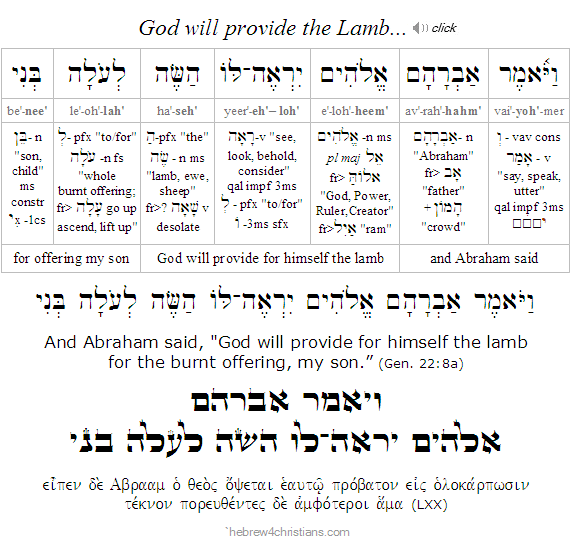 |
Note: For more see, "The Sacrificed Seed: Further thoughts about the Akedah."
Seeing beyond the Seen...

11.13.19 (Cheshvan 15, 5780) Some people assume that they are entitled to prosperity, good health, and happiness during their lives, and they are offended if they fail to attain these worldly ends. The apostle Paul admonished us to think spiritually about the meaning and purpose of life, particularly in light of omnipresent suffering... He wrote that our "momentary affliction" (θλῖψις) - that is, the cares and troubles of this life - work within us to attain an "everlasting glory beyond all comparison," and therefore we should focus not on present circumstances but on the deeper purpose, promise, and providence of God (2 Cor. 4:17-18). The visible fades away, the spiritual endures; our mortification leads to everlasting life, and that which is hidden will be manifest... But how do we learn to see what is invisible more vividly than that what we see with our eyes? Are we to deny or minimize all the suffering and pain we see and experience in this life, perhaps by regarding it as an illusion of some sort? Not at all. The problem of suffering is a real symptom of the deeper problem of death and decay. Everything is passing away; all is dust in the wind - "havel havelim" (i.e., vanity of vanities). Life in this world is "being unto death," a journey through the shadows of loss to inherit eternity. We are strangers here; nothing abides; there is no lasting prospect (1 Chron. 29:15). Instead of discounting suffering we acknowledge its pervasiveness: we realize that death is a real problem -- indeed it is the central problem of life -- and therefore we see through vanity, transience, loss and even grief to reach for divine healing, comfort, permanence, and eternal life. We are outsiders to this world; we are away from our true home, crying out for what we need most of all, namely the loving presence of our LORD.
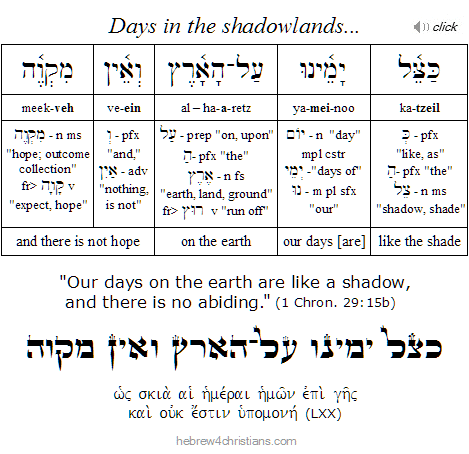 |
We must learn to find our sense of belonging and place within the heart of God. Striving to find our happiness in this life can entice us to lose ourselves in "olam ha'sheker" (עוֹלם השׁקר) -- the world of falsehood with its superficial satisfactions. Indeed, if we impatiently attempt to assuage our pain we may suffer further loss and our despair may grow deeper still, since our hunger for healing is an inner cry for healing love that only God can truly provide. Each soul is created with a radical sense of "aloneness," since - despite our closest relationships with other people - each of us comes into this world alone and will die alone... This sense of aloneness is a built in "hunger" for connection with God's presence. On the other hand, when we look to other things to meet our need for God, we invariably fall into the chaos and destruction of idolatry. To be healed from such counterfeit comfort we must "go through the wound" of our inner emptiness to find the divine consolation, and from there we will be given the heart to give of ourselves freely and without ambiguity.
מִי־לִי בַשָּׁמָיִם
וְעִמְּךָ לא־חָפַצְתִּי בָאָרֶץ
mee-lee · va·sha·ma·yeem
ve·ee·me·kha · loh-cha·fahtz·tee · va·ah·retz

"Whom have I in heaven but you?
And beside you I desire no one on earth."
(Psalm 73:25)

Download Study Card
The Sins of Sodom...
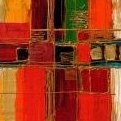
11.12.19 (Cheshvan 14, 5780) From our Torah this week (Vayera) we read: "And the LORD said, 'The outcry of Sodom and Gomorrah is indeed great, and their sin is exceedingly grave...'" (Gen. 18:20). But what was the sin of Sodom and Gomorrah? Why did God destroy the two cities? Was it because the people there refused to show hospitality to the angelic visitors (as claimed by some), or was it because of some ongoing sin of the people?
Though the sin of Sodom undoubtedly included the practice of sexual perversion (called "strange flesh" in the Book of Jude), such behavior was symptomatic of a nihilistic culture that glorified violence, despised moral authority and spiritual truth, and practiced the exploitation of others. Throughout the Scriptures "Sodom" symbolically represents gross immorality, depravity, and inevitable judgment from heaven. For example, the prophet Ezekiel later wrote of Judah: "Behold, this was the guilt of your sister Sodom: she and her daughters had arrogance, abundant food, and careless ease, but she did not help the poor and needy. Thus they were haughty and committed abomination (תּוֹעֵבָה) before me; therefore I removed them when I saw it" (Ezek. 16:49-50). The New Testament refers to the fate of Sodom as "a fearful example of the everlasting fire of retribution" (Jude 1:7) -- the destructive result of spiritual anarchy, lawlessness, deviancy, perversion, and trauma (2 Pet. 2:6-10). Thankfully there is real hope for those who seek to escape from the wrath to come by turning to God and trusting in his healing power of salvation, though it is only a "remnant" that seek such deliverance (Matt. 7:14). Speaking of the final salvation of Israel, the Apostle Paul quotes Isaiah: "If the LORD of Hosts hadn't left us a few survivors, we'd be as desolate as Sodom, doomed just like Gomorrah" (Isa 1:9; Rom. 9:29).
In this connection it should be noted that the word "sodomy" involves any form of violence, perversion, exploitation, or lawless expression of sexuality regardless of gender... In general, it is more helpful to think of it as a code word for egregious sin, "in-your-face" spite toward God, defiant immorality that celebrates spiritual anarchy, moral nihilism, and death... Adultery, fornication, sexual perversions, viewing pornography (i.e., the lust of the eyes), covetousness, gluttony, arrogance (idolatry), unbridled anger (rage), sloth, worshiping the things of this world (i.e., fads, trendy TV shows, sports idols, the world's value system), and so on, all may be called "sodomy." Whenever we consider such things, it is better to look at how we are healed rather than what makes us sick.... The answer in every case to the trauma of the sinful heart is to turn to God and ask for deliverance in the name of Yeshua.
For more on this see, "The Sins of Sodom: Further thoughts on parashat Vayera."
The Divine Presence...

11.12.19 (Cheshvan 14, 5780) God told Moses that his Name means that He is Present (הֹוֶה) in every moment - past, present, and future (הָיָה וְהוֶה וְיָבוֹא). The Name YHVH (יהוה) is "shorthand" for "I AM with you always" (אָנכִי אֶהְיֶה עִמָּכֶם). There is no moment in time, just as there is no place, where God is not "there" for us. This includes times of testing, darkness, and even death itself (Psalm 23:4). The LORD our God does not abandon us, even when He seems hidden, powerless, or unwilling to intervene. Faith trusts that He is present there, in moments when we are vulnerable, weak, afraid, and seemingly all alone, and that all things are bound up in his love and good will toward us... Faith receives God as always present, the substance of our hope and dream of eternal healing and eternal life.
The function of a name is to point to or signify reality... When we are in the hardest of moments, we don't worry about the morphology, phonetics, or linguistics of God's Name, but we rather call out and hunger for His Presence, Love, and Light. We are like little kids crying for our father. It is vanity and pride that makes people hardhearted regarding such matters. The Spirit of God speaks words of life to those who need to hear them.
 |
Resurrection and Life...
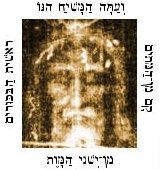
11.12.19 (Cheshvan 14, 5780) "I am the resurrection and the life. Whoever believes in me, though he die, yet shall he live, and everyone who lives and believes in me shall never die. Do you believe this?" (John 11:25-26). We are healed from the "sickness unto death," that is, the lethal condition of spiritual death, not by our own personal righteousness or wisdom, but by the miracle of God, a supernatural intervention that does not derive from anything within ourselves. We come into this world spiritually "still born," and unless we receive the miracle of life from above, we remain spiritually cut off, dead while seemingly alive, a shadowy consciousness trapped in illusion... True life is given in relationship with Yeshua, for apart from him we can do nothing (John 15:5). Therefore we must first believe God for the blessing, since we are powerless to change or heal ourselves (Job 14:14). When we turn to God in brokenness, confessing the truth of our need for deliverance, appealing to the life given in exchange for our own, we begin to come alive. "It is no longer 'I' who live; your true life is "hidden" with God, and what is most real about you is part of the unseen realm (Gal. 2:20-21; Col. 3:1-5; 2 Cor. 5:17). Faith is a matter of "catching up" with the miracle. Pride recoils at these considerations because it always insinuates that there is something we must do to commend ourselves before God. Yet even faith itself is a gift, so all that remains is for us to live in the light of truth, accepting the blessing even in the midst of the world system and its practiced darkness. This all sounds so simple, yet that is because we focus on the words rather than the power of the words; we look at what appears rather than the deeper substance the words signify...
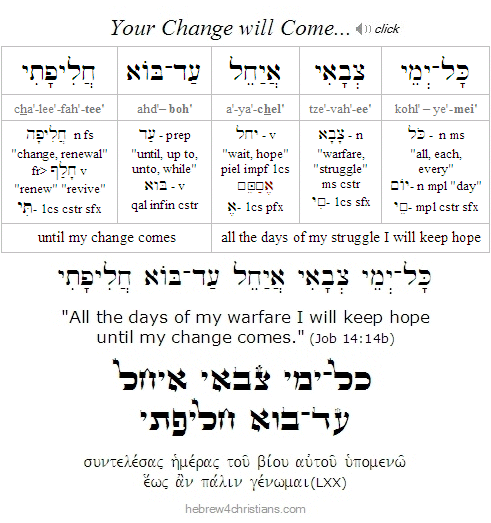 |
The words of Messiah are received by faith or they are not received at all.. To think that Yeshua came to be a teacher of worldly wisdom, an ethical teacher, is a category mistake...
Light in the Darkness...
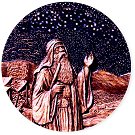
11.11.19 (Cheshvan 13, 5780) It has been said there are two basic modes of exercising faith: "believing that" and "believing in." Believing "that" regards God an object of knowledge or information - a "fact" that affects the way we reason and think about life; its mode is that of assent, or affirmation of what is real... There is nothing wrong with this mode of faith, since objective truth is necessary for salvation and doctrine is important. However, there is a deeper mode of faith that "believes in" God, that is, that encounters God existentially, relying on him to keep his promises, trusting him for life despite our temptation to despair. Believing "in" God wagers everything on God's care and love, regardless of the present suffering. It goes beyond the rational realm of attempting to understand God by means of human reason into the realm of trusting God for unseen healing to come. This sort of faith "sees the unseen" by means of relating to God despite the darkness and ambiguities of life. Such faith appears foolish to the worldly wise, but by it is manifest the power of God. Believing in God is intensely relational and "subjective" in the sense of being a matter of the heart. Such faith is exercised "in secret" place where your heavenly Father sees (Matt. 6:6). "Yeshua, I believe in you for my pain, my sorrows, my wounds, as well as for my healing, my joys, and my comfort."
The Torah states that Abraham "believed in the LORD (וְהֶאֱמִן בַּיהוָה), and it was counted to him as righteousness" (Gen. 15:6; Rom. 4:3). This was not merely believing that God could do whatever God wanted, but rather believing in God's character and promise, despite the "natural" objections presented by carnal human reasoning. This is an emotional believing - a decision to trust that took Abraham right into the heart of God. This is "panim-el-panim" (face-to-face) believing -- believing "into" God that marks a journey, a crossing over from death to life... Indeed the LORD "gives life to the dead and calls into existence the things that do not exist (καλοῦντος τὰ μὴ ὄντα ὡς ὄντα). In hope Abraham "believed against hope" that he should become the father of many nations, as he had been told, "So shall your offspring be." Paradoxically, Abraham's faith was "opposed to hope" (παρ᾽ ἐλπίδα) in its objective reference but was "based in hope" (ἐπ᾽ ἐλπίδι) in its subjective reference. "Not having been weak in the faith, he did not consider his own body already as dead (for the outer man perishes) nor the deadness of Sarah's womb; at the promise of God he did not stagger in unbelief but was strengthened in faith, having given glory to God, and having been fully persuaded that what the LORD had promised he would also to do" (Rom. 4:17-21).
Withering Heights...

11.11.19 (Cheshvan 13, 5780) One who is proud and haughty is like one who denies the existence of the LORD, as it is written: "And your heart will become haughty (וְרָם לְבָבֶךָ) and you shall forget the LORD your God who brought you out of the house of slavery" (Deut. 8:14). Note that the Hebrew word for "forget" (i.e., shakhan: שָׁכַח) can mean to wither (ξηραίνω) and become useless (John 15:6, James 1:11). As it is written in Psalm 137:5, "If I forget you (אֶשְׁכָּחֵךְ), Jerusalem let my right hand wither (תִּשְׁכַּח)." Therefore we see that pride is the original sin itself, denying the very First Commandment itself: "I am the LORD thy God (אָנכִי יְהוָה אֱלהֶיךָ) who brought you out from the land of Egypt, from the house of slavery" (Exod. 20:2). Exalting the ego by "forgetting" about the LORD - that is, by suppressing the truth of His reality, power, and glory - invariably leads to inward withering. Just as the ego attempts to "puff itself up" and to enlarge itself, so forgetting about God leads to a corresponding withering of soul, a diminution of heart. This is yet another example of the spiritual principle: "the first shall be last and the last shall be first" (Mark 9:35; Matt. 20:25-26).
אָנכִי יְהוָה אֱלהֶיךָ
אֲשֶׁר הוֹצֵאתִיךָ מֵאֶרֶץ מִצְרַיִם
מִבֵּית עֲבָדִים
a·no·khee · Adonai · e·lo·hey·kha
a·sher · ho·tzei·tee·kha · mei·e·retz · meetz·ra·yeem
mee·beit · a·va·deem

"I am the LORD your God,
who brought you out from the land of Egypt,
from the house of slavery." (Exodus 20:2)

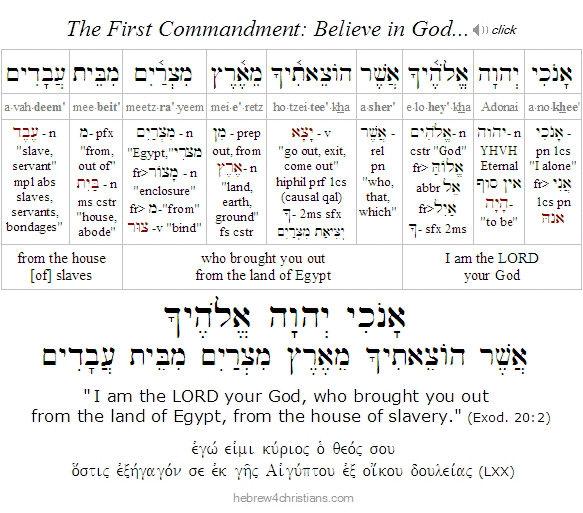
Yeshua said to his disciples, "without me you can do nothing" (John 15:5), which means that apart from what comes from our connection with him, nothing of eternal significance will result from our lives.... So long as we are full of ourselves, we will wither, dry up, and become like chaff in the wind (John 15:6). The first thing that faith requires therefore is that we do not feel secure or presumptuous but cling to our Lord in reverence and humility. We all have our personal Egypt, our desert, our time of being brought low so that we can remember that God alone has the power to rebuild us by means of His grace. Suffering, afflictions, and yissurim reveal to us our nothingness of our false greatness, and therefore they teach us to modestly and humbly ask for God's deliverance. May LORD our God help each of us humble ourselves so that we can grow in our connection with his life, beholding His glory...
Clear thinking and Sanity...

11.11.19 (Cheshvan 13, 5780) Since we all necessarily must think in order to live, we should value clear thinking. This should be obvious enough, though people often make various errors and misjudgments because they devalue the effort required to carefully reason through a question. Indulging in lazy habits of thought such as jumping to conclusions, making hasty generalizations, stereotyping, not making the effort to look for evidence, ignoring personal bias, confusing subjective opinion with fact, and so on, are widely practiced today. As William James once said, "A great many people think they are thinking when they are merely rearranging their prejudices." Sadly, however, it is common today for many people to experience emotional outrage because they are unwilling to slow down and think clearly. Instead of humbly considering that other people may have good reasons for thinking differently than they do, they are so puffed up and full of themselves that they seem incapable of questioning their own assumptions, and therefore they lash out - sometimes even violently - at those who dare question their self-supposed "infallibility." Such solipsistic intolerance is the result of ignorance, vanity, and prejudice - and is a direct result of the neglect of the study of logic, language, and the pursuit of truth. The postmodern world today abides in an intellectually dystopian world of naturalistic "immanence" and selfishness. Transcendence has been banished from the realm of serious discussion, leaving a vacuum of meaning and purpose. The great character virtues that once we celebrated, for example, the heart qualities of humility, modesty, honesty, fairness, honor, courage, loyalty, compassion, and so on, have been suppressed and redefined out of existence, and today we see hollowed out souls with dead eyes and unfeeling hearts. The apostle Paul forewarned that the character of people living near the "end of days" would be fierce and cruel, arrogant despisers of truth, heady and "high-minded" - the Greek word (τυφόω) means blinded by conceit, crazed, deranged, and of unsound mind (2 Tim. 3:1-5; Rom. 1:28).
The mind is the "gateway" to your heart, and therefore it is essential to guard your thinking by immersing yourself in the truth. If the denial of truth leads to insanity (i.e., delusion, incoherence, absurdity, falsehood) and therefore to the disintegration of the soul, then sanity means becoming grounded in the truth of what is real, and a "sound mind" (σωφρονισμός), means being "healed" from inner contradiction and fragmentation (2 Tim. 1:7). Indeed the Greek word "sound mind" (σωφρονισμός) comes from the verb sodzo (σῴζω) meaning "to save," from saos (σάος), "safe," meaning under the bounding influence of the Spirit of God.
But is knowing truth possible? According to both the light of reason and the testimony of Scripture, genuine knowledge is possible. The truth about God is always available to human beings, if they are willing to look for it. The Divine Light that was created before the sun and the stars represents God's immanent presence that "lights up" all of creation - including our minds (Gen. 1:3). As Paul stated, "the invisible things of Him from the creation of the world are clearly seen so that people are without excuse" (Rom. 1:19-20). The heavens are constantly attesting to the reality of God's handiwork (Psalm 19:1). All of creation "shouts out" that there is a God. Even small children understand this.
The witness of God's truth is foundational to all of our thinking as well. If you regress far enough in a chain of reasoning, you will always encounter first principles, intuitions, axioms, and "apprehensions" of the laws of thought. This is how language works, or rather, how our mind necessarily discovers truth about reality. For example, the law of contradiction (or identity) is not discovered in experience, but is brought to experience by the operation of the mind. All reasoning is ultimately grounded on foundational first principles that are regarded as self-evident and that are known through the light of the mind itself. Even the pagan Greeks understood this. For instance, Aristotle said that both deduction and induction ultimately were based on the "intuitive grasp" of first principles of thinking itself:
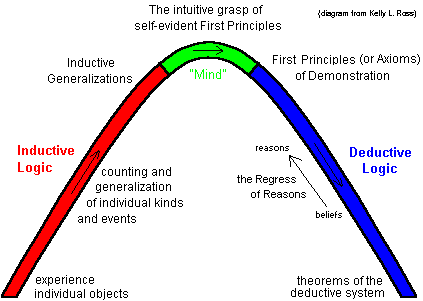 |
It's important to realize that no one "invented" the rules of logic (such as the law of identity, the law of contradiction, valid rules of inference, etc.); no, these axioms are presupposed in all forms of intelligible thinking about anything at all. In other words, God created the mind so that true thinking is possible. If you are reading these words, you are presently using logic. You are identifying and combining letters, interpreting their meaning, making connections and comparisons, and therefore making inferences. There is no way to argue that logic is "artificial" or culturally relative. No one can consistently use logic to argue against its universal validity. The revelation (not the invention) of logical first principles is part of God's "signature," if you will, of how the mind is wired to correspond to reality. Reason discovers order in the universe but does not create it ex nihilo. If you deny this, you have opted out of the realm of thought altogether and entered the realm of the absurd.
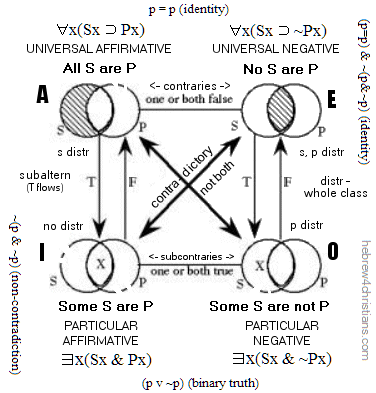 |
Likewise we have intuitive awareness regarding the existence of moral truth (i.e., the standard of justice and moral law), aesthetic truth (i.e., ideals of beauty, goodness, worth, and love), metaphysical truth (i.e., cause and effect relationships), and so on. Even scientific truth is based on principles that transcend the discipline of science itself (for example, the assumption that knowledge is "good" and should be obtained is not an empirical statement). The human mind naturally uses these sorts of categories in its thinking all the time, but each of these are ultimately derived from the rational mind of God Himself.
We are responsible to walk in the Spirit of truth and to reject what is false (1 John 4:6). This implies that we have a moral and spiritual duty to think clearly and not abuse our minds (Phil. 4:8; Rom. 12:2). God Himself helps us to do this: "I will ask the Father, and he will give you another Helper (παράκλητος, someone "called to one's side"), to be with you forever, even the Spirit of Truth (רוּחַ הָאֱמֶת), whom the world cannot receive, because it neither sees him nor knows him" (John 14:16-17). God gives us the Spirit of Truth so that we can know the truth about His salvation and to "discern what is the will of God, what is good, acceptable, and perfect" (Rom. 12:2). Truth is connected to memory - both in our personal histories as well as the history of God's redemptive actions performed on our behalf. Hence we are constantly commanded to remember what God has done for us. Similarly, the Spirit of Truth brings to remembrance the words of Yeshua to our hearts (John 14:26).
Followers of Yeshua are commanded to love the truth and to think clearly about their faith. The ministry of reconciliation itself is defined as "the word of truth, by the power of God, through weapons of righteousness" (2 Cor. 6:7). Indeed, the word of truth (τὸν λόγον τῆς ἀληθείας) is a synonym for the "gospel of salvation" itself (Eph. 1:13; Col. 1:5; James 1:18). We are saved by Yeshua, who is the "way, the truth, and the life" (John 14:6). God commands all people to believe this truth (Acts 17:30-31; 1 Tim. 2:4). People perish because "they refuse to love the truth and so be saved" (2 Thess. 2:10-12). Therefore we see that the issue of truth is central to salvation itself....
Note: For more about this topic see the article, "Logical Assumptions and Axioms."
Yeshua warned us that the love of many would grow "cold" (i.e., ψύχω, "to flicker out, wane, extinguish, dissipate") in the latter days (Matt. 24:12), suggesting not so much the absence of fierce passions (which on the contrary would be unrestrained, see 1 Tim. 3:1-4) but manifesting the depravity that results from being "out of alignment" with moral and spiritual reality... The hedonist, the lover of the vanities of this world, is an impaired soul, a soul deluded by disordered loves, a disfigured being marked by an "ontological inappropriateness" to the revelation of life itself... The "narrow gateway of life" (שַּׁעַר אֶל־הַחַיִּים) is found only by the few (Matt. 7:13-14), and Yeshua doubtlessly said this to reprove the mob mentality that regards unthinking "tolerance" as the greatest of all virtues and moral conviction as the greatest of all evils ("fanaticism").
God Provides the Lamb... (פרשת וירא)
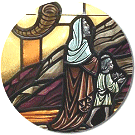
11.10.19 (Cheshvan 12, 5780) Our Torah reading for this week (Vayera) is very dramatic and extraordinarily prophetic. Among other things it includes what I have called the "Gospel according to Moses," or rather Moses' account of how Abraham was tested by God to offer his "only begotten son" (בֵּן יָחִיד) Isaac as a sacrifice on Mount Moriah -- the place of the future Temple. This famous story is referred to as the Akedah (עֲקֵדָה), or Akedat Yitzchak (עֲקֵידָת יִצְחָק) - the "binding of Isaac" (Gen. 22:1-18). At the very last moment, the Angel of the LORD stopped Abraham from going through with the sacrifice and provided a ram as a substitute. Abraham then named the location Adonai-Yireh (יהוה יִרְאֶה), "the LORD will provide/see" (from the 3ms imperfect of the verb ra'ah (רָאָה), "to see"). The binding of Isaac perfectly illustrates both the principle of sacrificial love and the principle that we must first unreservedly believe in that love in order to understand the ways of the LORD.
Those who believe in Yeshua understand the Akedah as a foreshadowing of the ultimate sacrifice the heavenly Father would give on our behalf. Unlike Abraham, God the Father actually offered His only begotten Son (בֵּן יָחִיד) at Moriah in order to make salvation available for all who will believe (John 3:16-18; 1 John 4:9). As Abraham himself confessed: אֱלהִים יִרְאֶה־לּוֹ הַשֶּׂה / Elohim yireh-lo haseh ("God will provide for himself the lamb").
אֱלהִים יִרְאֶה־לּוֹ הַשֶּׂה לְעלָה בְּנִי
e·lo·heem · yeer·eh-loh · ha·seh · le·oh·lah · be·nee

"God will provide for himself the lamb for the burnt offering, my son."
(Gen. 22:8)


As I've mentioned over the years, the very first occurrence of the word love in the Scriptures (i.e., ahavah: אַהֲבָה) refers to Abraham's love for his "only" son who was to be sacrificed as a burnt offering on Moriah (the very place of the crucifixion of Yeshua), a clear reference to the gospel message (Gen. 22:2; John 3:16). Some scholars have noted that the word ahavah comes from a two-letter root (הב) with Aleph (א) as a modifier. The root means "to give" and the Aleph indicates agency: "I" give (i.e., the Father gives). Love is essentially an act of sacrificial giving... The quintessential passage of Scripture regarding love (αγαπη) in the life of a Christian is found 1 Corinthians 13: "Love seeks not its own..."
Whereas the Akedat Yitzchak foreshadowed God's provision for the coming Temple, the Akedat Yeshua (i.e., the crucifixion of Yeshua at Moriah) was the altar where the justice and chesed (love) of the Father fully met (Psalm 85:10). For more on this incredibly rich subject, please see the articles, "The Passion of Isaac" and "The Sacrificed Seed."
God's Everlasting Love...
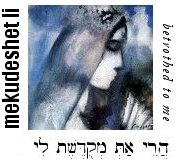
11.08.19 (Cheshvan 10, 5780) It is written in our Scriptures: "In Him (i.e., Yeshua) we have obtained an inheritance (i.e., yerushah: יְרוּשָׁה, from which we have "Jerusalem"), decreed beforehand (i.e., προορισθέντες) according to the purpose of the One who works all things according to the counsel of His will" (Eph. 1:11). This teaches us the "Torah of Providence" (תּוֹרַת קְדוּמָה) -- that God has loved us without beginning, before the foundation of the world, "from the days of eternity" (מִקֶּדֶם מִימֵי עוֹלָם) -- and therefore we can trust in the outworking of his promises and his invincible will. Indeed nothing can thwart or overrule God who is the Master of all possible worlds. In everything - including human reason itself - the LORD God Almighty is preeminent and works all things together for good (Rom. 8:28). This implies that there is an "original blessing" before the "original sin" wherein God chose us to know the truth and blessing of his love. As it is written: "I have loved you with an everlasting love (i.e., ahavat olam: אַהֲבַת עוֹלָם): therefore with lovingkindness (i.e., chesed: חֶסֶד) have I drawn you (Jer. 31:3). Note that the Hebrew verb translated "I have drawn you" comes from the word mashakh (מָשַׁךְ), meaning to "seize" or "drag away" (the ancient Greek translation used the verb helko (ἕλκω) to express the same idea). As Yeshua clearly said, "No one is able to come to me unless he is "dragged away" (ἑλκύσῃ) by the Father (John 6:44). God's chesed seizes us, scandalizes us, takes us captive, and leads us to the Savior. Therefore understand that there has never been a time when you were not loved by God, and that it has always been true that God knows and loves you, friend. Shabbat shalom.
מֵרָחוֹק יְהוָה נִרְאָה לִי
וְאַהֲבַת עוֹלָם אֲהַבְתִּיךְ
עַל־כֵּן מְשַׁכְתִּיךְ חָסֶד
me·ra·chok · Adonai · neer·ah · lee
ve·a·ha·vaht · oh·lahm · a·hav·teekh
al · kein · me·shakh·teekh · chah·sed

"The LORD appeared to me from far away.
I have loved you with an everlasting love;
therefore with lovingkindness I have drawn you."
(Jer. 31:3)

Hebrew Study Card
Justification by Faith...

[ The following entry is related to this week's Torah reading, parashat Lekh-Lekha.... ]
11.08.19 (Cheshvan 10, 5780) "And he believed in the LORD, and He counted it to him as righteousness" (Gen. 15:6). We are made right with God by trusting in his promises. The Talmud (Makkot 23b-24a) says, "Moses gave Israel 613 commandments, David reduced them to eleven (Psalm 15), Isaiah to six (Isaiah 33:15-16), Micah to three (Micah 6:8), Isaiah reduced them again to two (Isaiah 56:1); but it was Habakkuk who gave the one essential commandment: ve'tzaddik be'emunato yich'yeh (וְצַדִּיק בֶּאֱמוּנָתוֹ יִחְיֶה), literally, "the righteous one, by his trust, shall find life" (Hab. 2:4). The New Testament likewise distills the various commandments to the principle that we find life by trusting in God (see Rom. 1:17, Gal. 3:11, and Heb. 10:38). Spiritual life is the blessing of faith, since apart from faith we are spiritually dead and "powerless (ἀδύνατος) to please God" (Heb. 11:6). As King David said, "The LORD is near to all who call upon Him - to all who call upon Him in the truth" (Psalm 145:18). God is near to the honest soul who confesses the truth about his need, just as God distances himself from the proud and puffed up soul:
הִנֵּה עֻפְּלָה לא־יָשְׁרָה נַפְשׁוֹ בּוֹ
וְצַדִּיק בֶּאֱמוּנָתוֹ יִחְיֶה
hee·ney · oo·pe·lah · loh · ya·she·rah · naf·sho · boh
ve·tza·deek · be·e·moo·na·toh · yee·che·yeh

"Look at the proud person: his soul is not right within him;,
but the righteous one will live by his faith." (Hab. 2:4)
Hebrew Study Card

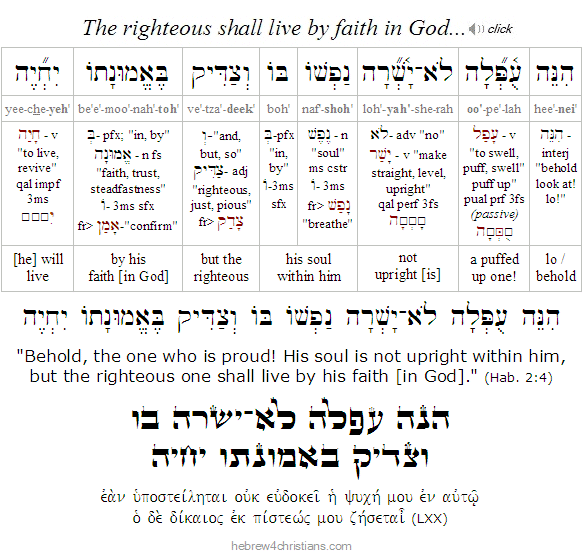 |
Recall that the people of Israel were redeemed because they trusted in the promise of their deliverance, as it is written, "and the people believed (וַיַּאֲמֵן הָעָם) and bowed their heads" (Exod. 4:31). Faith is the essence of all true Torah from heaven, since apart from it no one can possibly find spiritual life (Heb. 11:6). This is why the first commandment is simply, "I AM the LORD thy God..." (Exod. 20:2). We start here, by trusting that the LORD is our God, since without that, nothing else follows.
The very purpose of creation is to know the love of the blessed Creator, and consequently whoever disregards or suppresses this truth fails to apprehend the essential reason for his or her existence. The meaning or message of reality itself is revealed and grounded in God's great love (1 John 4:8). Like the precious promises of a bridegroom to his beloved, the words of Scripture are to be kept in the "midst of the heart" where they serve as a source of life (Prov. 4:21-22).
Perseverance and Focus...
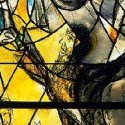
11.07.19 (Cheshvan 9, 5780) The journey of faith involves kavanah (כַּוָנָה), or focus; we are to "press on" (διώκω) to hear the upward call of God (Phil. 3:14). The problem for many of us is that we are irresolute, indecisive, and therefore we hesitate... A divided heart is at war within itself, "two-souled" (δίψυχος) and unstable in all its ways (James 1:8). If "purity of heart is to will one thing," then impurity of heart is the result of simultaneously willing two things... It is therefore a state of inner contradiction, of having two separate "minds" or "wills" that hold contrary thoughts or desires. Yeshua said that "a divided house cannot stand." May it please God to heal us of such ambivalence by making our hearts whole, resolute, steadfast, full of conviction, and entirely awake to the glory of His Presence at our right hand (Psalm 16:8). The LORD is always near; he is not far from each one of us. "Draw near to God (ἐγγίσατε τῷ Θεῷ) and he will draw near to you; purify your hearts, you double-minded" (James 4:8). As it is written: "The LORD is near to all who call on Him, to all who call on Him in truth" (Psalm 145:18).
קָרוֹב יְהוָה לְכָל־קרְאָיו
לְכל אֲשֶׁר יִקְרָאֻהוּ בֶאֱמֶת
ka·rohv · Adonai · le·khol · ko·re·av
le·khol · a·sher · yeek·rah·oo·hoo · ve·e·met

"The LORD is near to all who call out to him,
to all who call out to him in truth."
(Psalm 145:18)


May we be set free from lesser fears that divide the heart and rob the soul of shalom shelemah, God's perfect peace (Isa. 26:3). Amen, chaverim...
Endurance to Hope...

11.07.19 (Cheshvan 9, 5780) Though we are optimistic about the purpose and end of reality, and though we trust that God "works all things together for good" (Rom. 8:28), we nevertheless experience hardship and troubles during our sojourn to the "heavenly city..." We are comforted by the "exceedingly great and precious promises" given by God, yet we still suffer and experience pain, heartache, and sundry afflictions. Yeshua said "in this world you will have tribulation" (בָּעוֹלָם צָרָה לָכֶם), but that is not the end of the story, for there is the cheer of God's' healing coming, even if we must repeatedly ask God for grace to endure our troubles without murmuring (John 16:33; Heb. 4:16). I realize that is often difficult, and some of you might be within the fiery furnace even now. You might be asking, "Where are you, Lord, in all of this? Why don't you bring me out of these sorrows?" In such testing you need endurance (ὑπομονή) to hold on to hope, remembering that God uses affliction to refine you for good. As Paul said, "We rejoice in our sufferings, knowing that suffering produces endurance, and endurance produces refined character, and refined character produces hope" (Rom. 5:3-4). Each of us is still upon the "Potter's wheel," and God's hand continues to shape us into vessels that one day will reveal his glory and honor. For Yeshua's people, "all is well and all manner of thing shall be well." Meanwhile, "the LORD will give strength to his people; the LORD will bless his people with peace" (Psalm 29:11).
יְהוָה עז לְעַמּוֹ יִתֵּן
יְהוָה יְבָרֵךְ אֶת־עַמּוֹ בַשָּׁלוֹם
Adonai · ohz · le·am·moh · yeet·tein
Adonai · ye·va·rekh · et · am·moh · va·sha·lohm

"The LORD will give strength to his people;
The LORD will bless his people with peace."
(Psalm 29:11)
Hebrew Study Card

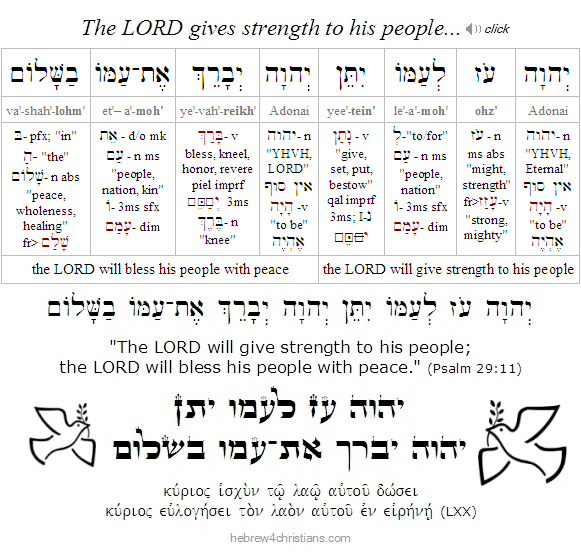
Keep holding on, dear friends! The Lord our God is faithful and true. He gives us acharit ve'tikvah (אַחֲרִית וְתִקְוָה), "a future and a hope" (Jer. 29:11).
Father of all who believe...
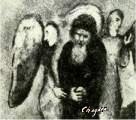
[ The following entry is related to this week's Torah reading, parashat Lekh-Lekha.... ]
11.07.19 (Cheshvan 9, 5780) Abraham is traditionally regarded as the first Jew, but understand that he began life as a "Gentile," the son of an idolater (Josh. 24:2), who later heard God's voice and then began his pilgrimage of faith into the realm of promise (Heb. 11:8-11). Moreover, God personally chose Abraham and promised to make him into a blessing while he was yet uncircumcised, and it was only later, after he sacrificed his beloved son Isaac (i.e., the Akedah) that he was promised that in his Seed (זֶרַע) would all the nations of the earth be blessed (Gen. 22:18). It was the faith of Abraham - especially as demonstrated by the Akedah - that prefigured the justification of the nations through faith. This is the "Gospel of Moses" which Yeshua alluded (John 5:46). Therefore we read: "And the Scripture, foreseeing (προοράω) that God would justify the nations by faith, proclaimed the gospel beforehand to Abraham, saying, "In you shall all the nations be blessed" (Gal. 3:8-9). In other words, God's great plan of salvation was from the beginning for all the nations of the earth to be redeemed. Abraham is therefore rightly called the "father of all those who believe."
For more on this topic see the article, "The Father of all who believe..."
Supernatural Faith...

11.06.19 (Cheshvan 8, 5780) In our Torah portion for this week (i.e., parashat Lekh-Lekha) we read how the LORD comforted Abram saying, "Fear not, Abram, I AM your shield and your very great reward" (Gen. 15:1). Likewise God comforts and protects the hearts of those who trust in the promises of Messiah, so that their light will never be extinguished (John 8:12). "Count the stars, if you are able: so shall your offspring be" (Gen. 15:5). Faith in God's promise transcends the realm of the natural. Though Abram and Sarai were not physically able to have children, God supernaturally enabled them to do so, and this is the legacy of their offspring – that their lives will attest to the miraculous grace and power of God...
כִּי שֶׁמֶשׁ וּמָגֵן יְהוָה אֱלהִים
חֵן וְכָבוֹד יִתֵּן יְהוָה
לא יִמְנַע־טוֹב לַהלְכִים בְּתָמִים
יְהוָה צְבָאוֹת אַשְׁרֵי אָדָם בּטֵחַ בָּךְ
kee · she·mesh · oo'ma·gein · Adonai · E·lo·heem
chen · ve·kha·vohd · yee·ten · Adonai
loh · yeem·na · tohv · la·choh·le·kheem · be·ta·meem
Adonai · Tze·va·oht · ash·rei · a·dahm · boh·te·ach · bakh

"For the LORD God is a sun and shield;
the LORD bestows favor and honor;
no good thing does he withhold from those who walk uprightly.
O LORD of hosts, blessed is the one who trusts in you"
(Psalm 84:11-12)

Being a true Jew...
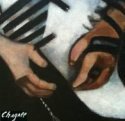
11.06.19 (Cheshvan 8, 5780) The word "Hebrew" means "boundary crosser," though the word "Jew" means one who praises the LORD (יְהוּדָה). The word "Jew" (יְהוּדִי) comes from a root (יָדָה) which means to "thank" or to "praise" (Gen. 29:35). The Apostle Paul alluded to this by saying that one whose heart has been circumcised by the Spirit is "one who is praised by God -- not by men" (Rom. 2:29). Being a Jew therefore means you are "chosen" to receive blessings and grace to live in holiness for the glory of God and for the healing of the world. The performance of various commandments are for the greater purpose of tikkun olam, the "repair of the world," in order to reveal God's goodness and love (Eph. 2:8-10). Doing so makes someone a Jew, since his praise comes not from man, but from the LORD. God is the source and the power of what makes a true tzaddik (righteous person). After all, Israel was meant to be a "light to the nations" (Isa. 42:6; 60:3), and God had always planned for all the families of the earth to come to know Him and give Him glory through his chosen servant Abraham (Gen. 12:3; 22:18). "Jewishness" is therefore not an end in itself but rather a means to bring healing to the nations... Indeed, the entire redemptive story of the Scriptures centers on the cosmic conflict to deliver humanity from the "curse" by means of the "Seed of the woman" who would come. The gospel is Jewish because it concerns God's great redemptive plan for the whole world (John 3:16; 4:22).
Note: For more on this see "The Father of all who Believe."
Meeting at Moriah...
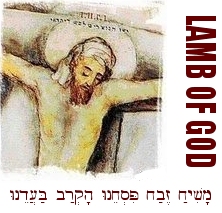
[ The following entry is related to this week's Torah reading, parashat Lekh-Lekha.... ]
11.06.19 (Cheshvan 8, 5780) The sages note that the phrase "lekh-lekha" (לֶךְ־לְךָ) is used in two places in the Torah: first, when God asked Abraham to leave everything behind to go (lekh-lekha) to a land where he would become a great nation that would ultimately bless the world (Gen. 12:1-3); and second, when God later asked Abraham to go (lekh-lekha) to the land of Moriah to offer up his beloved son as a burnt offering sacrifice (Gen. 22:2). There is a connection. In the first case note that after Abraham left his homeland God led him to land of Canaan, directly to a "teaching tree" (אֵלוֹן מוֹרֶה) in Shechem (see Gen. 12:6). Some have said this "teaching tree" symbolizes the wisdom of Torah, the tree of life (עֵץ־הַחַיִּים) that brings happiness to those who take hold of it (Prov. 3:18), though it also symbolizes the cross of Yeshua, as we shall see. In the second case note that "Moriah" (מֹּרִיָּה) means either the "Awe of the LORD" (i.e., מוֹרָא + יָהּ), the "Vision of the LORD" (i.e., רָאָה + יָהּ), or the "Teaching of the LORD" (i.e., מוֹרֶה + יָהּ) regarding the cross, or "the tree of atonement" (עֵץ־הַכַּפָּרָה), given in Yeshua our Messiah (the site of the Temple in Jerusalem was also called Moriah; see 2 Chron. 3:1). The Akedah, or the offering of Isaac, exemplified the meaning of sacrificial love, and indeed the word "love" (i.e., ahavah: אַהֲבָה) is first used in the Torah in this connection (Gen. 22:2). The offering of the lamb that God provided in exchange of Isaac (Gen. 22:13) pictures Yeshua the Passover Lamb of God (שֵׂה הָאֱלֹהִים) who was offered by the Father for the healing and deliverance of the world. And just as Isaac pictured the surrender of the son to the will of his father, so Abraham's willingness to give up his beloved son (בְּנוֹ יְחִידוֹ) reveals the passion of the Father's heart to give up everything for the sake of our salvation (John 3:16). So "lekh-lekha" - go for yourself - and receive the love of God given in Yeshua!
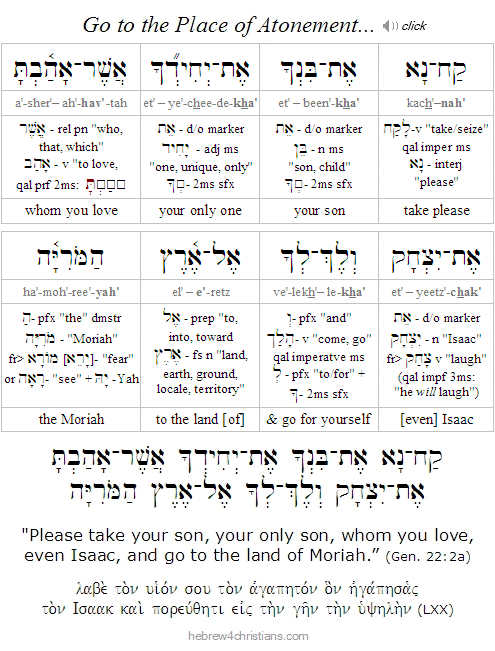 |
The Name El Shaddai...

[ The following entry is related to this week's Torah reading, parashat Lekh-Lekha.... ]
11.06.19 (Cheshvan 8, 5780) When Abram was ninety-nine years old the LORD appeared to him and said, "I am El Shaddai (אֲנִי־אֵל שַׁדַּי); walk before me, and be made whole" (Gen. 17:1). Since the compound name "El Shaddai" depicts the image of a nursing mother (i.e., the word shadayim (שדיים) means "breasts," symbolizing sufficiency and nourishment, e.g., Gen. 49:25), perhaps this revelation was meant to remind Abram and Sarai that the LORD would be the Womb, the Sustenance, and the Substance of the coming promised Seed. Only God can bring life out of death - even life from the deadness of Sarai's womb (see Rom. 4:19). For this reason, both Sarai and Abram were renamed by adding the letter Hey (ה) to their original names, symbolizing the Holy Spirit of God. The promised Seed was to be born miraculously, not unlike the virgin birth of the Messiah reported in the Gospels (i.e., just as Sarai was "without a womb" yet enabled to bear the promised seed (of Isaac), so was Mary, a virgin who was enabled to bear God's promised Seed - the Messiah).
אֲנִי־אֵל שַׁדַּי
הִתְהַלֵּךְ לְפָנַי וֶהְיֵה תָמִים
a·nee · El · sha·dai
heet·ha·leikh · le·fa·nai · ye·he·yeh · ta·mim

"I am El Shaddai:
walk before Me and be wholehearted." (Gen. 17:1)

In connection with the name El Shaddai (אֵל שַׁדַּי), we note that Abraham has more identifiable descendants than any other person in history... From the line of Isaac would come the twelve tribes of the Jewish people (as well as all those Gentiles who have been grafted into the covenantal blessings of Israel, i.e., the "church"), and from Ishmael would come the twelve tribes of the Ishmaelite people. Abraham also later married Keturah who bore him six more sons that became founders of six other nations of the Arab world, including the Midianites. To signify Abram's status, God changed his name from Avram ("exalted father" [from אָב, "father," + רָם, "exalted"]) to Avraham ("father of a multitude," a homonymic wordplay from אָב, "father" + המוֹן, "crowd"). Notice that some regard Avraham's name to mean "father of mercy" (from אָב, "father" + רחם, "womb").
Note: Most English translations render El Shaddai as "God Almighty," probably because the translators of the Septuagint (i.e., the ancient Greek translation of the Torah) thought that shaddai came from a root verb (shadad: שָׁדַד) that meant "to overpower" or "to destroy." The Latin Vulgate likewise translated shaddai as "Omnipotens," from which we get our English word "omnipotent." or "all-powerful." In other words, the translators regarded this term to suggest that God is so overpowering that He is considered "Almighty." For more on this topic, please see "God as El Shaddai."
Seek First the Kingdom...

11.06.19 (Cheshvan 8, 5780) Concerning our Torah portion this week (i.e., Lekh-Lekha) the sages comment that the word lekh (לֶךְ) can be understood to mean "proceed," as from the starting point of a journey. Spiritually understood, lekh-lekha implies "forgetting the things that are behind and reaching out for the things that are ahead … pursuing the reward of the upward call of God in Yeshua the Messiah" (Phil. 3:13-14). Therefore "go out for yourself (לֶךְ־לְךָ) -- from your land, your kindred, and your father's house" to discover your inheritance in the "land where the LORD will show you" (Gen. 12:1). As Yeshua counseled us: seek first the kingdom of God and His righteousness (Matt. 6:33). Amen, as followers of Messiah we have obtained a heavenly inheritance: "If then you have been raised with the Messiah, seek the things that are above, where Messiah is seated at the right hand of God. Set your minds on things that are above, not on things that are on earth" (Col. 3:1-2).
"By faith Abraham obeyed when he was called to go out to a place that he was to receive as an inheritance. And he went out, not knowing where he was going (καὶ ἐξῆλθεν μὴ ἐπιστάμενος ποῦ ἔρχεται). By faith he went to live in the land of promise, as an outsider (ὡς ἀλλοτρίαν), living in tents with Isaac and Jacob, heirs with him of the same promise. For he was looking forward to the city that has firm foundations, whose Architect and Builder is God." (Heb. 11:8-10)
Sanctified by Grace...
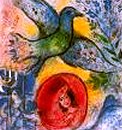
11.05.19 (Cheshvan 7, 5780) Yeshua said: "I am the vine; you are the branches. Whoever lives in me and I in him, he it is that bears much fruit, for apart from me you can do nothing" (John 15:5). We cannot create the new birth by means of moral reformation, since the divine life is a miracle from above and not the result of human agency or aspiration (John 1:13; John 3:6). If we "live in" Yeshua we will bear fruit - our spiritual connection or "union" with him is sufficient for every good work, but only fruit that derives from the life of Messiah will abide (1 John 2:17). Good works are a necessary consequence of regeneration in Messiah, but by themselves they are insufficient and something more is needed (Matt. 7:21-23). Therefore the Scriptures point to the salvation of God and his grace as the efficient cause for the miracle of newness of life: "Not by works of righteousness which we have done, but according to his mercy he saved us..." (Titus 3:5); "for by grace are you saved through faith, and that not of yourselves (τοῦτο οὐκ ἐξ ὑμῶν), it is the gift of God" (Eph. 2:8); "so if it is by grace, it is no longer on the basis of works; otherwise grace would no longer be grace" (Rom. 11:6).
Grace and human effort are mutually exclusive when it comes to life from above: "It is the Spirit that gives life (τὸ πνεῦμά ἐστιν τὸ ζῳοποιοῦν); the flesh (i.e., human nature) is no help at all" (John 6:63). There is a new "center" of identity within the heart: "I is no longer I who live..." (Gal. 2:19-20). We do not appeal to God for mercy based on our best efforts, but like father Abraham we believe that God brings life to the dead. In short we believe that "salvation is of the LORD" (יְשׁוּעָתָה לַיהוָה), that is, that God justifies the ungodly and performs the inner work of salvation on our behalf and for our healing (see Rom. 4:1-5:2). As C.S. Lewis once said in this connection: "The Christian is in a different position from other people who are trying to be good. They hope, by being good, to please God if there is one; or -- if they think there is not -- at least they hope to deserve approval from good men. But the Christian thinks any good he does comes from the Christ-life inside him. He does not think God will love us because we are good, but that God will make us good because He loves us; just as the roof of a greenhouse does not attract the sun because it is bright, but becomes bright because the sun shines on it" (Mere Christianity). However we must not confuse cause and effect. The work of God is to believe in Yeshua (John 6:29) and we then learn to "work out" what God has "worked in" to our hearts by faith, as it says, "work out your own salvation with fear and trembling, for it is God who works in you, both to will and to work for his good pleasure" (Phil. 2:12-13). God who has performed a good work in you will "confirm you to the end blameless in the Day of our Messiah Yeshua" (1 Cor. 1:8; Jude 1:24-25).
יְהוָה תִּשְׁפּת שָׁלוֹם לָנוּ
כִּי גַּם כָּל־מַעֲשֵׂינוּ פָּעַלְתָּ לָּנוּ
Adonai · teesh·poht · sha·lohm · la·noo
kee · gahm · kohl · ma·a·sei·noo · pa·al·ta · la·noo

"O LORD, you will ordain peace for us,
for you have indeed done for us all our works."
Hebrew Study Card

The Original Priesthood...

[ The following entry is related to this week's Torah reading, parashat Lekh-Lekha.... ]
11.05.19 (Cheshvan 7, 5780) The Torah of Moses reveals that the very first "priest" (i.e., kohen: כּהֵן) was neither a Jew nor a Levite nor a descendant of Aaron, but rather Someone who is said to have "neither beginning of days nor end of life" but is made like (ἀφωμοιωμένος) the Son of God, a priest continually (Heb. 7:3). This priest, of course, was Malki-Tzedek (מַלְכִּי־צֶדֶק), the King of Salem (מֶלֶךְ שָׁלֵם) to whom Abraham offered tithes after his victory over the kings (Gen. 14:18). The author of the Book of Hebrews makes the point that the priesthood of Malki-Tzedek is greater than the Levitical priesthood and is therefore superior to the rites and services of the Tabernacle (Heb. 7:9-11). It was to Malki-Tzedek that Abram (and by extension, the Levitical system instituted by his descendant Moses) gave tithes and homage -- and rightly so, since Yeshua is the great High Priest of the better covenant based on better promises (Heb. 8:6).
For more on this subject, see the article, "Exploring the Identity of Malki-Tzedek."
Lamentation and Loneliness...

11.05.19 (Cheshvan 7, 5780) Ah Lord, you have given me an incurable wound, a pain that refuses to leave my heart; for mi li va'shamayim? "Whom have I in heaven but you?" And there is nothing on earth that I desire besides you" (Psalm 73:25). I whisper to Thy heart, "You are my Lord; I have no good apart from you," and yet I am bound in this place of lonely exile, pining away in grief... My heart cries, ad-anah Adonai, "How long, O Lord, forever?" Nevertheless I affirm: "My flesh and my heart may fail, but God is the strength of my heart and my portion forever." There is nothing I seek apart from your "with me" Presence, O beloved Savior; therefore be true to your love and bear my way through these hours...
מִי־לִי בַשָּׁמָיִם
וְעִמְּךָ לא־חָפַצְתִּי בָאָרֶץ
mee · lee · va·sha·ma·yeem
ve·ee·me·kha · loh · cha·fatz·tee · va·ah·retz

"Whom have I in heaven but you?
And there is nothing on earth that I desire besides you."
(Psalm 73:25)


The Berditchever rebbe was asked if his ongoing debate with heaven - protesting that God was not dealing correctly with his people - was a sin of lashon hara (evil speech), to which he replied that the spies slandered God when they said, "We are not able to go up against this people, for they are stronger than us (Num. 13:31), yet his burden was rather, ad-anah Adonai, "How long, O Lord, will you forget us, forever?" (Psalm 13:1), and, "You who put the LORD in remembrance, take no rest, and give him no rest until he establishes Jerusalem and makes it a praise in the earth" (Isa. 62:6-7).
"For we know that the whole creation groans (συστενάζει) and suffers together until now. Not only this, but we ourselves also, who have the firstfruits of the Spirit, groan inwardly as we eagerly await our adoption, the redemption of our bodies. For in this hope we were saved" (Rom. 8:22-24).
Heart of Righteousness...
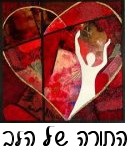
11.05.19 (Cheshvan 7, 5780) From our Torah reading for this week (Lekh-Lekha) we learn about the resolute faith of Abram who, despite his old age, trusted that God would make his descendants as numerous as the stars in the night sky: "And the LORD brought him outside and said, "Look toward heaven and count the stars, if you are able to number them." Then the LORD said to him, "So shall your offspring be. And he trusted in the LORD, and He reckoned it to him for righteousness" (Gen. 15:6). Abram "staggered not" at the promise of God, and therefore God imputed to him righteousness (צְדָקָה), a term understood here to be divine esteem and grace. After all, what could Abram do in the face of seeming impossibility? There was nothing he could do to bring about the miracle. The New Testament comments: "He did not weaken in faith when he considered his own body, which was as good as dead (since he was about a hundred years old), or when he considered the barrenness of Sarah's womb" (Rom. 4:19). It was in a state of utter powerlessness and complete helplessness that Abram retained hope and thereby received the promise by faith. "For he was beyond hope, yet in hope he trusted that he would indeed become a father to many nations, in keeping with what he had been promised, 'so shall your offspring be'" (Rom. 4:18).
Understand that 400 years before the law was given at Sinai, the LORD regarded the faith of Abram as the heart of the righteousness later prescribed by the Torah. Therefore the very First Commandment of the Decalogue is simply: Anochi Adonai Elohekha (אָנכִי יְהוָה אֱלהֶיךָ): "I AM the LORD your God" (Exod. 20:2), which repeats the call to trust God before everything else, since it is complete surrender to the love and grace of God that justifies us, as it is written: "to the one who does not work but trusts in the One who justifies the ungodly (i.e. the helpless), his faith is counted as righteousness" (Rom. 4:5).
Where the LORD says "Look toward heaven and count the stars, if you are able to number them," we note the Hebrew word "count" (סָפַר) may also mean "recount," "interpret," or explain... This is the same word used in the famous verse, "The heavens declare (מְסַפְּרִים) the glory of God" (Psalm 19:1). The idea here would be not merely that Abram would have lots of descendants, but they would shine in brilliance against the backdrop of the darkness. Abram's children would be lights upon the earth, declaring the truth of God and enlightening the darkness of mankind. "And those who are wise shall shine like the brightness of the sky above; and those who turn many to righteousness, like the stars forever and ever" (Dan. 12:3). In the same way, "let your light shine before others, so that they may see your good works and give glory to your Father who is in heaven" (Matt. 5:16; 13:43).
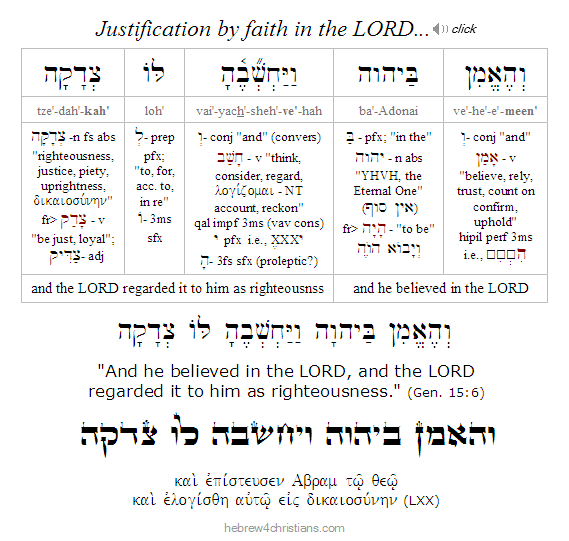 |
The Hidden Palace...

[ The following entry is related to this week's Torah reading, parashat Lekh-Lekha.... ]
11.05.19 (Cheshvan 7, 5780) The midrash says Abraham first encountered God by contemplating nature, likening it to a brilliantly lit palace that must have an owner. As he considered nature's wonder, a voice called out saying, "I am the owner of this palace..." The sages discuss the various preoccupations that commonly distract us from similarly detecting God's presence in nature for ourselves. Rabbi Shlomo asked, "God's greatness is inestimable; the entire cosmos is but a mustard seed when compared to him. How can so small a world block out so tremendous a God?" When we seek the truth of God, the eyes of faith will detect the "hidden palace," and everything around us will seem miraculous.
קָדוֹשׁ קָדוֹשׁ קָדוֹשׁ יהוה צְבָאוֹת
מְלא כָל־הָאָרֶץ כְּבוֹדוֹ
ka·dohsh ka·dohsh ka·dohsh Adonai tze·va·oht
me·loh khol-ha·ah·retz ke·voh·doh

"Holy, holy, holy is the LORD of hosts;
the whole earth is full of his glory!"
(Isa. 6:3)
Download Study Card

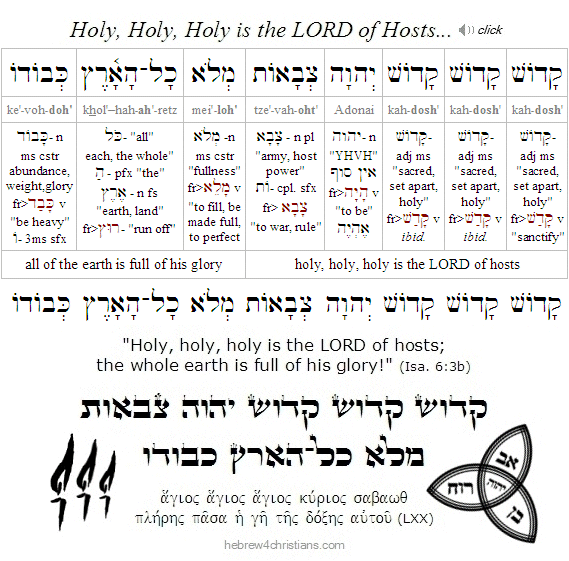
"For his invisible attributes (τὰ γὰρ ἀόρατα αὐτοῦ), namely, his eternal power and divine nature, have been clearly perceived, ever since the creation of the world, in the things that have been made..." (Rom. 1:20). "For by him (King Messiah) all things were created, in heaven and on earth, visible and invisible, whether thrones or dominions or rulers or authorities -- all things were created through him and for him" (Col. 1:16). "To the King of the ages, immortal, invisible, the only God ( μόνῳ σοφῷ θεῷ), be honor and glory forever and ever" (1 Tim. 1:17). "He (Moses) endured as seeing him who is invisible" (Heb. 11:27). "We look not to the things that are seen but to the things that are unseen. For the things that are seen are transient, but the things that are unseen are eternal (2 Cor. 4:18).
Moses "endured as seeing Him who is invisible." It is this "as seeing Him" that is the essence of faith -- seeing God's hand and presence through the throes of temptation, stormy clouds, pain, and darkness. Faith never gives the last word to despair....
The Meaning of "Hebrew"

11.04.19 (Cheshvan 6, 5780) In parashat Lekh Lekha Abram is called ha-ivri (הָעִבְרִי) - "the Hebrew," a term that means "one who has crossed over" (עָבַר) from another place (Gen. 14:13). The notable commentator Rashi identifies this "other place" as Ur of the Chaldees (אוּר כַּשְׂדִים), located east of the Euphrates River, though the midrash (Genesis Rabbah) symbolically identifies it as the realm of idolatry: "The whole world stood on one side, but Abram crossed over to the other." Abram separated himself from a world steeped in idolatry and polytheism by worshiping the One LORD God who is the sole Creator of all things.... Understood in this way, being "Hebrew" means being regarded as an "other," a "stranger," or an "outsider" to idolatrous world culture. Similarly, all those who "cross over" from the realm of death to life because of Yeshua our Savior are rightly called "Hebrews" (John 5:24).
To Abram came to divine invitation: "Go forth ... I will show you" (Gen. 12:1). It was only after Abram made the long journey to the unknown land of Canaan that God appeared to him to him by the Oaks of Mamre saying, "To your offspring I will give this land" (Gen. 18:1). Abram did not believe the promise because he saw God; he was only able to see God after he had walked in faith. First Abram heard the message, and later - after he acted on his faith - was he enabled to see more. This is the deeper meaning of being "Hebrew," one who crosses over from the realm of the dead to the realm of the Living God...
Therefore we note that hearing (shema) is more important than simply seeing... When we hear the truth and accept it into our understanding, it informs our perceptions, not the other way around. Truth is something revealed to the heart first, and only later to the senses.
Crossing Over to Life...

[ The following is related to this week's Torah reading, parashat Lekh-Lekha... ]
11.04.19 (Cheshvan 6, 5780) Our Torah portion this week begins: "Now the LORD said to Abram, "Go (לֶךְ־לְךָ) from your country and your kindred and your father's house to the land I will show you" (Gen. 12:1). The Book of Hebrews comments, "By faith Abraham obeyed when he was called to go out to a place that he was to receive as an inheritance, and he went out, καὶ ἐξῆλθεν μὴ ἐπιστάμενος ποῦ ἔρχεται - "not knowing where he was going" ... for he was looking forward to the city that has foundations, whose designer and builder is God" (Heb. 11:8,10). Abraham closed his eyes to this world and was given the inner light of truth that would reveal his way to God. The Sefat Emet says that every person of faith is likewise commanded daily to "lekh-lekha," to "go for yourself" by crossing over from the world and its deadening habits to live as an exile with God. Paradoxically, we find ourselves when we lose ourselves - when we leave behind the labels, roles, and identities this world foists upon us and instead resolve to seek the promise of God's Kingdom. As Yeshua said, "For whoever would save his life will lose it, but whoever loses his life for my sake will find it" (Matt. 16:25).
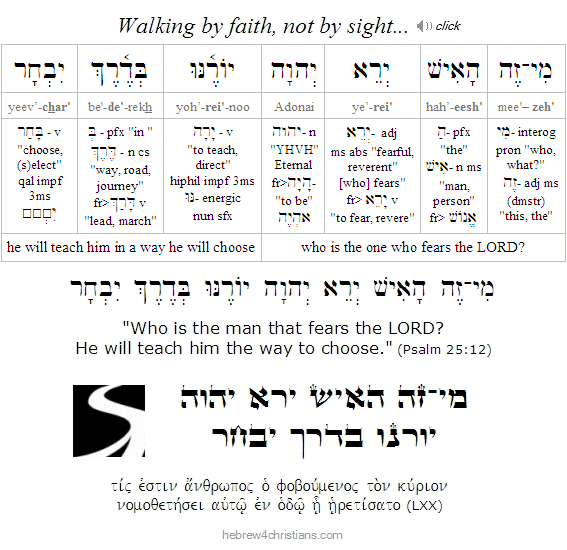 |
Note: In a sefer Torah (i.e., a handwritten Torah scroll), Hebrew words are written without vowels, so "lekh lekha" (לך־לך), often translated as "go forth," could be read as "go, go!" - emphasizing the importance of the mitzvah: Get moving! Start walking! Begin your journey!
He Gives Greater Grace...
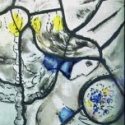
11.03.19 (Cheshvan 5, 5780) "For though the LORD is exalted, He regards the lowly, but the haughty He knows from afar" (Psalm 138:6). Yea, God opposes the proud but gives grace to the humble (James 4:6). And who are the humble but those keenly aware of their own nothingness - the despised, the needy, and the rejected of men? The LORD justifies the ungodly by faith; He hears their cry for deliverance "from the depths"; he creates them anew yesh me'ayin, "out of nothingness," by making them into a "new creation" (בְּרִיאָה חֲדָשָׁה) through the agency and power of the Holy Spirit (Rom. 4:5; 5:6; 2 Cor. 5:17; Rom. 4:17). O praise Adonai Oseinu, the LORD God our Maker, for he looks upon the lowly, he is near to nishberei lev, the brokenhearted, and he binds up their wounds... Amen.
כִּי־רָם יְהוָה וְשָׁפָל יִרְאֶה
וְגָבהַּ מִמֶּרְחָק יְיֵדָע
kee · rahm · Adonai · ve·sha·fahl · yeer·eh
ve·gah·voh·ah · mee·mer·chak · ye·ei·dah

"For though the LORD is exalted, He regards the lowly,
but the haughty He knows from afar."
(Psalm 138:6)
Hebrew Study Card

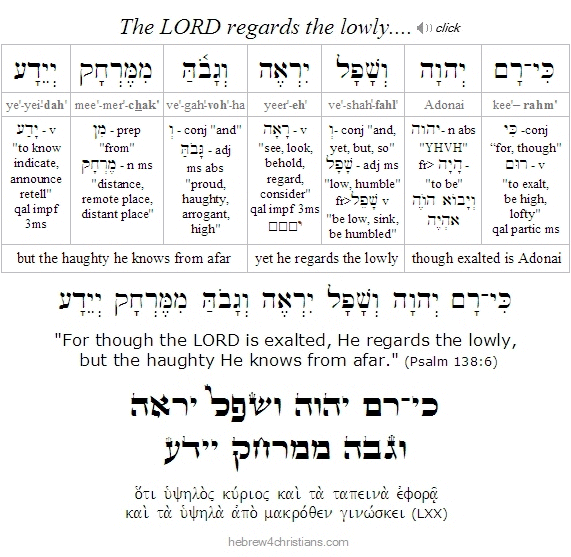
Again, just as the LORD made the world yesh me'ayin, "out of nothing," so His creative power continues unchanged. God is able to take a dead heart, a heart of stone, and make it tender and soft through the breath of His Spirit... Therefore His eyes look upon the lowly, the humble, the poor in spirit, but He disregards those who lift themselves up in pride.
Indeed, the LORD resists the proud and repays their scorn with scorn: "With the scorners he is scornful, but to the lowly he gives grace" (Prov. 3:34). Those who mock the idea of sin and arrogantly exalt themselves will be held in derision, but of those who find grace it is written, "Blessed is the man who walks not in the counsel of the wicked, nor stands in the way of sinners, nor sits in the seat of scoffers, but his delight is in the Torah of the LORD, and in His Torah he meditates day and night" (Psalm 1:1-2). Indeed it is a severe mercy, a weighty grace, that is bestowed to us, friends...
Personal Note: In addition to the various and usual challenges of working hard to provide this service every day, I have been sorely afflicted the last few weeks with health-related issues, and therefore I ask for your prayers so that I can continue. Thank you so much. - John
Parashat Lekh-Lekha (with new audio)...

11.03.19 (Cheshvan 5, 5780) Shavuah tov, chaverim! Last week's Torah portion (i.e., parashat Noach) introduced us to Abram (אַבְרָם), the descendant of Noah's son Shem, who was the great-grandson of the patriarch Methuselah - a man who who personally knew Adam and Eve and upheld the original promise of redemption given in the Garden of Eden. Just as there were ten generations from Adam to Noah, so there were also ten generations from Noah to Abram (see Gen. 11:10-32). And just as Noah became the father of 70 nations, so Abram (through Shem) would become the father of the Jewish people, through whom the Promised Seed - the Messiah and Savior of the world - would eventually come.
In our Torah portion for this week (Lekh-Lekha), we read that Abram was 75 years old, married to (his half-sister) Sarai, and guardian of his nephew Lot (his deceased brother Haran's son) when he received the promise of divine inheritance: "And the LORD said to Abram, "Go from (i.e., lekh-lekha: לך־לך) your country and your kindred and your father's house to the land that I will show you. In Hebrew, the phrase lekh lekha means "go for yourself" (lit. "walk [הָלַךְ] for yourself [לְךָ]"), though it can be interpreted it to mean "go to yourself," that is, "look within yourself" in order to begin walking out your own journey into the promises. The realm of divine promise is only attained when we venture out in faith. Like our father Abraham, we are called to "cross over," leave everything behind, and take hold of God's glorious promise for our lives.
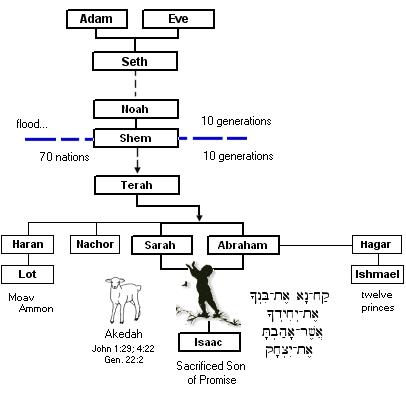 |
The Greatness of Noah...
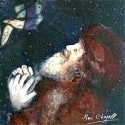
[ The following entry concerns this week's Torah reading, parashat Noach... ]
11.01.19 (Cheshvan 3, 5780) Despite the fact that Torah plainly describes Noach as אִישׁ צַדִּיק / ish tzaddik: "a righteous man," "blameless in his generation" (תָּמִים הָיָה בְּדרתָיו), and a man who "walked with God" (אֶת־הָאֱלהִים הִתְהַלֶּךְ־נחַ), Jewish tradition takes a somewhat ambiguous view of him, especially when he's compared to Abraham, the father of the Jewish people... In the Midrash Tanchuma (מדרש תנחומא), for example, it is said that Noach was righteous in his generation -- though he would not be so regarded in other generations. In other words, Noah was "relatively righteous" compared to the world at large, at least according to sages like Rashi, Maimonides, etc. However such an assessment is surely unfair, lashon ha'ra, and even chillul HaShem. After all, is not Noah perhaps one of the greatest examples of a person of faith given in the Torah? He was a descendant of the godly line of Seth who lived in a world filled with rampant and unbridled wickedness (Gen. 6:5), and yet he found grace in the eyes of the LORD (מָצָא חֵן בְּעֵינֵי יְהוָה) because of his faith as he walked with God (Gen. 6:8-9). Indeed the very first time the word "grace" (חֵן) appears in the Torah concerns Noah: "Noah found grace in the eyes of the LORD" -- a phrase later ascribed to Moses himself (Exod. 33:12,17). Moreover the New Testament affirms Noah's greatness as a tzaddik: "By faith Noah, when he was warned about things not yet seen, with reverent regard constructed an ark for the deliverance of his family. Through faith he condemned the world and became an heir of the righteousness that comes by faith" (Heb. 11:7). Noah was a "preacher of righteousness" (δικαιοσύνης κήρυκα) who faithfully completed the incredible task of constructing an enormous ark (תֵּבָה) to deliver life from God's judgment (2 Pet. 2:5).
Now an "ark" is not a ship that has a rudder but a box-shaped vessel simply designed to rise above the deluge of the flood (מַבּוּל) to be carried by God's providence. Spiritually understood, then, an "ark" represents a vessel completely surrendered to God's care, and the "Torah of the Ark" (תּוֹרַת הַתֵּבָה) teaches that we must cast ourselves upon the waters of the Father's great mercy (אֲבִי הָרַחֲמִים) and completely trust that He will guide our passage through the storms of this life (1 Pet. 5:7). Noah trusted in the unseen love and care of his Heavenly Father, despite circumstances that were utterly dreadful... Like all the other tzaddikim, Noah "walked by faith, not by sight" (2 Cor. 5:7) while looking forward to a "new heavens and earth" (2 Pet. 3:11-15). Yes, father Abraham was a marvelous tzaddik who was greatly tested when he offered his beloved son of promise, trusting in the LORD's heart and good will to rectify all things, but we should not underestimate the greatness of Noah's faith, as he labored for over 100 years building the ark without any physical evidence that a cataclysm would come. Moreover, it would do well for the rabbis to celebrate Noah's example and to remember that Abraham himself owes his life to Noah's obedience of faith, since Abraham is a direct descendant from Noah through his son Shem (Gen. 11:10-32).
The story of Noah reminds us that the great Day of the Lord (יוֹם־יְהוָה הַגָּדוֹל) will surely come (2 Pet. 3:10) and indeed is drawing near (Zeph. 1:14). Yeshua himself forewarned that the spiritual condition of the world would be one of anarchy and moral chaos, wherein the wickedness of humanity would be great, and that "every design of the thoughts of people's minds would be full of evil continually" (Gen. 6:5). As in the days of Noah, in the midst of worldwide corruption, our Messiah will return in final judgment (Matt. 24:37-38; Luke 17:26-27).
For more information about this topic, see the article "Noah and Jewish Tradition."
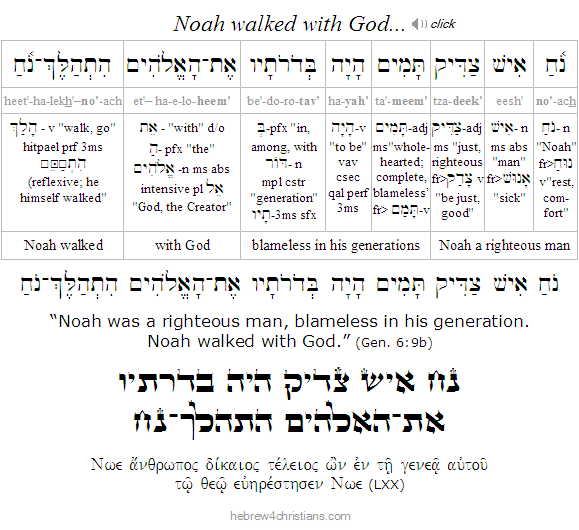 |
Abiding in Him...

11.01.19 (Cheshvan 3, 5780) Yeshua used the allegory of a vine and its branches to illustrate how we are to be spiritually connected to Him: "I am the true Vine, and you are the branches," he said (John 15:1-6). The purpose of the branch is to be a conduit of the life of the vine. We derive our identity, life and strength from being made part of Yeshua's life, His vision, and His purposes... In Hebrew, this idea is called devakut (דְּבָקוּת) which means "cleaving" to God bekhol-levavkha (בְּכָל־לְבָבְךָ), "with all your heart," and bekhol-nafshekha (בְּכָל־נַפְשְׁךָ), "with all your soul," and bekhol-me'odekha (בְּכָל־מְאדֶךָ), "with all your being..." Cleaving to God is the essence of the great commandment to love the Lord given in the Shema. We are able to so cleave to God in Yeshua because God does a miracle and gives us lev chadash, a new heart to serve Him. We love Him because He first loved us (1 John 4:19). Whether Yeshua is living in you (and you are living in Him) is the most important question of your life upon which everything else ultimately depends. He appeals to each heart of faith: "Live in me, and I will live in you" (John 15:4). Shabbat Shalom friends...
For more see the article: "The Torah of the Vine: Living the Divine Connection..."
Ultimate Concerns...

11.01.19 (Cheshvan 3, 5780) Blaise Pascal wrote that faith in Yeshua is essentially a confession of irreparable human infirmity, and therefore its message is always directly there - to the place of our pain and desperation. Consequently it has no voice or message to mere triflers - to those who might patronize it as philosophically interesting, morally edifying, poetically beautiful, politically useful, and so on. No, no, never: the Spirit speaks to the heart in its anguish, in its lament over the suffering and agony of life in this world, and there breathes out the haunting question, "Do you want to be healed?"
עָקב הַלֵּב מִכּל וְאָנֻשׁ הוּא
מִי יֵדָעֶנּוּ
a·kohv · ha·leiv · mee·kohl · ve·a·noosh · hoo
mee · ye·da·ei·noo

"The heart is deceitful above all things, and incurably sick;
who can understand it?"
(Jer. 17:9)

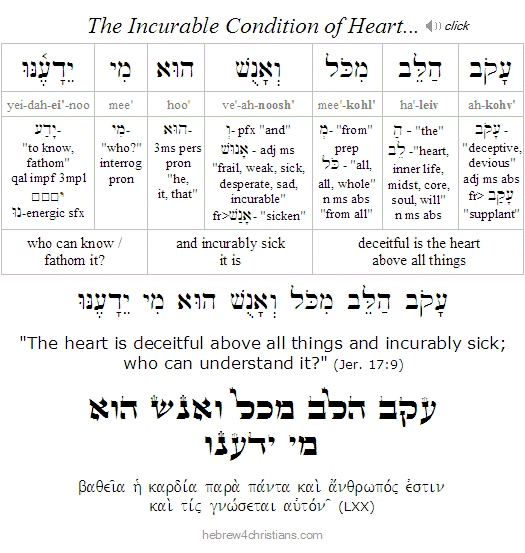
Though our faith can be expressed in "theological" terms, it remains first of all a message to the individual in existential distress, shouting the way of escape to those on the edge of the everlasting abyss... The language of genuine teshuvah is one of ultimate concern, a message that appeals to matters of life and death itself.
"A life of a human being begins with the illusion that a long, long time and a whole world lie before him in the distance, begins with the foolhardy delusion that he has such ample time for his many claims. The poet is the eloquent and enthusiastic confidant of this foolhardy but beautiful delusion. But when a person in the infinite transformation discovers the eternal itself so close to life that there is not the distance of one single claim, of one single evasion, of one single excuse, of one single moment of time from what he in this instant, in this second, in this holy moment shall do - then he is on the way..." (Kierkegaard: Works of Love)
His Overcoming Light...

11.01.19 (Cheshvan 3, 5780) There is a lot of engineered fear "in the air," and the enemy of our souls seeks first of all to lead us into a place of exile, worry, and pain. We are able to resist him by submitting to the truth about the divine reality (James 4:7). God's Name YHVH (יהוה) means "Presence" and "Love," and there is no power in heaven or earth that can overrule His hand. Therefore even if the prophesied "End of Days" were to begin this very hour, our responsibility is to focus on the Divine Presence and to walk in His truth and love. As King David (דוד המלך) said, "I have set the LORD always before me; because He is at my right hand, I shall not be shaken" (Psalm 16:8).
שִׁוִּיתִי יְהוָה לְנֶגְדִּי תָמִיד
כִּי מִימִינִי בַּל־אֶמּוֹט
shee·vee·tee · Adonai · le·neg·dee · ta·meed
kee · mee·mee·nee · bal · e·moht

"I have set the LORD always before me;
because he is at my right hand, I shall not be shaken."
(Psalm 16:8)
Hebrew Study Card


The devil's strategy is as banal as it is tedious, namely, to entice us to forget the truth of God and to live in a state of virtual exile and pain. Therefore Shema - listen and remember - is the basic commandment. Since the LORD is the Center of all that is real, to become anxious is to "practice the absence" of God's presence instead of practicing His Presence. We have to remember the future, as well as the present and past....
There is a future time of healing and deliverance coming to us, though we must abide in the shadow of its substance for a bit longer: "For behold, the Day is coming (הַיּוֹם בָּא), burning like an oven, when all the arrogant and all evildoers will be stubble. The Day that is coming shall set them ablaze, says the LORD of hosts, so that it will leave them neither root nor branch. But for you who fear my Name, the Sun of Righteousness (שֶׁמֶשׁ צְדָקָה) shall rise with healing in its wings (מַרְפֵּא בִּכְנָפֶיהָ). You shall go out skipping like calves released from the stall. And you shall tread down the wicked, for they will be ashes under the soles of your feet, on the day when I act, says the LORD of hosts" (Mal. 4:1-3).
This awesome passage from the Book of Malachi primarily applies to the Second Coming of Yeshua and the great "Day of the LORD" (יוֹם יהוה). The "Sun of Righteousness," shemesh tzaddik (שֶׁמֶשׁ צְדָקָה), refers to Messiah son of David, the risen life-giving Healer of God. Of Him it is said, "The LORD God is a sun and a shield" (Psalm 84:11) and "the LORD shall be to thee an everlasting Light (אוֹר עוֹלָם), and thy God thy glory; thy sun shall no more go down, for the Lord shall be thine everlasting light" (Isa. 60:19-20). The Divine Light will shine on those who receive God's righteousness, that is, on those who trust in the One who said, אֲנִי אוֹר הָעוֹלָם - 'I am the Light of the world' (John 8:12). Shine Your Light upon us, O LORD!
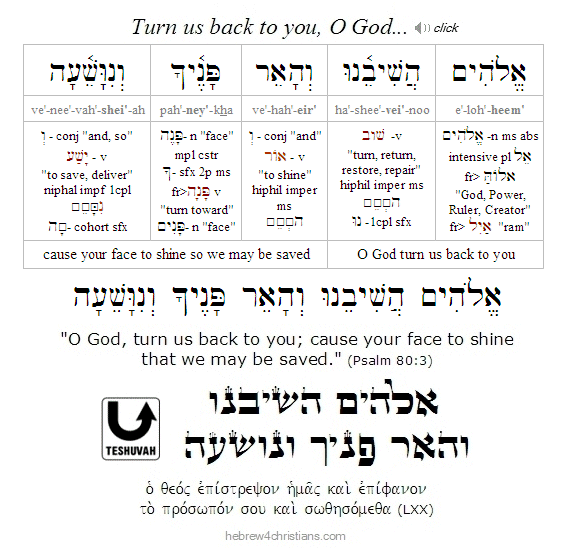 |
The sages say, "in the world to come (עוֹלָם הַבָּא), God will bring the sun out of its sheath to burn the wicked; they will be judged by it, but the righteous will be healed by it' (Shemot Rabbah). Yeshua is compared to the "Sun" (שֶׁמֶשׁ צְדָקָה) because as the Sun is the central luminous body of our world, so Yeshua is called the "Light of Life" (אוֹר הַחַיִּים). Yeshua is melech ha-kavod (מֶלֶךְ הַכָּבוֹד), "the King of Glory" -- and no one can stand before the blinding power of His countenance (Psalm 27:4; Rev. 1:8-19). His is the "Fountain of Light" for all of creation, the Source and End of all life: "For by Him all things were created, in heaven and on earth, visible and invisible, whether thrones or dominions or rulers or authorities -- all things were created through Him and for Him. And he is before all things, and in him all things hold together... that in everything He might be preeminent" (Col. 1:16-18). Yeshua will come "with healing in his wings" (מַרְפֵּא בִּכְנָפֶיהָ) -- that is, in healing radiance, with rays and beams, which metaphorically describe His influence over the hearts of men... Note that the word for "wings" used in this passage (i.e., kanaf: כָּנָף) pictures the image of a heavenly tallit (טַלִּית), or the heavenly firmament (רָקִיעַ) of the LORD's sheltering Presence.
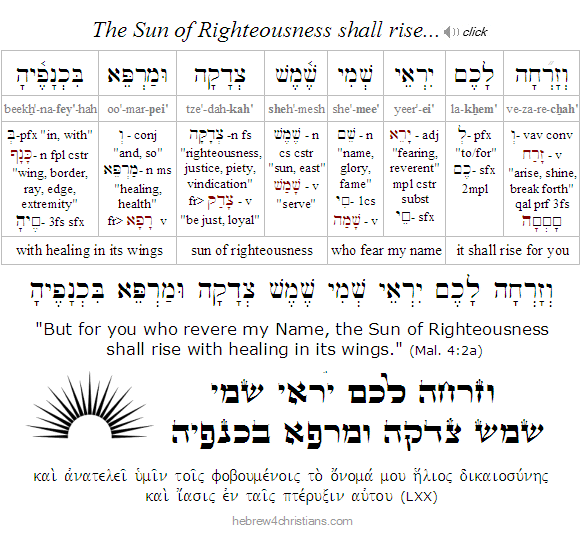 |
It is always God's will for you to to know His love and to walk in the power of His deliverance for your soul... Nothing can overturn His will or separate you from the Presence of His Love.
Broken and Remade...

11.01.19 (Cheshvan 3, 5780) "See to it that no one fails to obtain the grace of God; that no root of bitterness springs up and causes trouble, and by it many become defiled; that no one is immoral or profane like Esau, who sold his birthright for a single meal. For you know that afterward, when he desired to inherit the blessing, he was rejected, for he found no chance to repent, though he sought it (the blessing) with tears" (Heb. 12:15-17; Gen. 27:38). "For my people have committed two evils: they have forsaken Me, the fountain of living waters (מְקוֹר מַיִם חַיִּים), and hewed out cisterns for themselves, broken cisterns that can hold no water" (Jer. 2:13). Spiritually speaking, there are two basic sorts of breaking. One is to be broken by the inevitable sin and ruin of this world, and the other is to be made lev-nishbar (לֵב־נִשְׁבָּר), a broken heart, before the LORD. The former breaking comes from the vain attempt to find life in the broken vessels of this world, and "repentance" is expressed as remorse over perceived temporal loss. This sorrow eventually leads the soul to death (2 Cor. 7:10). To be inwardly broken, on the other hand, requires mourning over your life and returning to God for deliverance (Matt. 5:4). In hunger and thirst for God's righteousness the soul finds eternal satisfaction, since God alone provides the vessel of "living water" we need to live (John 4:14; 7:38). We all must drink from God's fountain of life (מְקוֹר חַיִּים), lest we suffer spiritual dehydration and death....
Are you haunted by an inner ache for love, joy, peace, and life? "Blessed are those who hunger and thirst for righteousness, for they shall be satisfied" (Matt. 5:6). Our inner poverty and need is a disguised grace; our desire for healing reveals the Spirit's invitation. Faith begins with the recognition of our need, since only then will we come to Yeshua for the "Bread of Life" (לֶחֶם הַחַיִּים) and the "Living Water" (מַיִם חַיִּים). Everything we need is found in him, though we must reach out in faith: "For without faith (אֱמוּנָה) it is impossible to please him, for whoever would draw near to God must believe that he exists, and that he rewards those who seek him" (Heb. 11:6). God rewards those who seek him; he answers the heart's cry; he responds to all who trust in his love and salvation. Therefore "ask, and it will be given to you; seek, and you will find; knock, and it will be opened to you. For everyone who asks receives, and the one who seeks finds, and to the one who knocks it will be opened" (Matt. 7:7-8). We are not saved by faith in our own faith, but in the Reality and Power of the LORD God who alone can raise the dead to new life....
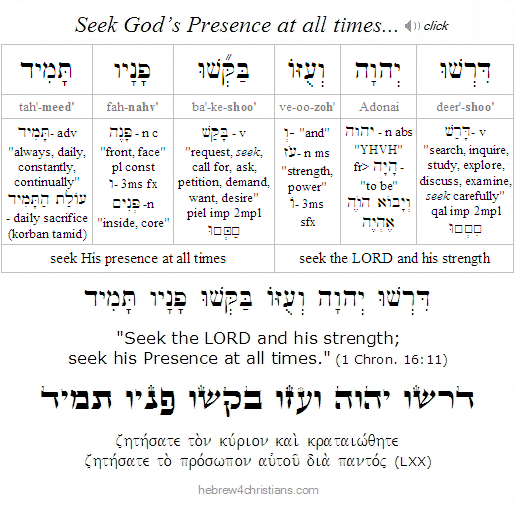 |
|




